Kyari
bill to Amend CbN Act Passes second reading at senate... Page 6
Cardoso: Apex bank has settled additional $400m verified FX backlogs
Says unidentified users accessed $26bn on Binance platform, insists bank has responsibility to protect consumers Declares market distortions undervalued naira, vows punishment for culprits
Increase in MPR hurtful to real sector operators MAN urges apex bank to adopt managed float exchange rate system
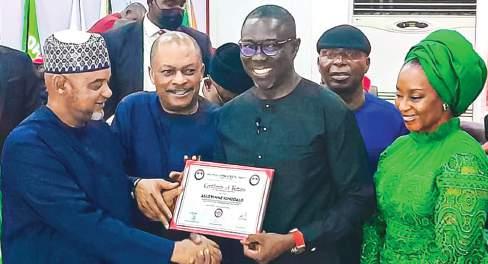

www.thisdaylive.com Wednesday 28 February, 2024 Vol 29. No 10549. Price: N400 TRUTH & REASON
says NNPC won’t block divesting IOCs Lokpobiri insists oil companies’ onshore exit not loss to Nigeria explained why he decided to withdraw subsidy on petrol, and maintained that although it was a difficult and challenging decision, it was necessary for Nigeria’s future and economic growth. Speaking at the opening session of the 7th edition of the Nigeria International Energy Summit (NIES) in Abuja, Tinubu stated that by removing the subsidy, he had created a more transparent and Continued on page 39 accountable energy sector. Tinubu: Decision to Remove Petrol Subsidy Challenging, But Necessary Emmanuel Addeh in Abuja President Bola Tinubu yesterday PrEsENtAtioN oF CErtiFiCAtE oF rEturN to ighodAlo As PdP gubEr FlAgbEArEr... L-R: Acting National Chairman of the Peoples Democratic Party (PDP), Amb. Umar Ililya Damagum; National Secretary of the PDP, Senator Sam Anyanwu; Governorship candidate of the PDP for the Edo State September 21, 2024 governorship election, Dr. Asue Ighodalo, and his wife, Mrs. Ifeyinwa Ighodalo, during the presentation of certificate of return to Ighodalo as flagbearer of the party at the PDP National Secretariat, Abuja, ... yesterday Story on page 40 PHOTO: GODwIN OMOIGUI Continued on page 39 Continued on page 5 (CBN) yesterday raised the Monetary Policy Rate (MPR), the benchmark interest rate, by 400 basis points to 22.75 per cent, from 18.75 per cent. The bank also adjusted the justice to the intention of the rallies. However, in a communique at the end of a National Executive Council In Unprecedented Offensive to Tame Inflation, CBN Raises MPR to 22.75% from 18.75%
troop
situation reports by our Correspondents After recording nationwide relative success at day one protest rallies against hunger in the country, the Nigeria Labour Congress (NLC), last night, suspended further street protest, earlier scheduled to continue today. But in spite of the subtle threat by the federal government and its effort to discourage the organised labour from going ahead with the plan, workers defied every hurdle in their way and trooped out en mass. This, nonetheless, President of the National Labour Congress (NLC), Joe Ajaero, has urged the federal government to urgently address hunger and economic hardship in the country. But a state-by-state situation report of the protest rallies proved a relative success overall, even though the turnout in some states did not do
After Relative Success at Day One of Nationwide Protests, NLC Suspends Rallies Workers defy clampdown threat,
out Ajaero: FG should tackle hunger, poverty State by state
CbN Approves
sale to bdCs to Curtail Price distortions at retail Market... Page 39
James Emejo in Abuja, Nume Ekeghe and dike onwuamaeze in Lagos
one of its most audacious responses to the ravaging inflation in the country, the Central Bank of Nigeria
FX
In

2 WEDNESDAY FEBRUARY 28, 2024 • THISDAY

WEDNESDAY FEBRUARY 28, 2024 • THISDAY 3

4 WEDNESDAY FEBRUARY 28, 2024 • THISDAY

NLC protests HArDsHIp AND INseCUrItY At NAtIoNAL AssembLY...
(NEC) meeting of NLC held in Abuja, yesterday, the congress said after reviewing the first of the protest, it decided to suspend street action for the second day of the protest.
This, it claimed, followed the success recorded at day one, and by extension, attained the key objectives of the second day protest on the first day.
The communique signed by Ajaero and the Acting General Secretary, Comrade Ismail Bello, expressed appreciation to the Nigerian workers and masses for sending a strong message to the powers-that-be on their united resolve to demand accountability from them.
The communique read: " The NEC-in-session therefore reviewed the execution of the first day of the nationwide protest to assess its effectiveness and take decision on further necessary action to guide Congress in its effort at engaging government to protect the people and Nigerian workers from the increasing scourge of hardship.
"To this end, NEC commended Nigerians, all NLC affiliates, state Councils, Workers and Civil Society Allies across the Nation for trooping out in large numbers to peacefully demonstrate their outrage on the hardship imposed by the government and its twin altars – the IMF and the World Bank.
"It believed that the message has strongly resonated. Consequently, NEC-in-session resolved as follows:
"To suspend street action for the second day of the Protest having achieved overwhelming success thus attained the key objectives of the 2-day protest on the first day.
"However, nationwide action continues tomorrow with simultaneous Press Conferences across all the states of the federation by the state Councils of the Congress including the National Headquarters.
"To reaffirm and extend the 7-days ultimatum by another 7 days, which now expires on the 13th day of March, 2024 within which the government is expected to implement all the earlier agreement of the 2nd day of October, 2023 and other demands presented in our letter during today’s nationwide protest.
"To meet and decide on further lines of action if on the expiration of the 14 days government refuses to comply with the demands as contained in the ultimatum.
“Once again, NEC recommits the NLC to continuing defending and promoting the interests and desires of Nigerian workers and the downtrodden masses."
But amid fears of likely crackdown by the authorities to try to prevent the national protest from happening, workers held the protest against biting hunger and food crisis.
The workers thronged the Labour House, headquarters of the apex labour centre in Abuja to begin the protest over high cost of living in
the country.
Thousands of workers besieged the Labour House as early as 7am chanting solidarity songs and displaying placards, urging the government to do something to arrest worsening hunger, inflation and to take effective measures to check insecurity.
The protesting workers carried placards with inscriptions such as:
"Tax the rich, subsidise the Poor", "Make our refineries work before removing subsidy", "Let the poor breathe" and "Pay us our 35k wage award", among others.
The labour movement is actualising its 14-Day ultimatum earlier issued for government to do something to check the food crisis and hunger in the land which it attributed to the sudden removal of fuel subsidy by the Federal government.
On Feb. 16, NLC at the end of its National Executive Council (NEC) meeting declared a two-day nationwide protest from Feb. 27 to Feb. 28, over the worsening economic hardship and insecurity in the country.
In response, the Department of State Services (DSS) had warned the NLC not to embarked on the planned protest for the fear that it would be hijacked by unscrupulous elements.
However, addressing journalists shortly before commencement of the rally, NLC president Joe Ajaero said workers were determined to protest the growing hardship and poor response by government to their plight.
When asked about the outcome of last night's meeting with the federal government's team, Ajaero said all the government intended to achieve with the meeting was to stop the protest by NLC.
"Yes we met late Sunday and also late Monday but all the agenda pushed by the government was to urge us not to protest today. Government said we should not protest and that some of us have a date with history today if we defy that plea to come out.
“The government used peaceful means and the used threats but we are in God's hands," he said, urging the federal government to urgently address hunger and economic hardship in the country.
His words: "We are here to tell the federal government that Nigerians are hungry. The rally is also to make Mr President to know how Nigerians feel. We are the ones who know where it is pinching us.
"We are also out to do a protest and to register before Nigerians and the international community the level of sufferings and that there is hunger in the land.
"We want to call on the federal government to immediately address the issue of hunger in the country. There is nobody that does not know that bag of rice is over N70, 000 or more, we cannot buy Indomie
and bread is out of the reach of ordinary Nigerians.
"With N30,000 minimum wage, if you eat a loaf of bread everyday, you will be spending over N40,000,'' he said, noting also that the International Labour Organization specified a minimum of two Dollars for feeding of each family member.
The FCT Defiant NLC, Pro-Govt Protesters Clash
The NLC made good its threat yesterday, commencing its initial two-day protest against the hardship in the country.
But as the NLC was protesting, pro-government protesters under the auspices of Network of Civil Society for Economic Sustainability also rallied support for the polices of President Bola Tinubu.
While the union commenced the procession from the Labour House, through the Ministry of Finance to federal secretariat and terminated at the National Assembly, the pro-government protesters took off from Unity Fountain to the federal secretariat and also ended up at the National Assembly.
Addressing journalists in Abuja, Convener of the group, Kabiru Matazu, said inasmuch they respected the right of the NLC to legitimately and freely exercise and express itself, they disagreed with them and their method.
He said while the reasons NLC was protesting including implementation of a new minimum wage, escalating hardship, insecurity, rising poverty, hyperinflation, and soaring prices of essential commodities, were genuine and demanded the attention of every citizen and stakeholder, protests were not and would never be a viable solution.
Matazu noted that Tinubu's administration has demonstrated commitment to address the challenges with the urgency they deserve.
The group, therefore, urged the NLC to engage in a constructive dialogue with the government instead of grounding economic activities, exacerbating the issues and further making life hard for the common man.
LaGos sTaTe Police share Biscuit, Water to Protesters
The Lagos State Police Force, yesterday, showed their human side as they shared free water and biscuits to protesters in a show of solidarity.
NLC members had stormed the streets of Lagos to express their grievances over the current economic hardship in the country, and also to protest against government’s alleged failure to implement agreements reached between both parties on October 2, 2023, following the removal of the fuel subsidy
But the policemen consciously calmed nerves were seen in a moving vehicle sharing water and biscuits to the protesters around the Alausa area of the state, as they chanted “Up Nigeria Police.”
The NLC members in their numbers, alongside other Nigerians, stormed the Ikeja under-bridge area of the state as early as 7am yesterday, and were seen singing and dancing while calling on the government to give listening ears to their demands.
The protesters were also seen carrying placards with inscriptions such as #End Hunger and Poverty Now! Stop the Looting! Tax the Rich, Subsidise the Poor, among others.
oGuN sTaTe
Protest Crucial Considering economic hardship
Amid security provided by men of the Nigeria Police, Nigeria Security and Civil Defence Corps (NSCDC) and officers of the Department of State Security (DSS), the NLC, in Ogun State, yesterday, joined the protest because it was critical to do so.
The NLC leadership and other workers, marched through some streets in Abeokuta carrying placards of various inscriptions lamenting the hardship in the country.
The NLC, said the protest became important considering the prevailing economic hardship currently ravaging Nigeria.
This hardship, they claimed, was occasioned by the removal of fuel subsidy and continuous fall of the naira against the dollar.
Speaking with journalists during the protest in Abeokuta, Chairman of Ogun NLC, Comrade Hammed Ademola-Benco, stated that the rally was hinged on getting good deals for Nigerians.
"This protest is about getting good deals for the people of the country. The truth is that people are suffering, many Nigerians are hungry, and the price of food has reached the rooftop,” Ademola-Benco said.
RiveRs sTaTe Protest Witnesses Low Turnout
The Rivers State chapter of the NLC, yesterday, joined in the two-day national protest to express concern on the economic hardship faced by Nigerians.
But the protest witnessed a low turnout, as members walked from the Labour House, in Diobu/Line axis of Port Harcourt and terminated at the Government House, on Azikiwe Road.
At the Government House gate, the protesters were received by Governor Siminalayi Fubara, who was represented by the Head of the Rivers State Civil Service, Dr George Nwaeke.
Addressing the governor's representative, the NLC state chairman, Alex Agwanwor, said they came
to present a protest letter from the national secretariat of the union to the governor for onward presentation to the presidency with the aim to urgently act to tackle the economic challenge biting hard on the nation.
He noted some of the achievements of the governor, especially how he addressed pressing needs of workers in the state. He, however, insisted that the increase of Petrol pump price has affected all sources of living in the country.
Responding, Fubara expressed his confidence in President Tinubu's ability to address the concerns raised by the organised labour, even as he said the grievances outlined by the protesters primarily fell within the purview of the federal government.
oyo sTaTe Makinde seeks Joint efforts on Nation's Problems
Oyo State Governor, Seyi Makinde, who identified withprotesters, yesterday, in Ibadan, called for calm amid the protests, stating that the difficult times being experienced by Nigerians would soon pass.
Makinde, who declared his support for the protesters, also called for an end to the hardship and hunger being experienced by the people.
He however, warned that the protests must to be peaceful and constructive, in order to achieve the desired result.
Makinde said it was time for the country as a whole to come together and address the challenges and problems facing it, adding that it was, indeed, a trying period for Nigerians.
Meanwhile, workers and residents of the state, yesterday, joined other Nigerians to take part in the nationwide protest called over the hardship in the country.
The protest in Ibadan commenced from the NLC secretariat located at Agodi Government Reserved Area (GRA) and moved to other parts of the city.
oNDo sTaTe Workers ask FG to Tax the Rich, subsidise the Poor
Workers in Ondo State, who joined their colleagues nationwide to demand an end to the excruciating pains, hunger and economic hardship confronting Nigerians, said the government should tax the rich and subsidise the poor to end rising cost of living and hardship in the country.
The labour leaders, who led the protest on the streets of Akure and walked down to the Alagbaka governor's office, said it was high time President Bola Tinubu did something.
The protesters who were armed with placards bearing different inscriptions were escorted by armed Police Officers and the men of the
State Security Service (SSS).
Speaking with journalists, state chairman of NLC, Victor Amoko, said their street demonstration became necessary in the face of the economic hardship being suffered by Nigerians under the present dispensation. He reeled off the demands of labour to include rehabilitation of refineries, taxation of the rich in the country and replacement of students loan by free education among other demands.
"We have tried every possible means to get the government to listen to us but it seems this is the only language that they want to understand. So, we are here to press further and tell the federal government that the entire citizens of the country are suffering. There is hunger and poverty in the land. We have made our demand known and part of it is, that we are saying No to hunger,” he stated.
NiGeR sTaTe assembly suspends sitting for Two Days
The Niger State House of Assembly has suspended sittings for two days – Tuesday and Wednesday – in solidarity with the organised labour its nationwide protest.
Speaker of the assembly, Abdulmalik Sarkindaji, disclosed this when he received the protesters in the courthouse of the assembly.
Sarkindaji applauded the protesters for being very orderly and peaceful throughout the exercise saying, "I can tell you that the house has suspended its sitting for two days."
The speaker said he would deliver the message of the protesters to the "appropriate quarters" assuring, them that their demands would be attended to.
He said the seriousness of the protest could be seen in the almost 12 kilometers they trekked from the Labour House to the assembly.
akWa iBoM
We’ve Been stretched to Limits
Chairperson of the NLC in Akwa
Ibom State, Comrade Sunny James, who led the state’s protest lamented that people had been stretched to their limit due to excessive hunger and hardship.
He told the Speaker of the House, Mr Udeme Otong, to encourage his members to make laws that would address the problems of the people and to enable them to eat on daily basic.
The situation in the country, he stressed, did not need laws that do not have meaning and positive impact, noting that Nigerians were suffering due to unfavorable policies of the present federal government.
SEcond L E ad c ontinuation THISDAY • WEDNESDAY, FEBRUARY 28, 2024 5 Continues online
NLC protest at National Assembly complex about the growing hardship and insecurity in the country ... yesterday
SS AT D AY One O f nATIO nw ID e Pr OT e STS , nlc Su SP en DS rA ll I e S
Photo: JuLius Atoi
Af T er r el ATI ve Succe
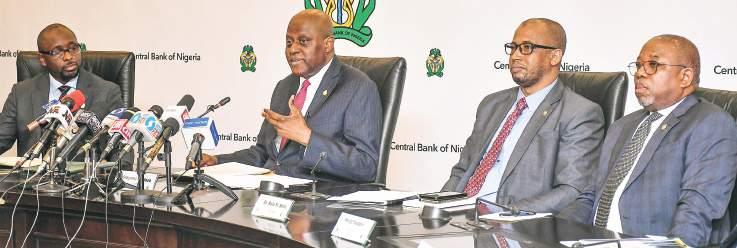
FirSt MoNetAry PoliCy CoMMittee (MPC) MeetiNg oF 2024...
Bill to Amend CBN Act Passes Second Reading at Senate
Proposed legislation to peg apex bank’s governor, deputies’ position single, non- renewable terms of six years
Sunday Aborisade in Abuja
The Senate yesterday passed for second reading, a bill for an Act to limit the tenure of the Central Bank of Nigeria (CBN) Governor and deputies to a single, non-renewable term of six years.
The decision was taken after members of the red chamber contributed to the lead debate on the amendment proposed by the Chairman, Senate Committee on Banking, Insurance and Other Financial Institutions, Senator Tokunbo Abiru.
The proposed legislation was titled, "An Act to amend the Central Bank of Nigeria Act No 7 of 2007."
This bill was co-sponsored by all the 41 members of the Senate Committee on Banking, Insurance and other financial institutions, and it was read for the first time, on Tuesday 30th January, 2024.
Abiru, noted that the mandate of the CBN was derived from the 1958 Act of Parliament as amended in 1991,1993, 1997, 1998 and 2007.
He said the current Act of 2007, charges the Bank with the overall control and administration of the monetary and financial sector policies of the federal government.
He noted with concern that the bill had not been amended for over 16 years despite growing changes to the Bank’s balance sheet as well as challenges in monetary policy implementation occasioned by fiscal dominance and the rapidly changing financial landscape.
The proposed amendments, he said, were aimed at strengthening the Bank to discharge its primary mandate of maintaining
monetary and price stability in support government’s economic growth objectives as well as align its governance mechanisms with global best practices.
He said Section 8 (2) of the CBN Act currently grants the Governor and Deputy Governor’s tenure of five years and they are eligible for re-appointment for another term not exceeding five years.
He, however said the proposed bill provides for amendment to now provide a single non-renewal term of six years for the Governor and the Deputy Governors.
He added, "This is the practice adopted by many independent Banks such as the US Federal Reserve and the European Central Bank where their Chief Executive Officers serve only one non-renewable term.
"Empirical evidence shows that a single term for the members of the Executive and Board members of central banks helps to reduce political influence on monetary policy decisions and the time inconsistency problem associated with non-independent central banks.
"In addition, the Bill proposes that where a vacancy is created by the death or resignation of a CBN Governor or Deputy Governor, the President can appoint an acting Governor in the interim pending the appointment of a substantive Governor or Deputy Governor.
"Where a substantive appointment is made, such appointment will be for a fresh term rather than serving the tenure of the previous Governor or Deputy Governor."
Abiru, further explained that the current Act made no provision for coordination of monetary and fiscal
policies which he said was the reason monetary policies of the Bank often diverge from fiscal policies to the detriment of the economy.
He explained, "To this end, the bill introduces for the purpose of co-ordination of the monetary, fiscal and trade policies, a Coordinating Committee for Monetary and Fiscal Policies."
The functions of the Committee he said, shall include: “Setting internally consistent targets of monetary and fiscal policies that are conducive to controlling inflation and promoting financial conditions for sustainable economic growth.”
He said it would apply 'caps' to any fiscal deficit at a level that can be financed without having recourse to direct monetary financing from the Bank, that is Ways and Means.
Abiru added that the amendments placed on the CBN, any other function deemed necessary
to ensure that monetary and fiscal policies were synchronised.
Membership of the proposed Committee, he said shall consist of the Minister of Finance who shall be the Chairman; Minister of Budget and Economic Planning; Minister of Industry Trade and Investment; and Minister of Agriculture.
Others are Governor of the Central Bank of Nigeria; Chief Economic Adviser to the President; and the Director General of the Securities and Exchange Commission.
Abiru added, "The Bill proposed that among the four Deputy Governors provided under section 6 (2) of the current Act, at least one career staff should be elevated to the position of Deputy Governor from within the Bank.
"This promotes a smooth transition process as well as minimises the risk of loss of institutional memory in implementing the Bank’s mandate.
"It goes without saying that while external candidates may bring fresh perspectives, internal candidates have the advantage of familiarity with the banks structure, culture, and unique challenges."
The Bill, according to the Senator, also provided for appointments of external directors, their qualifications and tenure.
He added, "Section 10 (1) of the current Act states that, ‘in appointing the five external Directors of the Bank, the President shall have due regard to a fair representation of the financial, agricultural, industrial and commercial interests and the principle of Federal Character’.
"It can be observed that there is no mention of gender as part of the factors to be considered by the President in the appointment of the five external Directors.
“In line with inclusivity in the governance of the Bank, the Bill
proposes to insert the word ‘gender’ in this provision.
"Tenure of External Directors Section 10 (3) of the current Act stipulates that each Director appointed shall hold office for four years (one year less than the tenure of the Governor and Deputies) and shall be eligible for re-appointment for another term of four years.
"As earlier noted, empirical evidence show that a single term for the members of the Executive and Board members of Central Banks helps to reduce political influence on oversight functions and monetary policy decisions.
"It is therefore proposed that the five external Directors should hold office for a non-renewable term of five years (one year less than the six-year tenure of the Governor and Deputies).
IMF to Elect Third African Representative on Executive Board in October
Ndubuisi Francis in Abuja
The International Monetary Fund (IMF) will elect a third representative for Sub-Saharan Africa on its Executive Board at the forthcoming IMF/World Bank annual meetings slated for October in Washington DC, United States of America.
This is an important step that complements the African Union’s (AU) new status as a permanent member of the G20.
IMF Managing Director, Kristalina Georgieva gave the hint in an article published on the multilateral lender's blogpost.
In the article titled, 'How the G20 Can Build on the World Economy’s Recent Resilience', Georgieva underscored the need for a stronger, more equitable, more balanced and more sustainable international system so that millions more can benefit.
She said, "To reach that goal, we
Senate Sets Up Panel to ProbeAlleged N30trn CBN Ways and Means Advances to Buhari
Sunday Aborisade in Abuja
The Senate yesterday set up an adhoc committee to investigate the disbursement and usage of the N30 trillion Ways and Means loan advances which the Central Bank of Nigeria made available to the administration of former president Muhammadu Buhari.
The Deputy President of the Senate, Barau Jibirin who presided over the plenary, announced the composition of the special committee..
Barau said the adhoc committee will be chaired by Jibirin Isah, the senator representing Kogi East Senatorial District.
He directed the committee to report back to the senate within
four weeks.
The Senate had last week, resolved to probe the alleged N30 trillion CBN advances to the Buhari administration, when Godwin Emefiele was the head of the apex financial institution.
The Deputy Senate President alleged that the Ways and Means loan was one of the major factors that caused inflation and high cost of living in the country.
He explained that if such huge advances remain unpaid, it will continue to appear in the balance sheet of the CBN.
He urged members of the adhoc committee to conduct a proper investigation into the issue with a view to recovering funds not appropriately disbursed..
Barau said, “According to statistics, broad money supply, which is a key parameter for key inflationary trends, increased from N78.3 to 78.4 trillion in 2023. The highest ever recorded in Nigeria.
“The Central Bank of Nigeria’s Ways and Means which provides direct lending to the federal government of Nigeria causes unprecedented liquidity in the economy and the current inflationary pressure that we are experiencing.
“The financial obligation to the CBN now stands at N30 trillion. The inability to repay this temporary accommodation by the federal government of Nigeria led to the regularisation of a 40 year loan at 9 percent interest per annum.
“By implication, this debt will appear in the balance sheet of CBN for the next 40 years until liquidated. It is therefore imperative to interrogate the loans of the N30 trillion Ways and Means with a possibility of recovering whatever possible” he added.
Members of the committee are, Chairman, Senate Committee on Finance, Senator Sani Musa; Chairman, Senate Committee on Appropriation, Senator Solomon Adeola; Ekpeyong Asuquo (APC, Cross River North); Mohammed Monguno (APC, Borno North); Victor Umeh (LP, Anambra Central).
Others are Aliyu Wadada (SDP, Nasarawa West), Abdul Ningi (PDP, Bauchi Central) and Ipalibo Harry (Rivers West).
must channel that inventive spirit once again.
"But we can—and must—do more. Our membership also recognised the importance of realigning quota shares to better reflect members’ relative positions in the world economy, while protecting the voices of the poorest members.
"With that goal in mind, we are developing possible approaches to realignment, including through a new quota formula. "This comes in addition to a third chair for Sub-Saharan Africa on our Executive Board for election at this year’s Annual Meetings—an important step that complements the African Union’s new status as a permanent member of the G20."
She added: "As recent military conflicts have laid bare, we live in an increasingly polarised world. The tensions are fragmenting the global economy along geopolitical lines—around 3,000 trade-restricting measures were imposed in 2023, nearly three times the number in 2019.
"No country stands to gain from the splintering of the world economy into blocs. Restoring faith in international cooperation is critical."
According to her, in the eight decades since its founding, the IMF has continually evolved to meet the needs of its membership, adding that since the COVID-19 pandemic, the Fund had deployed $354 billion in financing to 97 countries, including 57 low-income countries.
With countries likely to face larger
and more complex crises, she argued that countries must work together to reinforce the global financial safety net, with the IMF at its core.
"Last year, our shareholders gave us a strong vote of confidence. Among other measures, they stepped up to meet our fundraising targets for the Poverty Reduction and Growth Trust, which provides interest-free loans to low-income countries.
"And our shareholders agreed to increase our permanent quota resources by 50 percent. G20 countries can lead the way by quickly ratifying the quota increase, which will allow us to maintain our lending capacity and reduce our reliance on borrowed resources," she stated.
After several years of shocks, she noted that the IMF expects global growth to reach 3.1 per cent this year, with inflation falling and job markets holding up.
She lamented that low global growth affects everyone, but has particularly troubling implications for emerging-market and developing economies.
These countries impressively weathered successive global shocks, supported by stronger institutional and policy frameworks, she stressed, noting thar their slowing growth prospects have made convergence with advanced economies even more distant.
"Other factors contribute to the complex global picture. Geoeconomic fragmentation is deepening as countries shift trade and capital flows.
WEDNESDAY, FEBRUARY 28, 2024 • THISDAY 6 NEWS Group News Editor: Goddy Egene Email: Goddy.egene@thisdaylive.com, 0803 350 6821, 0809 7777 322, 0807 401 0580 Continues online
L-R: Deputy Governor, Economic Policy, Central Bank of Nigeria (CBN), Muhammed Sani Abubakar; CBN Governor, Mr. Olayemi Cardoso; Deputy Governor, Cooperate Services, Dr. Bala M. Bello and Deputy Governor, Financial System Stability, Philip Ikeazor, during the press conference on the first Monetary Policy Committee (MPC) meeting of 2024, at the CBN headquarters in Abuja ... yesterday.

WEDNESDAY FEBRUARY 28, 2024 • THISDAY 7
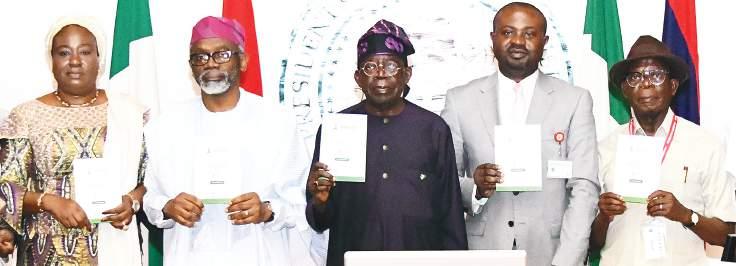
Launch of the handbook on expatriate empLoyment Levy...
Adelabu Reiterates FG's Commitment to Revamp Power Sector, Urges Discos to Live Up to Expectations
ibrahim oyewale in Lokoja
The Minister of Power, Adebayo Adelabu, has reiterated the commitment of the President Bola Tinubu-led administration to provide electricity power supply
to every part of the country and revitalise economic activities . Adelabu, disclosed this while speaking at the official inauguration of the 60 MVA ,132/33KV power Transformer at Okene Sub-region Transmission Company in Okene
in local government area of Kogi State yesterday. He explained that the federal government had commenced various steps to ensure that every home got access to electricity, stressing that the issue had gone beyond lamentation or
trading of blames. "It is important to reiterate the message of Mr. President on this day because of the role which improvement in the power sector and the overall reform in the sector must play on the strategies for
FG to Boost Disaster Preparedness with National Seismic Monitoring Initiative
The federal government has officially inaugurated the Nigerian Geological Survey Agency (NGSA) National Seismic Monitoring Station 5, aimed at expanding disaster preparedness nationwide.
The government said this came as a response to the recent unexpected earth tremors in Nigeria, underscoring the nation's low preparedness for geo-hazard events like tremors and earthquakes.
Speaking, yesterday in Abuja, at the inauguration ceremony organised by the NGSA, the Minister of Solid Minerals Development, Dele Alake, attributed the lack of readiness to the belief that Nigeria was not situated on active earthquake zones, a misconception that has now prompted urgent action.
Alake noted that the federal government aims to enhance its ability to estimate and mitigate the impact of natural disasters, marking a historic effort to protect the well-being of the Nigerian people.
“In 2016 alone, Nigeria witnessed two occurrences of earth tremor in Bayelsa and Shaki. A year later in 2017, another tremor occurred in Kwoi, Kaduna State resulting in minor damages on buildings and road infrastructures and on 5th September, 2018, the Mpape
Naira
nume ekeghe
The naira yesterday again returned to gaining at the parallel market as it appreciated to N1,620/$.
However, the official Nigerian Autonomous Foreign Exchange (NAFEM) depreciated closing yesterday at N1,615.94 signifying a N33 loss compared to N1,582.94 it closed on Monday.
The parallel market however
tremor took place affecting areas such as Maitama, Katampe and part of Gwarinpa. Just when the dust was about to settle, another earth shaking was felt at Panama street of Maitama District on November 1st, 2018.
“The absence of a single seismic detection and monitoring instrument in the FCT then has hindered proper understanding of the nature and origin of these tremors.
“The Ministry after gathering reports on the likely causes of the tremor from NGSA and other relevant bodies immediately banned all quarrying and drilling activities within the FCT as temporary measures and directed the immediate installation of earthquake monitoring stations in strategic locations around the FCT.
“These stations are located in University of Abuja Gwagwalada, Nasarawa State University, Keffi and the Veritas University, Bwari, with the center at NGSA Headquarters Utako.
Other stations are NGSA Offices in Kaduna and Ilorin. These seismic monitoring stations will enable the detection and monitoring of future occurrence of earthquake and tremor in and around the FCT and shall therefore help to upscale the level of safety in the FCT.
“In addition to the above, the
data generated from the stations are critically required by researchers and construction companies to aid their decisions on siting of infrastructures such as dams, bridges, mines, processing plants, airports, high rise buildings, military and communication installations and other heavy infrastructures that require competent and stable foundations,” he added.
Alake further expressed the ministry's commitment to supporting NGSA in maintaining and actively operating all seismic monitoring stations.
Director General NGSA, Dr. Abdulrazaq Garba, on his part, emphasised the need to deepen NGSA's capacity in Seismic Monitoring through staff training.
He underscored the importance of modern technical innovations
in seismology, instrumentation, earthquake source parameter detections, seismogram analysis, instrument configuration, and calibration.
“A robust seismic monitoring capability aligns with the federal government’s Renewed Hope Agenda as it concerns sustainable urban development involving the integration of technology, innovation, and strategic planning to create an environment that is efficient, resilient, and responsive to the needs of the nation.
“The agency is adopting and integrating innovative technology for data acquisition, data integration, modeling, and predictive geoscience as well as earth systems monitoring and integrated data management as a strategy to enhance national security and development.”
national economic development of which the Presidential Power Initiative (the PPI) is critical.
"The commissioning of this equipment here today is part of a deliberate plan to effectively address recurring challenges of capacity deficits in the power sector.
“I can assure you that the Ministry under my watch will collaborate with critical stakeholders to solidify actionable plans capable of providing Nigerians and the economic industry with regular and affordable electricity supply.
“Concurrently, we are remotely commissioning four additional sites, namely Amukpe in Delta State, Potiskum in Yobe State, Apo in Abuja, and Ihvobor in Edo State.
“These commissioning’s mark a significant stride in the revitalisation of the power sector, representing a decisive action that will profoundly influence our industrial, social, and commercial landscape as a nation.
"Our intention as a responsible and responsive government is to provide 24-hour electricity for Nigerians, and we will pursue this with all vigour, to enable economic activity, alleviate the sufferings of our people, and lift the various sectors of the economy from stagnation and poverty," the Minister posited.
In an interview, the Minister
warned all the power Distribution Companies (Discos) not frustrate efforts of the federal government, stressing that erring companies would be sanctioned.
Adelabu restated commitment of the Presidential Power Initiative to providing metres to every homes to stop the current outragous bill on monthly basis. The Minister also urged the Discos and other critical stakeholders to invest in critical infrastructure.
He tasked the State governments to also invest in power generation, while commending the Abia Sate government over the recent launch of the Geometric Power Plant’s 188 megawatts.
Also speaking, the Managing Director, Federal Government of Nigeria Power Company , Mr. Kenny Anuwe, explained that the primary mandate was to provide additional 4,000 megawatts to boost the economic activities in the country .
Anuwe added that as part of efforts to fulfil the mandate the FGNPC had acquired additional 10 60MVA ,132/33KV power transformers and 10 mobile substations which had been distributed across various locations in the country.
The Managing Director reiterated the commitment of the President Bola Ahmed Tinubu towards fixing the epileptic challenges of power sector in Nigeria.
CSO Seeks Increase in Tobacco Tax
onyebuchi ezigbo in Abuja
As part of measures to curb tobacco consumption and its health hazards, the Nigeria Tobacco Control Alliance has canvassed an increase in penalty tax charged on manufacturers and distributors of tobacco products in the country.
While commending the federal government for the money allocated for local tobacco control efforts in the 2024 national budget, the coalition said N10 million was very low compared to the huge challenge that needed to be addressed.
voted in the budget this year still fell below expectations.
"As an Alliance, we commend the N10 million allocation for local tobacco control efforts in the 2024 national budget as a slight improvement compared to the N4.7 million allocated in the 2023 national budget.
frail health system, and the lean pocket suffered by many Nigerians, the federal government ought to prioritise financing the enforcement of tobacco control measures to ensure that diseases associated with tobacco products are prevented.
of the civil society groups was on why all tobacco companies have not been fulfilling their obligation of paying for operating licenses after gaining approval to operate in Nigeria.
returned to gaining as it closed the N1,620 compared to the N1,680 it closed on Monday signifying N60 gain.
However, the daily turnover recorded yesterday was $154.16 million, the same rate quoted the previous day.
Also, the highest spot rate yesterday was pegged at N1778, while the lowest spot rate recorded was N1,300.
Chairman, Nigeria Tobacco Control Alliance (NTCA) Akinbode Oluwafemi, who spoke at a press briefing in Abuja, yesterday, said there was no evidence to show that all tobacco companies had been fulfilling their obligation of paying for operating licences after gaining approval to operate in Nigeria.
Speaking on the 2024 budgetary allocation for tobacco control and other tobacco control funding matters, Oluwafemi said the amount
"However, it must be emphasised that this amount still falls below expectations, especially because we know that while it looks like the figure has gone up, there is almost no difference from last year’s allocation when Nigeria’s hyper-inflation is considered.
"Time and again, we have stated that limited funding hinders the comprehensive implementation of measures outlined in the National Tobacco Control Act, which are designed to tightly regulate tobacco products and tobacco use in the country, and ultimately reduce the burden of cancer and other non-communicable diseases in Nigeria," he said.
Oluwafemi, said with Nigeria’s
He added that another critical concern was whether the monies previously budgeted were released into the Fund account.
"It is imperative to remind the federal government that the National Tobacco Control Act stipulates that funds allocated for tobacco control in the national budget or from other sources are to be remitted to the Tobacco Control Fund account for utilisation.
"We strongly desire to see that this is complied with, and for this reason we call on the Federal Ministry of Health to provide an update on the status of the Tobacco Control Fund, specifically detailing the current balance, sources of the monies in the Fund and details of previous spendings from the Fund," he said.
Oluwafemi said the concerns
According to him, it is imperative that tobacco companies comply with this requirement, as it serves as a crucial regulatory measure to monitor their operations and ensure their adherence to established guidelines.
Country Coordinator, Campaign for Tobacco-Free Kids, Michael Olaniyan, urged the federal government to consider earmarking tobacco tax as a dedicated source for financing tobacco control enforcement efforts in the country.
He also there was need to increase the tobacco tax from the current 25 percent so as to serve as deterring measure to reduce tobacco consumption
Another member of the Tobacco Control Alliance, Mr. Chibuike Okorie, said high inflation had eroded the value of the fund allocated for tobacco control in the year.
8 WEDNESDAY, FEBRUARY 28, 2024 • THISDAY NEWS
L-R: Head of Civil Service of the Federation, Mrs Folashade Yemi-Esan; Chief of Staff to the President, Femi Gbajabiamila; President Bola Tinubu; Minister of Interior, Olubunmi Tunde-Ojo and Chairman, Senate Committee on Interior, Adams Oshiomhole during the unveiling and launch of the Handbook on Expatriate Employment Levy (EEL) at the Presidential Villa in Abuja ... yesterday
Gains
at Parallel to N1,620/$1, Official Rates Dips to N1,615/$1
folalumi alaran in Abuja

WEDNESDAY FEBRUARY 28, 2024 • THISDAY 9
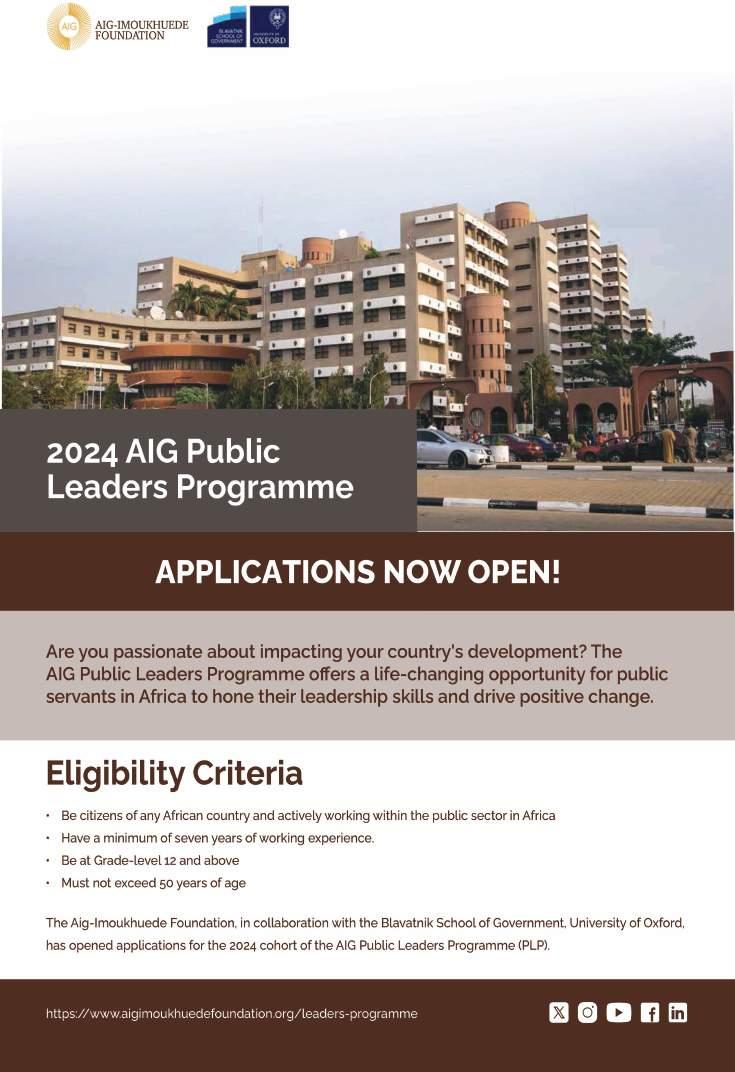
10 WEDNESDAY FEBRUARY 28, 2024 • THISDAY

WEDNESDAY FEBRUARY 28, 2024 • THISDAY 11
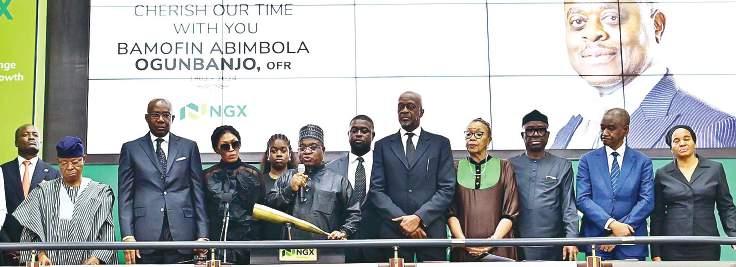
HONOURING LATE ABIMBOLA OGUNBANJO...
NGX
Tinubu to Nigerians: There is Hope for Great Economic, Financial Future
Launches expatriate employment levy
Deji
Elumoye in Abuja
President Bola Tinubu has given an assurance that there was hope for the nation’s financial and economic prospects, citing efforts currently being made by the administration in all sectors.
The President gave the message of hope yesterday, during the unveiling and launch of the Expatriate Employment Levy (EEL), held at the State House, Abuja.
Commenting on the positive outlook of the nation’s finances and the economy, Tinubu cited efforts being put into recovery by officials of the administration, saying though things appeared harsh currently, indicators showed that there was light at the end of the tunnel.
According to him: “We expect revenue generation improvement, improved naturalisation and indigenisation, employment of more Nigerians by foreign companies operating in this country, balancing of employment opportunities between Nigerians and expatriates, close wage gap between the expatriate and the Nigerian labour force by making it more attractive to hire Nigerians.
“We must assure Nigerians that there is light at the end of the tunnel, we might be going through difficult periods now, but when you look at the Infrastructure Concession Regulatory Commission, the Federal Ministry of Finance, Budget and National Planning and people manning the ship of this country, including Central Bank of Nigeria, they have collaborated and in the spirit of development and progress, we are glad that good effort is be-
Russia
ing made to retool, reengineer the finances of the country and make growth our hallmark. “I’ve been further assured that the project has the capacity of plugging loopholes and gaps that have bedeviled the country in dealing with security challenges, movement of foreigners in and out of the country.
“Interestingly, this scheme will wield the dual fold of revenue generation as well as addressing
employment challenges as salary gaps attendant in the remuneration of expatriate workers as compared with their Nigerian counterparts”.
The President, who lauded the Minister of Interior, Hon. Olubunmi Tunji-Ojo, for the various progressive innovations he had introduced into the job, earning the government accolades from home and abroad, described the EEL scheme as another game changer. He expressed excitement over the
various positive advantages of the scheme, including better employment opportunities for Nigerians with foreign companies and bridging of the wage gap between Nigerian employees and expatriates in foreign companies’ operation in Nigeria.
Tinubu, however, warned that the operators of the scheme should be careful not to turn it into another bureaucratic bottleneck, which is capable of frustrating potential investors.
“I declare my support for the Expatriate Employment Levy scheme and I will continue to encourage the operators, practitioners of immigration matters and expatriate quotas, but don't use it as a bottleneck, don’t use it to frustrate potential investors.
“There will be clear lines of implementation and effective acceleration of aims and objectives of this program. Immigration matters and expatriate quotas, and relevant
stakeholders, have to be effectively guided to make Nigeria the focus of the objective of this EEL. Therefore, it is my honour that the handbook of the Expatriate Employment Levy is hereby launched,” he said. Earlier in his remarks, Tunji-Ojo, highlighted some of the features in the EEL scheme, built in to create employment opportunities and competitive advantages for Nigerian workers working in foreign companies in the country.
Telcos Begin Total Disconnection of Unregistered SIM Cards Today
NCC insists on February 28 deadline, says no extension
Telecoms operators would today commence total disconnection of unregistered SIM cards, including improperly registered SIM cards and all SIM cards not linked to the National Identification Number (NIN), following the directive from the Nigerian Communications Commission (NCC) to do so.
Chairman of the Association of Licensed Telecoms Operators of Nigeria (ALTON) and spokesman for telecoms operators, Gbanga Adebayo, who confirmed this to THISDAY, via a telephone call, said the order to begin total disconnection came from NCC, adding that telecoms operators are under obligation to comply with the directive of the telecoms industry regulator.
“It is a directive that is in accordance with regulatory orders and we
will commence total disconnection of all unregistered SIM cards and all SIM cards that are not linked to NIN.
“Since the NCC gave the directive December last year, we have carried out several campaigns to sensitise telecoms operators on the need to ensure proper registration of their SIM cards and to also link same to their NIN.
“We had even commenced partial disconnection, where SIM cards were blocked from generating calls, even though such SIM cards were still able to receive calls from other networks. The implication of the total disconnection which begins today, is that telecoms operators will bar all unregistered SIM cards, all improperly registered SIM cards and all SIM cards that are not linked to NIN, from receiving and making calls,” Adebayo said. He, however, said those who
would be affected by the total disconnection, would have to visit their telecoms service provider for registration and validation of SIMNIN linkage. The NCC who confirmed the commencement of total disconnection of unregistered SIM cards today, insisted there was no going back on the February 28 deadline for the SIM disconnection.
The Director, Public Affairs at NCC, Reuben Muoka, told THISDAY in a telephone conversation that there would be no date extension.
“The February 28 deadline stands, and there is no going bank. There will be no date extension on the deadline. All those that will be affected, need to go back to their service provider for proper SIM registration after they must have shown evidence of NIN registration.
“Once the revalidation exercise
Commends ECOWAS’ Partial Lifting of Sanctions on Niger, Mali, Burkina Faso
Michael Olugbode in Abuja
Russia has commended the decision of Economic Community of West African States (ECOWAS) to lift some of the sanctions imposed on departing members of the bloc, Niger, Mali and Burkina Faso, as a result of military ejection of the countries’ civilian regimes.
An official statement by the Russian Ministry of Foreign Affairs on Tuesday said: “The window for dialogue between the Sahel States Alliance (SSA) and ECOWAS remains open, and the decisions made at the Abuja Summit can be
seen as a demonstration of political will in the interest of maintaining Community unity.” The statement read: “On February 24th, an extraordinary summit of the Economic Community of West African States (ECOWAS) was held in Abuja, Nigeria, where the most pressing regional issues were discussed. The forum resulted in a series of important decisions, including those addressing the preservation of ECOWAS unity in light of the recent announcement by the leadership of Mali, Niger, and Burkina Faso of their "immediate" withdrawal from its membership.
“These countries, amidst the
Community's imposed restrictions, established a new integrative alliance in September 2023, named the "Sahel States Alliance" (SSA), aimed at consolidating efforts in national defense and security.
“It has been reported that among other measures, ECOWAS announced a partial lifting of sanctions against Niger, including the reopening of land and air borders, unfreezing of Nigerien assets in the Central Bank and Community commercial banks, resumption of trade and financial transactions, electricity supplies, and other services, as well as the provision of assistance from ECOWAS financial
institutions.
“The Russian side emphasizes that the West African states should determine their own ways to resolve the current situation. The window for dialogue between the SSA and ECOWAS remains open, and the decisions made at the Abuja Summit can be seen as a demonstration of political will in the interest of maintaining Community unity.
“Moscow reaffirms its unwavering readiness to enhance cooperation with Sahelian states in formats they deem most suitable for collectively addressing existing economic challenges and threats to their security.”
is concluded, the customers’ SIM will be reactivated and the customer will start receiving and making calls again,” Muoka told THISDAY.
Reacting to some media report that the court had ordered NCC to extend the February 28 deadline, Muoka said the commission was not aware of any court order on extension of deadline, insisting there is no going back on the decision of
NCC to commence total disconnection of unregistered |SIMs and SIMs that are not linked to NIN.
The NCC last December gave orders to telecoms operators (Telcos) to commence full barring of all unregistered and improperly registered SIM cards on their networks that have not been linked to the National Identification Number (NIN) of the SIM card holder.
Adesina to Deliver Keynote Lecture at Obafemi Awolowo Prize for Leadership
Ugo Aliogo
The President of African Development Bank (AfDB) Dr. Akinwunmi Adesina, would deliver the keynote address at the Obafemi Awolowo Prize for Leadership on March 6.
A statement signed by the Bank noted that the Obafemi Awolowo Foundation would award the AfDB President with the prestigious Obafemi Awolowo Prize for Leadership on same day.
The statement noted that the prize which promotes the legacy and democratic ideals of the late Nigerian nationalist and federalist leader Chief Obafemi Awolowo, also recognises and celebrates excellence in leadership.
Established in 1992, the Obafemi Awolowo Foundation is a non-profit, and non-partisan organisation.
The statement further explained that the prize was a prestigious and biennial, international prize structured to follow a rigorous process of nomination and subsequent screening
by a selection committee consisting of some of the most outstanding Nigerians.
The statement hinted that the prize not only confers considerable honour and recognition on the recipient, but also serves as a strong incentive to persons to pursue excellence in leadership and good governance.
It stated that in line with the relevant guidelines for the selection of candidates for the award, the call for nomination for this year’s edition of the Obafemi Awolowo Prize for Leadership was published for several months in 2023, adding that at the close of nomination, many nominations were received.
The statement added that there was no doubt that many of these nominees are eminent persons who have made tremendous contributions in various spheres of life.
Adesina is the third recipient of the award. Others include Nigerian writer and Nobel laureate Wole Soyinka and former South African President Thabo Mbeki.
12 WEDNESDAY, FEBRUARY 28, 2024 • THISDAY NEWS
Emma Okonji
L-R: Chief Executive Officer, Nigerian Exchange Group, Temi Popoola; past President of Council, The Nigerian Stock Exchange (NSE), Oba Otudeko; Chairman, Coronation Group and past President, NSE, Mr. Aigbojie AigImoukhuede; wife of Late Abimbola Ogunbanjo, Titi Ogunbanjo; daughter, Ladun Ogunbanjo; Group Chairman, NGX Group, Umaru Kwairanga; son of late Ogunbanjo, Timi Ogunbanjo;brother, Tokunbo Ogunbanjo; former Chairman, NGX RelCo, Angela Adebayo; former Minister of Trade and Investment, Niyi Adebayo; former Chairman, Nigerian Exchange Limited (NGX), Mr. Abubakar Mahmoud, and former Chairman, NGX RegCo, Cathy Echeozo, during the afternoon of Tributes and Closing Gong ceremony in honour of the former President of NSE Council and Chairman of NGX Group, Late Abimbola Ogunbanjo at the
in Lagos…yesterday

WEDNESDAY FEBRUARY 28, 2024 • THISDAY 13


14 WEDNESDAY FEBRUARY 28, 2024 • THISDAY
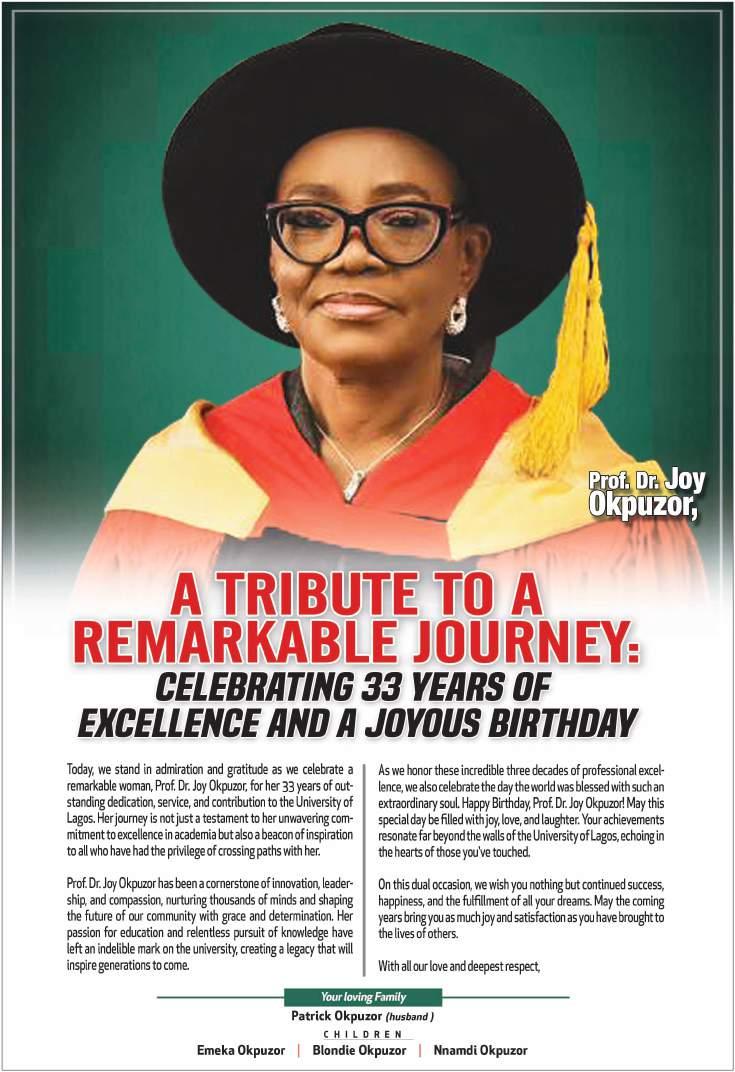
WEDNESDAY FEBRUARY 28, 2024 • THISDAY 15
10th Senate: Need for Executive to Objectively
Legislative Interventions
Mon-Charles Egbo canvasses the need for the Executive a rm of government to
interventions by the Senate towards even development of the nation.

Until there is a government that is purposeful in evaluating legislative inputs, especially resolutions, there shall be a deficit of good governance in Nigeria.
For example, the latest banditry attack on the Abuja-Kaduna highway and the spate of kidnapping that has overwhelmed the entire Federal Capital Territory could have been averted.
The Senate, in its first quarter, had declared what seemed a state of emergency on the road infrastructure. It developed “a compendium of all the affected Federal roads and erosion sites across the country either awarded but abandoned by contractors or have not been awarded at all, to be forwarded to the Executive Arm for urgent intervention”.
Specifically, there was a provision for “increased security surveillance through deployment of more personnel and use of Unmanned Aerial Vehicles (UAVs) such as drones, radars and scanners” on the Abuja-Kaduna expressway.
Also, it expressed some proactive opinions aimed at making the entire FCT relatively secure.
However because the executive dismisses legislative resolutions as strictly advisory, the opportunities for the above unfortunate incidents were nurtured.
Nevertheless, one attribute of the 10th Senate is its consistency in demonstrating that the legislature is all about the good of the people. It is always deliberate in its obligations. It is not given to drama or grandstanding. Also, it is not interested in the quantity but in the quality of legislation, as long as the overall fulfilment of the citizens is attained.
All these features indeed reflect the legislative agenda upon which Godswill Akpabio was elected the president of the senate.
Having started with the road infrastructure given its crucial nature to national development, the Senate, in the second quarter, deepened its interventions in this regard.
Among others, it took the Bitumen Development Commission of Nigeria (Establishment) bill through a second reading and then initiated another to amend the Federal Highways Act as well as those for establishing the National Roads Fund and Erosion Control Commission respectively. The Senate again effected quick confirmation of the Federal Roads Maintenance Agency’s Managing Director and board members.
Also while adopting it “as part of Enugu State’s submission to the Committee on the Collapse of Road infrastructure in Nigeria”, the Senate urged “the federal government through FERMA to embark on the immediate reconstruction of the collapsed bridge at the
Enugu end of the Enugu-Port-Harcourt Expressway”.
Equally on the FCT, the Senate created additional standing committees for integrated and broad-based interventions towards improving governance.
They included the Committee on Federal Capital Territory Area Council and Auxiliary Matters whose jurisdiction entails a “review of all the laws establishing the structure and administration of the Area Councils in the FCT” and then, the Committee on Federal Capital Territory that focuses on “matters affecting the FCT, planning and development of the new FCT as well as “allocation of lands in the FCT”.
Furthermore, the Senate, while urging “the FCT Minister to revisit the award of contract for the installation of CCTV cameras worth $500 million in and around the FCT” passed the FCT statutory supplementary budget and also introduced a bill to establish the FCT School of Nursing and Midwifery.
Other newly created committees were those on Atomic and Nuclear Energy, Sports Development, Youth and Community Engagements, Solid Mineral Development, Steel Development, Tourism as well as Culture, Art and Creative Economy.
And for productivity, several bills were also proposed.
Then towards economic recovery and sustainable growth, the Senate commenced amendments to the Nigerian Investment Promotion Commission Act, Nigerian Deposit Insurance Corporation Act, Federal Inland Revenue Service Act
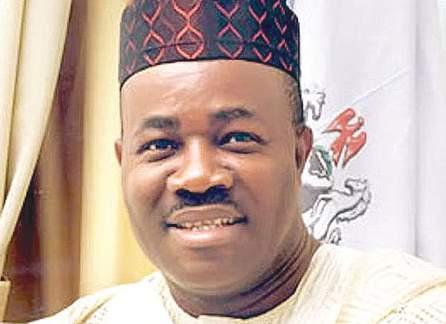
and the Price Control Act in addition to two other separate attempts on the Central Bank of Nigeria Act.
Particularly on the opportunities inherent in the emerging blue economy, the Senate expeditiously passed the bill for an Act to Establish the Nigeria Maritime University, Okerenkoko, Delta State while the Nigerian Maritime Safety and Administration and the Merchant Shipping Acts amendments gained momentum.
And again, to “enhance sustainable socioeconomic relationships across the country and also promote national integration, and ultimately boost the economy and give a sense of belonging to all, “the Senate activated the mechanism “to ensure that all the four Geopolitical Zones within the Eastern Rail Line Corridor (traversing Port-Harcourt to Maiduguri) benefit from the on-going Railways Standardization and Modernization Programme of the Federal Government”.
It also proposed bills for the establishment of the South-East Development Commission and the North-Central Development Commission.
Intensifying its avowed commitment to protecting the citizenry, the Senate accorded significant attention to the two hydra-headed issues undermining the fight against insecurity namely the absence of coordination among the security agencies and the perception that certain security operatives secretly aid terrorism and banditry.
The basic areas of focus were the incessant “kidnapping for ransom in the North-West geo-political zone”, the spate of “insurgency and terrorism in Niger State”, as well as “the abduction of students of the Federal University, Dutsima, Katsina State”.
Others were the attacks by armed robbers on banks and Oturkpo Police Command in Benue
Nevertheless, one attribute of the 10th Senate is its consistency in demonstrating that the legislature is all about the good of the people. It is always deliberate in its obligations. It is not given to drama or grandstanding. Also, it is not interested in the quantity but in the quality of legislation, as long as the overall fulfilment of the citizens is attained. From the foregoing, it bears repeating that if only the executive could objectively evaluate legislative interventions, integrated and sustainable developments would be guaranteed in Nigeria.
State and the Christmas Eve massacre of innocent citizens in Mangu and Barkin-Ladi areas of Plateau State which particularly reinforced the seeming culpability of the security operatives.
Extending its interventions to “the Displaced People of Gwer-West, Makurdi and Guma Local Governments” including the communal clashes between Ifon and Ilobu communities in Osun State as well as Ovonum and Ofatura in Cross River State, the Senate holistically investigated the reported “complexities of the security personnel and agencies that were supposed to protect and enforce security in the affected areas, but are harbouring and protecting the criminals”.
In the end, it recommended the development of “a National Policy document outlining the framework for an improved and streamlined synergy and coordination between the various security agencies” both military and paramilitary, and also “permanent presence of soldiers and other security agencies in Niger State to contain the upsurge of insecurity” in addition to challenging “the Nigeria Police and other relevant security agencies to unravel the mystery of lack of intelligence and alertness on the day of (Oturkpo) invasion”.
Furthermore, the Senate urged the federal government to “address the manpower deficit in the armed forces and the police, and equip them to discharge their functions effectively and efficiently” and also “to urgently address the twin problems of unemployment and poverty since these evils cause insecurity in Nigeria”.
Then specifically, it requested “the federal government to redeem the ten billion naira promise made to the people of Benue State to rebuild the destroyed communities by the immediate past Vice President, Prof. Yemi Osinbajo in 2018”, in addition to ensuring “quick return of the displaced persons to their ancestral homes and as well provide a sustainable security corridor to all flash points within the affected communities”.
Additionally, it called for the federal government’s urgent intervention through the relevant agencies per their respective mandates, particularly by setting up internally displaced persons (IDP) camps in the affected areas and providing necessary support to the communities affected”, such as deploying “security personnel……..and prevent any further escalation of the conflict”.
-Egbo, a parliamentary affairs analyst, writes from Abuja
politics Acting Group Politics Editor DEJI ELUMOYE Email: deji.elumoye@thisdaylive.com (08033025611 SMS ONLY ) 16 THISDAY • WEDNES DaY FEBRUa RY 28, 2024 NOTE: Interested readers should continue in the online edition on www.thisdaylive.com
legislative
support necessary
Evaluate
Tinubu Akpabio
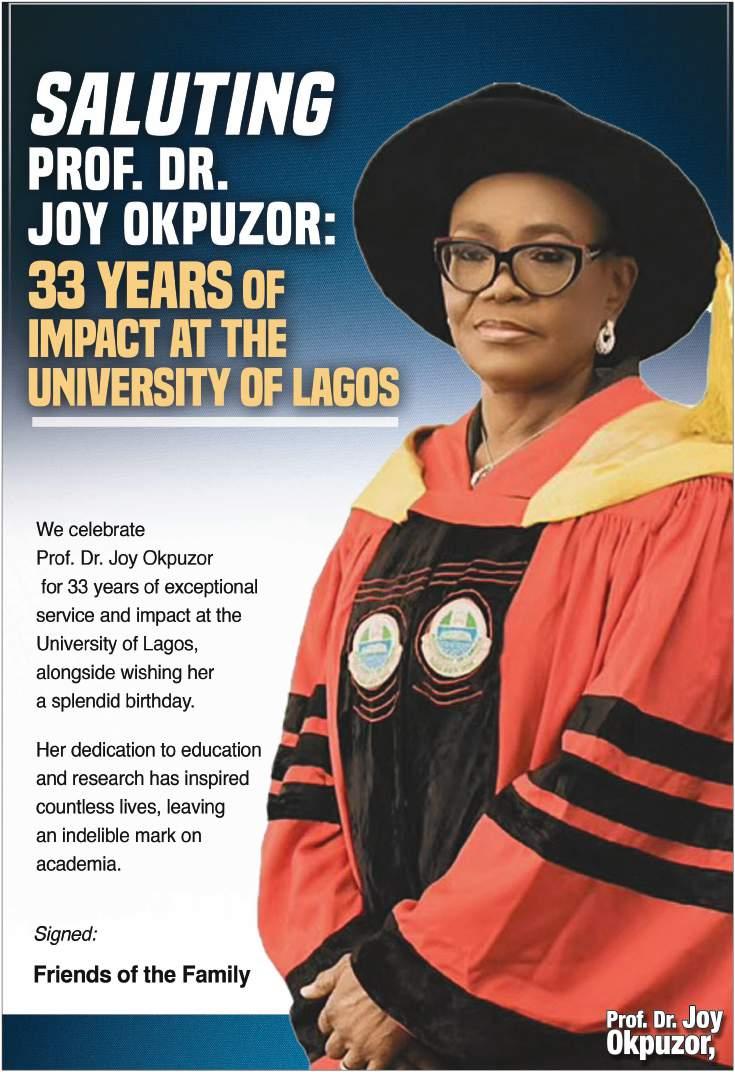
WEDNESDAY FEBRUARY 28, 2024 • THISDAY 17
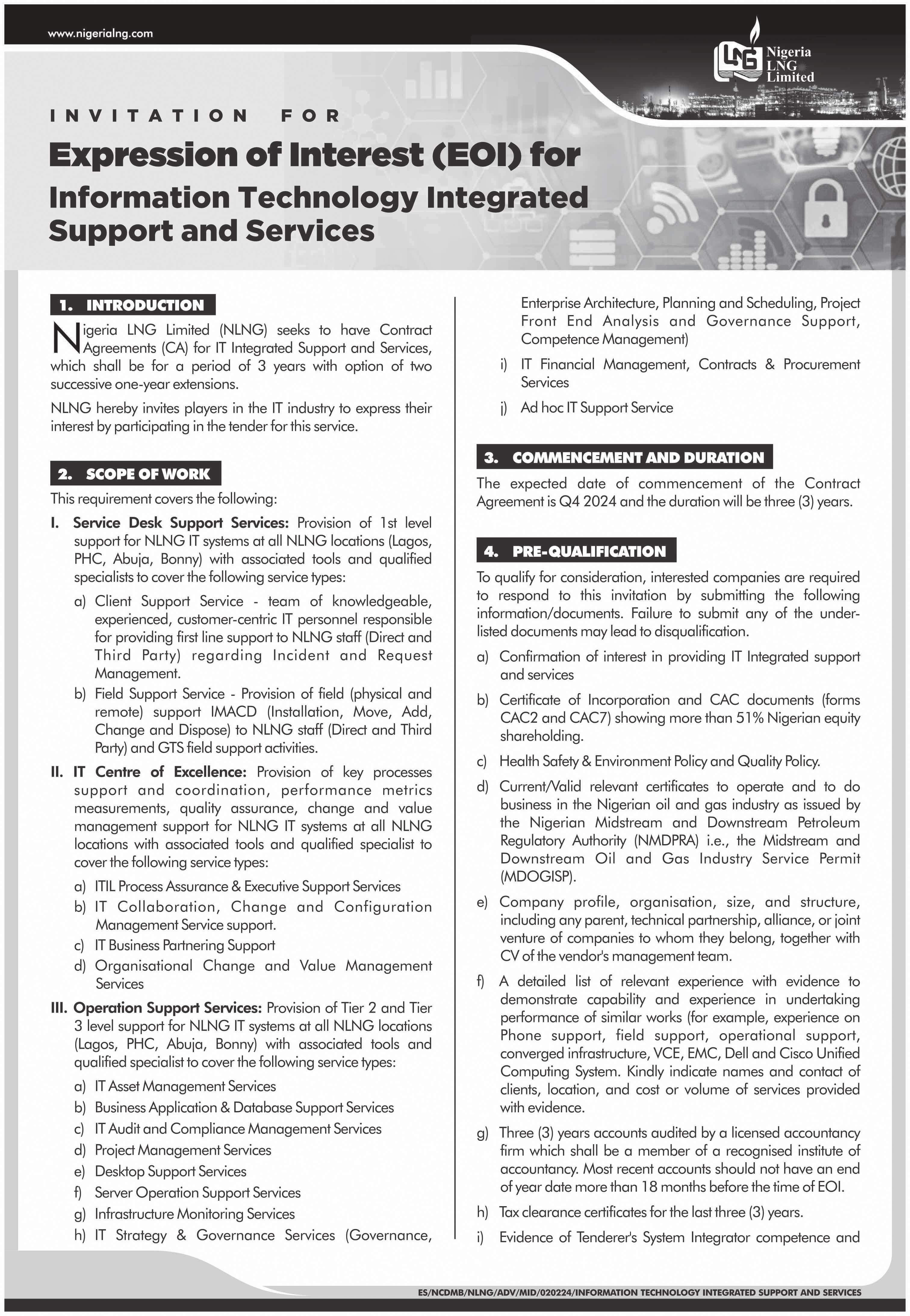
18 WEDNESDAY FEBRUARY 28, 2024 • THISDAY

WEDNESDAY FEBRUARY 28, 2024 • THISDAY 19
polity
Understanding Uba Sani’s Panacea for Insecurity in Kaduna and Beyond
By Jibril Kareem
It is true that most of the members of the highly revered Kaduna Elders’ Forum are well aware of the uncommon intellect of the young and the level-headed Governor of Kaduna State, Senator Uba Sani. Not a few of the Elders were however confounded, albeit positively, on Monday 5th February, when the Governor hosted the Elders’ Forum at the Sir Kashim Ibrahim Government House, Kaduna, the state capital.
The very influential members of the Kaduna Elders’ Forum who were led by the duo of Gen. Zamani Lekwot (retd) and Alhaji Abubakar Mustapha, were ostensibly at the Kaduna State Government House to felicitate with Governor Uba Sani following the affirmation of his resounding victory at the gubernatorial polls by the nation’s apex court - the Supreme Court; but the very profound Governor Uba Sani seized the rare opportunity of the visit to present what many now regard as the state-of-the-State address to the respected elders. Curiously the Governor spoke largely off the cuff, underscoring his administrative depth and firm knowledge of the issues that matter.
Not surprisingly, the red-hot issues of banditry, kidnappings and other shades of insecurity and criminality in the State took the centre stage. Governor Uba Sani did not only trace the root causes of the multifaceted crisis of insecurity in the State, he proffered workable solutions and gave the elders up-to-date steps his administration has so far taken, the results already achieved and the projections for the future.
For starters, Governor Uba Sani traced the security challenges in Kaduna State and the North-West zone of the country at large, to poverty, unemployment and poor leadership or governance at several tiers of the people’s being.
“What are the factors that have brought about this unfortunate state of affairs? Hopelessness, lack of education and lack of economic prosperity. Over 85 percent of the people in the North West are either not educated or financially excluded,” Senator Uba Sani told the elders.
“No matter how much we talk and try to bring about peace, if we don’t look at the area of good governance, we will never end the problem of insecurity in Northern Nigeria in particular. People always talk about how the problem of insurgency ended in the North-East, but the insurgency is not the same as the problem of banditry and kidnapping that we have in the North-West. The North-East issue was about people that came from nowhere and talked about the ideology of Boko Haram. However here in the North-west, there is so much poverty; and if we don’t address the poverty by supporting our farmers and increasing productivity, we will not address the problem of insecurity,” he averred.
The Governor also bemoaned the huge number of out-of-school children in the North-western part of the country, especially in Kaduna State. “In Kaduna State, we have over 600,000 out-of-school children. This is unacceptable and we, in fact, view the situation as a ticking time bomb.”
The Governor was however quick to inform the elders that since assuming office, his administration has been deploying very effective measures to stem this ugly tide, an example being the proactive collaboration between the Kaduna State Government and the Kuwait Fund. He said the Fund is currently supporting the State with $28million to return hundred of out-of-school children back to school under the Qatar Sanabil Project.
Pursuant to the Sanabil Project, Qatar has also commenced the construction of 500,000 housing units for less privileged residents of Kaduna State. The Mega Economic City project was officially inaugurated by Governor Uba Sani and Qatar’s Ambassador to Nigeria, Ali Bin Ghanem Al-Hajri in Kaduna in August 2023.
The project aim to improve the living conditions for underprivileged families in the state. Aside from the construction of the housing units, Qatar Charity shall be undertaking an array of interventions and empowerment programmes for the less privileged across Kaduna State. These programmes, many of which have commenced, include scholarships for orphans and children of the poor, distribution of sewing machines, welding machines, irrigation pumping machines, salon kits, and drilling of hundreds of boreholes across the 23 local government areas of Kaduna State.
According to Governor Uba Sani, “The Economic City will provide world-class infrastructure and make Kaduna a reference point in modern and affordable accommodation with adequate security and a conducive atmosphere for business activities,”
“It will facilitate international trade while serving as a platform for local entrepreneurs and traders. It will also harness product value chain opportunities
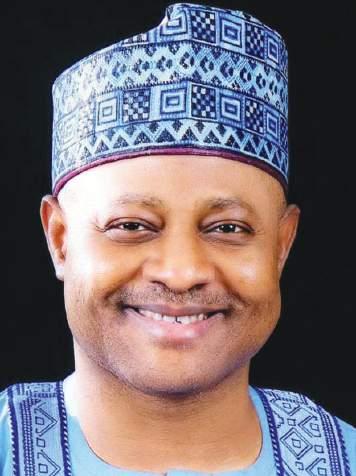
and improve economic growth,” he added. The governor said the project extends beyond housing, it also provides clinics, shops, poultry farms, and farmlands for the rainy season and irrigation farming.
On insecurity, Governor Uba Sani informed the elders that his administration is currently working hand-in-hand with the Armed Forces of Nigeria to fight and win the war against banditry, kidnapping and all other forms of criminality in the State. The Governor recalled his visits to the Chief of Defence Staff, General Christopher Musa (who incidentally is from Kaduna State) all the Service Chiefs as well as the National Security Adviser (NSA) in his quest to garner support to stamp out multifaceted insecurity in Kaduna State. Members of the Kaduna State Elders Forum were visibly enthused when Governor Uba Sani announced that the collaboration with the nation’s Armed Forces and other security agencies was already paying off.
“They (Armed Forces) have decided to set up two Forward Operation Bases in Kaduna, one in the Southern Kaduna, in Zangon Kataf to be precise and the other one in Birnin Gwari to serve Birnin Gwari down to Giwa. The FOBs will be set up in the next three weeks”, he told the elders.
The Kaduna State Governor was unequivocal in his assurances to the Kaduna Elders’ Forum that the days of bandits, and other criminal elements, who have for a long while been terrorizing the State, were numbered.
A firm believer in good governance being the most potent weapon against insecurity, Governor Uba Sani has tailored his administration to bring sustainable development to every nook and cranny of Kaduna State. Indeed, the Governor’s topmost priority areas are the rural and underserved areas of the State. “The central policy thrust of our administration
is Rural Transformation. We are committed to revitalizing our rural economies through massive infrastructural development,” Governor Uba Sani recently reiterated.
“Our people have been struggling to stay afloat in this harsh economic climate. As a government, we have been unrelenting in fashioning and implementing policies, programmes and projects to bring succour to the poor, underserved and the vulnerable. We are determined to reverse the negative development indices of Kaduna State. We are creatively and innovatively addressing the challenges of poverty and youth unemployment. We are prioritizing women and youth empowerment,” the Governor assured stakeholders during the Kaduna State Core Security Council meeting with traditional rulers and Local Government Chairmen of frontline areas, held in January this year.
Very conscious of the fact that the nefarious activities of bandits and other criminal elements, in especially rural communities in the State, will all-too certainly imperil his vision of aggressively curbing poverty and underdevelopment in underserved parts of the State, Governor Uba Sani has in addition to his administration’s fruitful collaboration with nation’s armed forces and other security agencies, revitalized the Kaduna State’s Vigilante Service (KADVS). He beefed up the Service with 7,000 able-bodied persons who were trained by the Nigeria Police Force and he has since procured assorted security assets for the rebooted Service.
The recruitment and screening of the trainees were in collaboration with critical stakeholders including local government chairmen, traditional and religious leaders. Governor Sani has also affirmed that the initiative, apart from being a major step towards restoring security and development in the state, is also geared towards
providing jobs for the teeming youth population in the State.
Poised to give needed financial muscle to several security efforts his administration is undertaking, Gov. Uba Sani recently signed into law, the Kaduna State Security Trust Fund Bill, created to provide funding support to the efforts being made towards degrading terrorists, bandits, kidnappers and other criminal elements. The new law repealed Kaduna State’s Security Trust Fund Law No. 22, of 2018.
The Kaduna State Governor believes that the legislation would help to raise funds for the acquisition and deployment of security equipment, personnel and materials, as well as their training.
The governor explained that the private sector would play a prominent role in the management of the trust fund in collaboration with critical stakeholders in the security sector. “The new law is also designed to align with global best practices. It is a model for other sub-nationals as well as a clear demonstration of the state government’s commitment towards degrading terrorists, bandits, kidnappers and other criminal elements who have been laying siege to some communities in our state,” he added while appealing to corporate organisations and public-spirited individuals to donate generously to the security trust fund.
Interestingly, the Federal Government and other States are keying into Governor Uba Sani’s long-running advocacy to alter Nigeria’s constitution to enable States to establish and run their respective police forces or services as is the case in most developing and developed countries of the world. It is on record that as a vibrant lawmaker in the 9th Senate, Uba Sani sponsored series of bills seeking to have the nation’s constitution altered to accommodate State Police. Governor Uba Sani’s pro-state Police Bills while he was in the senate include:
• Constitution of the Federal Republic of Nigeria 1999 (Alteration) Bill 2020 (SB. 592) - This Bill sought to alter the constitution of the Federal Republic of Nigeria 1999 to amongst other provisions establish State Police Force in the 36 states of the Federation, change the name of the Police Service Commission to the Federal Police Service Commission, establish the State Police Service Commission and amend the Second and Third Schedules of the Constitution of the Federal Republic of Nigeria, 1999.
• Police Service Commission Act 2001 (Repeal and Re-Enactment) Bill, 2020 (SB. 594) - This Bill sought to repeal the Police Service Commission Act 2001 and enact the Federal Police Service Commission (Est. Etc) Bill to amongst other provisions establish a Commission which shall be charged with discipline of all officers except in state police force and to dismiss and exercise disciplinary control over any person holding office in the Nigeria Police Force (other than the inspector-general of police).
• Nigerian Police Act (Amendment) Bill, 2020 (SB. 593) - This Bill sought to alter the Nigeria Police Act 2020 to amongst other provisions establish an operational structure for State Police Force in the 36 states of the Federation, change the name of the Police Service Commission to the Federal Police Service Commission, and address new issues that are not covered under the Nigeria Police Act 2020.
• State Police Service Commission (Establishment) Bill, 2020 (SB. 595) -This Bill sought to enact the State Police Service Commission (Est. Etc.). The Bill was sculpted to amongst other provisions, establish a Commission which shall be charged with discipline of all officers in state police force and to dismiss and exercise disciplinary control over any person holding office in the State Police Force (other than the Commissioner of police).
Indeed, these Bills scaled the requisite hurdles in the Senate and were referred to the 9th National Assembly’s Joint Committee on Constitutional amendment. Their enactments into law suffered mainly due to the apparent lack of national consensus or political will at the time, to have the States establish their respective police outfits. However, now that the Federal and State Governments seem to be finally coming to terms with the imperative and even the urgency of altering the nation’s constitution to enable the 36 States of the Federation to establish and run their respective Police Force or Service, to complement the efforts of the Federal (Nigeria) Police Force, the vast knowledge of Governor Uba Sani of Kaduna State on this score would be very crucial. In general it is becoming apparent that both the Federal Government and other sub-nationals in Nigeria may have to study, understand and harness Governor Uba Sani’s wellthought out panacea for insecurity in Kaduna State in particular and the country at large.
•Dr. Jibril Kareem, a security expert, is based in Kawo, Kaduna State.
20 WEDNESDAY FEBRUARY 28, 2024 • THISDAY
Governor Uba Sani
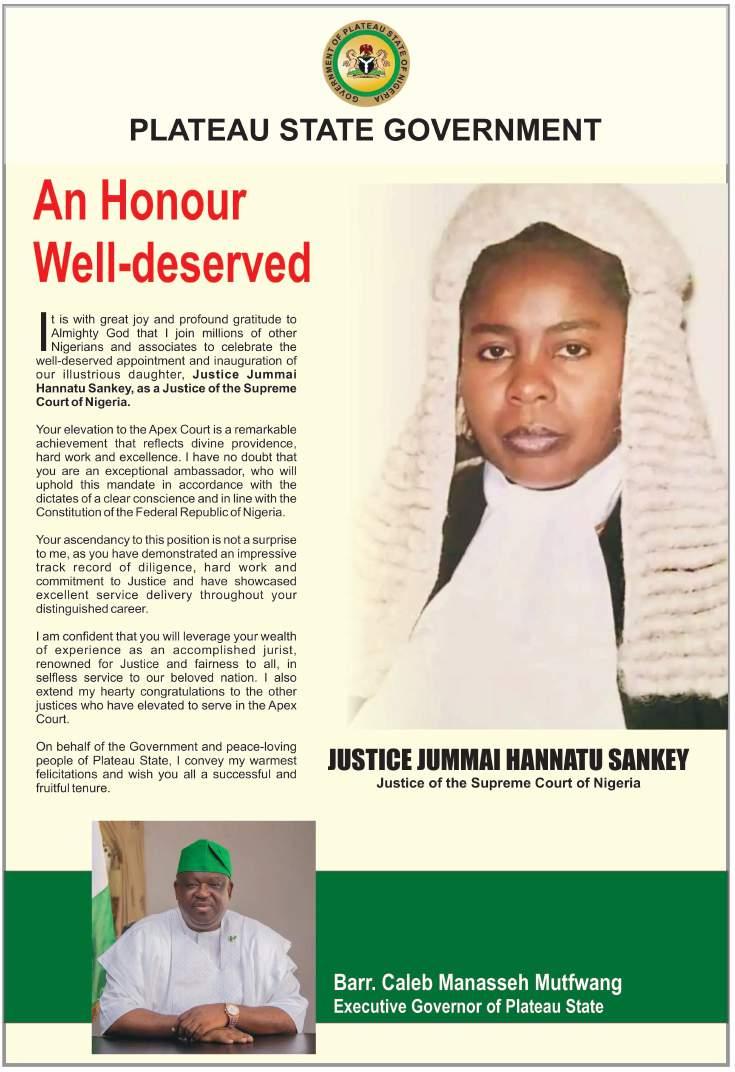
WEDNESDAY FEBRUARY 28, 2024 • THISDAY 21
FOCUS
Ikpea: There Will Be Light at the End of the Tunnel Amid Nigeria’s Economic Crisis
The Lee Engineering & Construction Company Limited, founded in 1991, has become a conglomerate dealing in retail, tourism, aviation, and manufacturing, including exploration and production. It has a fabrication workshop measuring 2,515sqm, complete with blasting/painting bays and state-of-the-art equipment. The company, Lee Engineering Group and Allied Companies Limited (including Lee Engineering, Tribet Ltd [travels and tours], Tribet Aviation, Tribet Purified Waters, and Lee Oasis), has at least 2,000 employees. Its Group Executive Chairman, Leemon Ikpea, has made a case for economic reforms of the current administration of President Bola Ahmed Tinubu, expressing optimism that there will be light at the end of the tunnel. Bayo Akinloye writes
Rather than protest, the Chief Executive Officer of Lee Engineering & Construction Company Limited preaches patience. Rather than revolt, Ikpea recommends resilience. Instead of fury, the oil and gas billionaire magnate encourages a futuristic outlook while admitting that the current economic hardship also exerts a toll on him and his businesses.
“I don’t see any reason for protest. The president has not spent up to a year in office. In every society, in any part of the world, if a reform is in place, some people will definitely suffer; the majority of the people will feel the impact,” the billionaire businessman explains.
He says, “However, that impact will not remain forever. After some time, light is seen at the end of the tunnel. In my mind’s eyes, the greatness of Nigeria is on the horizon: Nigeria will be great again. It is not uncommon to expect opposition, and it is apparent some are taking advantage of the situation.”
The Chief Executive Officer of Lee Engineering & Construction Company Limited sees a ray hope of hope amid Nigeria’s gloom, tranquility about overwhelming chaos and prosperity as millions of Nigerians grapple with poverty. His basis for hope is not unfounded. A self-made, ingenious oil and gas magnate reiterates his conviction that hard choices being made by the country today are a promissory note to a certain productive and prosperous future. Not many may share his conviction, but Ikpea says that if the federal government conscientiously implements his economic policies, there will be light at the end of the tunnel.
“If certain entities had enjoyed fuel subsidies for some time, the government could have put a stop to it to fix roads and the health care system and provide other essential services for the masses, but that did not happen,” Ikpea stresses.
“Right now,” the oil and gas guru notes, “we have a new administration in the saddle that decided that enough is enough and took a bold step to stop the fuel subsidy, promising to use the subsidy for infrastructure development and several other things for the benefit of the people.”
Ikpea mentions that “similar big mistakes were made in the past regarding the monetary reforms” and that “any damage done to a system or society usually takes time to fix,” urging his compatriots to allow for more time for the economic rot in the country to be fixed.
The Lee Engineering Company boss says, “My advice to Nigerians is to be patient. Personally, I feel the painful pinch of the reforms. It has to be endured with the hope and confidence that things will definitely return to normal. In the interim, we should all support the president and his administration. Normalcy will return sooner rather than later.
“No sacrifice is too small to make for one’s country. United States of America, Britain and other developed countries we have today, there were several sacrifices their citizens made to ensure the nations are where they are today. If we want Nigeria to be great and to become a developed nation, we must make some sacrifices.”
Besides oil and gas, Ikpea has keen eyes on aviation, and his company has continued to expand the frontiers of investment in the aviation industry.
“Our investment in aviation is yielding good results because we have positioned ourselves strategically despite some rising costs we have to incur. Our future goal is to add more aircraft to our fleet,” Ikpea tells THISDAY. “Therefore, we can look forward to providing job opportunities to Nigerians and offering air travellers better and more reliable flight options.”
On the subsidy removal, the business mogul emphasises the pain that must be endured to remove the elephant in the room and get the country going again. Ikpea admits there must be a tightening of the belt, albeit momentary.
“I think it’s a very hard decision. Everybody knows that. But if you look at it again, Nigerian oil is still one of the cheapest oil in the world. Yes, of course, people will suffer. But if we don’t suffer momentarily, how will enduring enjoyment come? It’s natural: work before enjoyment,” Ikpea reiterates. “Enjoyment will come.”
The Lee Engineering chief is convinced that the pleasure outweighs the present pains, calling on the rich and the poor to trust the process that promises prosperity, healthy competition in the oil and gas industry and other aspects of the economy. Ikpea notes that with the full deregulation of the petroleum industry, many players will be encouraged to participate in the market, driving up beneficial competition.
“We may suffer for now. Later on, the sun will shine again,” Ikpea insists.
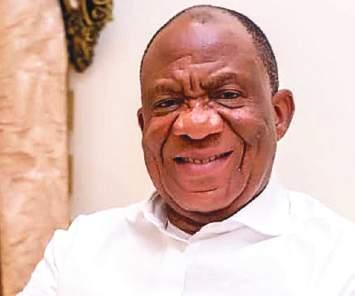
Amid Nigeria’s economic conundrum, the Lee Group has kept its momentum. “We have ongoing gas projects. Several of those projects will also increase revenue for the government. Those projects are ongoing,” Ikpea reveals. “We’re starting a new one, which will take about three years to complete. We signed that contract a couple of months ago.”
Notwithstanding the current exit of some IOCs, Ikpea said the ongoing construction of his multibillion-naira fabrication yard was a “foresight that was envisioned long ago, long before the federal government signed the local content development bill into law.”
“I saw the need for us to have this fabrication yard in place. I could imagine there might be times when it would be difficult to get foreign exchange. More important, the vision to create more job opportunties has always been there,” Ikpea adds. “Once this project becomes fully completed and the yard becomes operational, the multiplier effects will be massive.”
He reveals that the fabrication yard’s construction is nearing completion.
“With the progress made on the project, we are looking at its completion in the second quarter of the year to inaugurate the fabrication factory. Once that is done, we expect almost immediate patronage from the IOCs, other oil and gas industry players, and the government,” the businessman states. “One major impact is that it will allow the country to save a lot of foreign exchange.”
“The factory right now is the fabrication yard. The fabrication yard in Warri is currently undergoing a test run of all the equipment there. And between two and three months, the factory will be ready for inauguration,” adds Ikea. “We had informed the federal government, especially Mr President, to come and inaugurate this project. It’s a project that we will help to drive his dream through the oil and gas sector.”
Confidence in economic reforms
“I believe this current administration will surpass previous administrations’ achievements in this country. You can see some decisive decisions that have been taken so far. By the time Mr President’s cabinet is up and running, forming the Federal Executive Council, they will hit the ground running. I’m very optimistic,” the oil mogul notes.
While admitting that the new government has much ground to cover, he underscores the importance of removing the petrol subsidy, acknowledging its discomfitures but stressing its value and opportunities for national growth.
Ikpea also highlights the courage of Tinubu in swiftly removing the fuel subsidy, stating that several past heads of state had failed to successfully remove the cancerous subsidy regime.
“I think I share that we have to start from somewhere. If the government had continued to put in billions of naira to sustain the subsidy regime, it would be very difficult for this country to survive economically: the debt servicing is there. Add the servicing of debts to paying for the subsidy, then what is left for the country to survive?” the Lee Engineering CEO reasons.
A technocrat, Ikpea clearly understands the role of governance and policies and demonstrates his optimism about the Tinubu administration. He provides a basis for that optimism.
“Apart from Mr President’s track record: any human being that is highly criticised, any human being that is highly criticised, and negatively spoken of that individual come what may, usually succeed. The motivation to prove his critics wrong is very high. Those negative criticisms trailing him will serve as a wind in his sail,” says Ikpea. For him, the new administration is the “best government we would ever have.” Ikpea was quick to explain why.
“Yes, it will be one of the best governments we have ever had in Nigeria because the incoming administration has seen the mistakes in various sectors of past governments and the anger of Nigerians. I am sure the incoming government will put a smile on Nigerians’ faces,” the oil magnate states, pointing out that the president exudes the confidence of an astute politician and administrator.
When the federal government announced the unification of the foreign exchange market, it was greeted with mixed feelings. For the billionaire magnate Ikpea, floating the naira is in the best interest of Nigeria’s fiscal stability, admitting, “It will help. Initially, it will be very rough. So, let us also be patient with the government. Yes, they are making the right decision on the right move.”
The new government has unfinished business in the oil and gas industry, Ikpea says.
“But at the same time, the staff and the
people in the industry are first-class personnel because they’re well-trained. I could tell because I have been in the industry for 47 years,” he emphasises. “I have been following them right from the beginning. Nobody can steal a kobo in NNPC because their procedures are very strict, with meticulous attention to due process. The NNPC has become a well-structured organisation. It remains one of the best parastatals this country could ever have.”
The Lee Engineering CEO has a simple suggestion to keep the wheel of oil running.
“I will suggest the incoming government should do one, over 5,000km pipeline in this country. These pipelines were laid in the late 1980s. Calculate the years: it’s more than 30 years. There must be corrosion. The same pipelines have remained. They have not been changed, resulting in oil loss and stealing because criminals exploit the corroded parts of the pipelines to siphon large-scale quantities of oil,” says Ikpea. That leaves the government losing a lot of money. If the government could do the hard work, a lot could be saved for the nation’s coffers.
“It’s a lot of work to be done. If the government wants to avoid stealing, the pipelines have to be rejuvenated by fixing the badly damaged ones. They should create a good network of pipelines and bury them deeper into the ground. If the depth was three feet before, let them take it six feet down; that way, it becomes more difficult for potential oil thieves to unravel the pipelines and steal oil,” Ikpea notes.
He recommends high-powered surveillance that could nip criminal activities in the bud to make the hard work meaningful. He also believes careful consideration should be given to the pipelines and refineries, “along with that, there should be proper surveillance. They need to concentrate on the pipeline, and they need to concentrate on the refineries to ensure that the refineries are functional because if the refineries do not produce, we will continue to have problems.”
Ikpea’s focus remained on deepening the country’s success stories, facing the challenges and building bigger frontiers for national prosperity, stressing the matchless contributions of the Nigerian Content Development and Monitoring Board (NCDMB) to strengthening the hands of local players in the oil and gas industry.
He feels the NCDMB has a lot going for it and can only get better without undue interference and politicisation of the agency. Yet, Ikpea suggests the continued strengthening of the local content board for more successes to be recorded per indigenous capacity in the oil and gas sector.
“You know, if the government properly empower the local content board because they have limitations. More empowerment is needed in the local content board. They need competent people to run that department because that is the livewire of the unborn generation,” Ikpea explains. “If I am the government, the people who are there now will get another four years to put all their structures in place.”
He suggests that when “they put the necessary structures in place, anybody coming in will have a well-established structure and system to work with. The personnel at the local content board are very competent and committed, but they need to be empowered.”
Another measure the Lee Engineering founder urges the government to consider is consolidation.
“They should be given time to consolidate the structure being built by the board. The board is the future of Nigeria. It is the future of oil and gas. The local content board is training a lot of Nigerians. The skills capacity of Nigerians in the oil and gas sector has continued to increase,” Ikpea stresses. “The board is training a lot of Nigerians through Lee Engineering and other indigenous oil and gas firms.”
As a vibrant local player in a dynamic global industry, Lee Engineering has stepped up to the plate by acquiring marginal fields. By the time the company starts production, it will not need to import many resources into the country because it will use equipment manufactured in its fabrication plant, which is cost-effective. Ikpea will bring his 14 years of experience in the construction industry to bear.
His leading indigenous EPCOM (engineering, procurement, construction, operation, and maintenance) company, the Lee Engineering and Construction Company, has achieved several milestones and received numerous commendations, awards, and certificates from local and international organisations.
Ikpea also talks about the potential strides of Nigeria in the gas industry amid a challenging atmosphere that pervades Europe as Russia continues its violent aggression against Ukraine.
22 WEDNESDAY, FEBRUARY 28, 2024 • THISDAY
Leemon Ikpea

WEDNESDAY FEBRUARY 28, 2024 • THISDAY 23
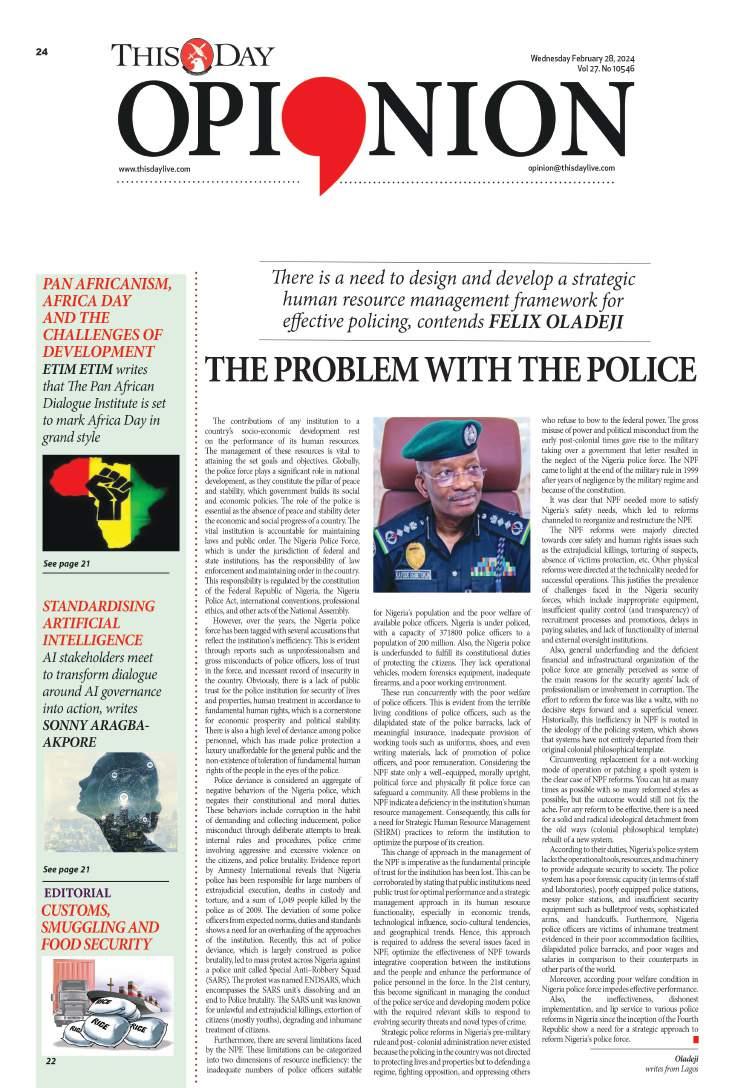
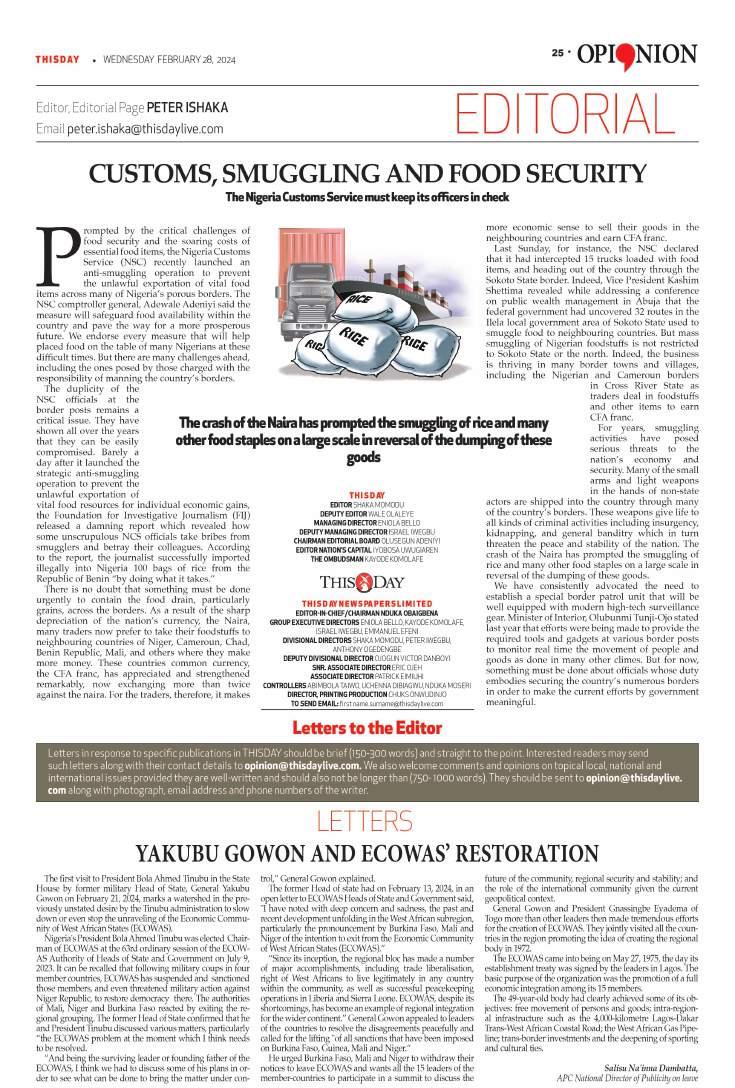
NeGSt-TAS Technologies, ERCAAN Partner for Digital Transformation in Real Estate Sector
Bennett Oghifo
NeGSt-TAS Technologies Ltd, a leading advocate for the integration of technology and eGovernment strategies across Nigeria’s public and private sectors, proudly announces a strategic partnership with the Estate Rent & Commission Agents Association of Nigeria (ERCAAN) to spearhead the digitization of the real estate industry.
This groundbreaking collaboration aims to establish a Digital Membership Registration & Identity Verification Solution platform tailored for ERCAAN, with key objectives including:
Biometric Enrollment: Capturing ERCAAN members’ biometric data into a secure digital membership register.
Credible Agent Database: Creating a database of certified estate agents endorsed by ERCAAN.
Instant Verification: Providing a seamless method for verifying members’ status with a simple click.
Client Identity Verification: Assisting ERCAAN members in verifying the identities of clients involved in real estate transactions.
Public Trust: Offering the public the assurance of dealing with trusted estate agents across
the country.
Utilizing NIMC Database: Leveraging the NIMC database for verifiable data to facilitate reliable decision-making processes.
NeGSt remains steadfast in its commitment to leveraging ICT tools to promote transparency, accountability, and sustainability (TAS) in both government and private sector operations, thereby combatting inefficiency, corruption, and wastage. The primary goal is to enhance service delivery for the benefit of the Nigerian populace.
With successful implementations already underway in key governmental bodies such as
Nigeria Prizes’ 2024 Competition Focuses on Climate Change, Children’s Literature
Bennett Oghifo
The Advisory Boards for The Nigeria Prize for Science, The Nigeria Prize for Literature and The Nigeria Prize for Literary Criticism, sponsored by Nigeria LNG (NLNG) Limited, have published the Call for Entries for the 2024 edition of the prizes, flagging off this year’s competitions.
A statement signed by the General Manager, External Relations and Sustainable Development, Andy Odeh, said, “The Nigeria Prize for Science recognises outstanding scientific
achievements by Nigerians and non-Nigerians and will focus on Innovations and Technologies for Reducing the Effects of Climate Change as the theme for this year.
“The Nigeria Prize for Literature, on the other hand, will focus on Children’s Literature.
The prize, which honours the author of the best book by a Nigerian, rotates among four literary genres, namely Prose Fiction, Poetry, Drama and Children’s Literature.
“The Literary Criticism Prize, which theme is on Children’s Literature, also aims to promote
Nigerian Literature, will receive entries on works in literary criticism of Nigerian Literature, especially critical essays on new writings in Nigerian Literature.
The Call for Entries for the Literature prize and Literary Criticism will close on 2nd April 2024 while the window for the science prize will close on 30th April 2024.”
He said, “The Science and Literature prizes, which are now in their 20th year, each come with a cash prize of $100, 000 while the Prize for Literary Criticism has prize money of $10,000.”
the Ministry of the Interior and Nigeria Immigration Services (NIS), where initiatives like the
e-immigration project have led to a remarkable 300% improvement in service delivery and government revenue, NeGSt is poised to replicate this success in the real estate sector.

L-R: Lagos State Chairman, Estate ,Rent and Commission Agents Association of Nigeria(ERCAAN), Mr.Kassim Adeshina; Chief Operating Officer, NeGst- TAS Technologies Ltd. Dr. Otuwehinmi Olayele ;President, ERCAAN, Mr.Godwin Alenkhe and Representative of Special Adviser to Lagos State Governor on Housing, Mrs.Temitope Akinbola at the unveiling of the National Biometric Registration and Database for Estate Agents in Lagos… recently
Rain as Test for Building Stability
Kunle Awobodu
Lagos recorded its first building collapse in year 2024 as members of Building Collapse Prevention Guild ( BCPG) were embarking on a Walk Against Building Collapse in Lagos. Worrisome coincidence!
The four-storey building ( having a ground floor and three suspended floors) under renovation located at No 1, Isale Gangan Street, Lagos Island fortuitously collapsed while members of Real Estate Developers Association of Nigeria were holding REDAN 2024 Annual General Meeting at Ikeja in Lagos. It could be very disturbing when a well-planned sensitisation walk scheduled for 8 am on Thursday, February 22, 2024
was welcome by torrential rain in the dry season. Act of God!
“Can this walk hold again with this rain?” A message (SMS) was received from the Lagos State Commissioner for Physical Planning and Urban Development, Dr. Abiodun Olumide who was to join the BCPG members for the Walk Against Building Collapse.
Surprisingly, the undaunted, resolute BCPG members from different BCPG Cells in Lagos State defied the rain and assembled at the take off point, Ikeja Local Government Headquarters.
As the intensity of the rain reduced considerably, the BCPG gathering, mostly constituted by professionals in the built environment and building artisans embarked on the long
Special Adviser Calls for Robust Real Estate Regulation in Lagos
Fadekemi Ajakaiye
The Special Adviser to the Lagos State Governor on Housing, Barr. Barakat OdunugaBakare has emphasised the significance of robust real estate regulations in the State, expressing optimism that the Greater Lagos Rising mantra of Governor Babajide Sanwo-Olu is achievable through collabora-
tive efforts and adherence to regulatory standards.
She stated this while delivering her keynote address at the Real Estate Outlook 2024 event organised by the Nigerian-British Chamber of Commerce (NBCC), themed “Looking Ahead, Gauging Opportunities”, aimed at providing a platform for stakeholders to explore prospects in the real
estate sector held on Monday via Zoom.
While emphasising the pivotal role of regulatory measures in fostering a conducive environment for real estate development in Lagos State, the Special Adviser stated that Real Estate regulation must be transparent to achieve sustainable growth within the real estate industry.
Underlining the commitment of the Lagos State Government to prioritise the housing sector as part of its agenda to propel the state into a 21st-century economy, Odunuga-Bakare highlighted the implementation of the Affordable Home Ownership Scheme, underscoring the importance of real estate regulation within the sector. In her presentation, she in-
formed the gathering about the establishment of the Lagos State Real Estate Regulatory Authority (LASRERA), a regulatory agency tasked with overseeing the activities of individuals and organisations operating in the real estate sector.
Odunuga-Bakare outlined LASRERA’s mandate, which includes issuing and renewing permit licences, investigating
walk that would terminate at the Lagos State Government Secretariat, Alausa, Ikeja. The messages on the banners were to sensitise the public on the need to adhere to standard building construction in order to prevent building collapse.
The Walk was also aimed at drawing the attention of the government to the astronomical rise in the prices of building materials that could tempt developers to compromise standard.
-Bldr. Kunle Awobodu is Advocate of Standard Building Construction; Past National President, Nigerian Institute of Building (NIOB); and Pioneer National President, Building Collapse Prevention Guild (BCPG).
complaints, eliminating unethical practices, and conducting training for industry professionals.
She lauded the collaborative efforts between LASRERA and federal enforcement agencies, stressing the imperative of restoring confidence and trust among local and international investors by combating fraudulent practices effectively.
Need to Channel Petroleum Subsidy Savings Towards Driving Green Growth, Sustainable Development in Nigeria
Chukwumerije Okereke
In a daring move, Nigeria’s President, His Excellency President Bola Ahmed Tinubu GCFR, declared the immediate abolition of fuel subsidies during his Inaugural Address on May 29, 2023, stating
quite simply that “subsidy is gone”. In the coming months, President Tinubu would go on to announce that the money from subsidy payments will be transferred to fund public infrastructure, education, health care, and jobs, among other critical
developmental requirements for the Whilecountry. the elimination of subsidies was praised as a key step in advancing Nigeria’s divestment from fossil fuels in the global climate change community, it remained unclear, indeed doubtful,
Mechanical Engineers Inaugurate 16th National Chairman
Bennett Oghifo
Nigerian mechanical engineers have emphasized their commitment to the professional development principles of its members in our continously evolving business landscape.
This was stated by the newly inaugurated 16th National Chairman of the Nigerian Institution of Mechanical Engineers (NiMech), Engr. Alhassan Abdul Mohammed, at the
weekend in Abuja. Engr. Mohammed succeeded the immediate past national chairman, Engr. Mrs. Olufunmilade Akingbagbohun.
He said the mechanical engineers institute must ensure that it’s members are equipped with the latest knowledge, skills and tools to thrive in our dynamic environment.
Engr. Mohammed said that as custodians of mechani-
cal engineering principles, among his focus would be the development of codes and standards that reflect the highest benchmarks of quality and safety.
He said it is the duty of mechanical engineers, known for their adherence to highest ethical and professional standards, to contribute to the formulation and enhancement of industry standards that not only meet but exceed global expectations.
whether this was the motivation for Nigeria’s decision. There is no denying that the decision to establish the Presidential Compressed Natural Gas Initiative (PCNGI)—an initiative aimed at promoting the widespread adoption of Compressed Natural Gas (CNG)-powered vehicles in Nigeria’s transportation system—will have an impact on the country’s greenhouse gas emissions and, as a result, will aid Nigeria’s net zero and decarbonisation efforts. However, much more is required to make the fuel subsidy programme serve Nigeria’s climate goals.
In thinking more holistically and systematically about how the elimination of petroleum import subsidies might assist in driving Nigeria’s climate action and ultimately position the country for long-term growth in line with global trends, one start in the right path is to set aside a specific percentage of
subsidy savings for a special ring-finance fund that can be used to fund investments and projects in climate adaption, renewables, and climate-smart innovation. This is the path to toe.
It is therefore our recommendation that a minimum of 20% of the savings from the subsidy removal regime be dedicated especially to climate-related infrastructure and investments. The fund can be deposited in the Climate Change Fund, which was established by the Climate Change Act, and administered as grants, subventions, allocations for infrastructure projects, subsidies for renewable energy and climate-smart agriculture, and so on. Some of the money can also be used as catalytic funding to leverage bigger investments in renewable energy investment from international public and private sector sources. Going by projected savings, this will
free up about N16bn annually for climate finance that can be used to drive sustainable development of Nigeria.
Parties to the international climate agreement at COP28 in Dubai, which the president and numerous ministers attended, committed to collaborate to triple the world’s installed renewable energy generation capacity to at least 11,000 GW by 2030. Despite Nigeria’s significant solar potential, with daily irradiation equivalent to more than a million tonnes of oil, far exceeding its oil and gas outputs, solar accounts for only 0.2% of installed capacity, making its contribution to the country’s energy mix almost insignificant.
-Chukwumerije Okereke is Professor of Global Climate Governance and Public Policy at University of Bristol, UK and President, Society for Planet and Prosperity, SPP, Nigeria
ProPerty & environment THISDAY • WEDNES Day FEBRUa Ry 28, 2024 26
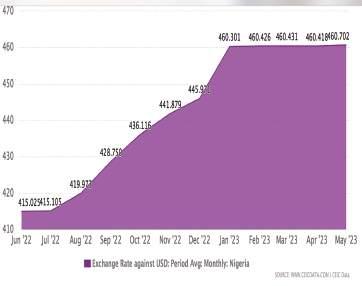
Sunday Ehigiator
Economic Expert and Chief Executive Officer, CFL Group, Mr. Lai Omotola has called on the federal government to criminalise possession of cash above $100 in the country as part of measures to address the foreign exchange crisis facing Nigeria.
While applauding the Central Bank of Nigeria (CBN) effort at finding solution to the crises, he proposed that President Bola Tinubu, sign an executive order banning all FX cash transactions across the length and breadth of Nigeria.
He urged the president to
Nume Ekeghe
In a promising turn of events, Nigeria’s foreign reserves have surged to $33.45 billion as of February 21, 2024, marking a significant four-month high.
This positive momentum comes amid persistent economic challenges and recent foreign exchange shortages that have been a source of concern for the nation.
Data released by the Central Bank of Nigeria (CBN) indicate that this figure represents the highest foreign reserves have
give a 90-day amnesty period for lodgment of excess FX in any citizen’s possession, activate the whistle-blower policy on possession of excess FX by any citizen, and also mandate economically vibrant states like the Federal Capital Territory (FCT), Lagos, Kano, Kaduna, Rivers and Enugu to go 100 per cent cashless.
Omotola who made this known in a chat with THISDAY in Lagos, said if his proposal is followed to the letter, FX will drop by 50 per cent within a month.
According to him, “The way the country is going and if we say it belongs to everybody, then we also should contribute to the
progress and betterment of the country.
“To save our naira, I am proposing that the president should sign an executive order, banning all cash dollar transactions across the length and breadth of Nigeria. All dollar transactions should now be bank-to-bank.
“The maximum cash any citizen and foreigner can hold should be $100. Any amount exceeding this would be automatically forfeited to the federal government. The total ban on street vending of dollars should also be included.
“Amnesty should be given to anyone paying dollar-cash for
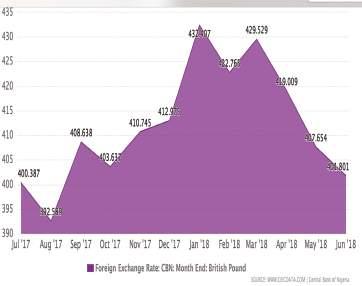
the next 90 days. People who have the dollar in their house and want to go and put it in the bank quickly should be given amnesty and such cash cannot be probed by the Economic and Financial Crimes Commission (EFCC) or any security agency. In as much as cash deposits cannot be probed, every dollar payment from the bank to the bank should be scrutinised.”
He added, “What I mean by scrutinised is that, whenever you want to make a dollar payment, you should be asked why you want to make that payment. There must be evidence of legitimacy. It must be a legitimate transaction, there must be evidence that what
your dollar transaction is about, is a legitimate reason, hence, you must show evidence of legitimacy. This is different from the dollar cash-lodging transaction which I said should be given 90 days amnesty and not be probed by EFCC.
“The government should also activate the whistleblower act, such that a reward is made to anybody that can tell the federal government about anybody with hidden dollars and such person receives his reward seamlessly. This would put everybody on his toes.”
“Also, the following states should go 100 per cent cashless; Lagos, Kano, Kaduna, Rivers,
Enugu, plus the federal capital territory. The maximum amount of cash anyone should hold within these states should not exceed N50,000. If the above is implemented to the latter, that also includes a stop or de-continuing the printing of the new naira notes, the new naira should not be printed, rather the old one.
“If all these things are done, within the next 30 days, the naira will appreciate by 50 per cent. That is within the next thirty days, you’d find naira moving between N700/$1 and N800/$1, in 30 days and by the end of the year, the true value of naira to the dollar will emerge. That is my solution, ”he said.
been in the past four months.
The last time such a robust level was recorded was on August 4, 2023 when the reserves stood at $33.46 billion.
Analysts believe this consistent increase in foreign reserves provides a glimmer of hope and suggests that concerted efforts to address foreign exchange shortages are making headway, contributing to the fortification of Nigeria’s external financial position.
“Despite the prevailing economic struggles, the surge in foreign reserves signals a
degree of stability, acting as a financial buffer that could pave the way for improved economic conditions, “they said.
The analysts added that the central bank’s proactive measures to manage and stabilise the foreign exchange market seem to be yielding positive outcomes, evident in the sustained upward trajectory of foreign reserves.
“The resilience displayed by the reserves is anticipated to be closely monitored by analysts and investors, potentially influencing market sentiment
and impacting investment decisions within the country, “the stated.
Meanwhile, analysis of the day-to-day movement of the foreign reserves for February showed that it sustained a gain although the month.
On February 5th, the reserves stood at $33 billion, experiencing a slight dip to $33.1 billion on February 8th.
However, a notable reversal in the trend occurred on February 13th as the reserves surged to $33.2 billion. This positive movement persisted, with
reserves climbing to $33.21 billion on February 14th.
Continuing this upward trajectory, February 15th saw another increment, bringing the reserves to $33.26 billion. The positive trend persisted through February 16th, with reserves reaching $33.29 billion.
February 19th witnessed a further growth as reserves rose to $33.39 billion. On February 20th, a subsequent increase was noted, with reserves reaching $33.41 billion before culminating in the four-month high of $33.45 billion on February 21st.
As Nigeria grapples with economic uncertainties, market watchers insist the foreign reserves serve as a critical indicator for assessing the overall health of the economy.
“The recent climb to a fourmonth high instils confidence and optimism, suggesting a potential turning point in the nation’s economic landscape.
“The coming months will likely see increased attention on how this positive momentum unfolds and its implications for Nigeria’s economic recovery, “they explained.
BUSINESS WORLD Group Business Editor Eromosele Abiodun Email oriarehu.eromosele@thisdaylive.com 08056356325 FX Crisis: Expert Urges FG to Criminalise Possession of Cash above $100 by Nigerians, Foreigners 27 RATES AS AT F E b R u AR y 27,2024 MONEY MARKET REPO S & P INDEX S & P INDEX EXCHANGE RATE OPR 11.25% CALL 19.12% INDEX LEVEL 611.31% 1/4 TO DATE -0.07% N795.28/ 1 u S DOLLAR* OVERNIGHT 11.50% 1-MONTH 16.25% 1-DAY 0.03% YEAR TO DATE 0.48% *AS AT M ONDAy, Ju Ly 24, 2023 3-MONTH 15.75% MONTH-TO-DATE -0.7% BONDS DESCRIPTION Price Yield Change (%) Updated Time ^13.53 23MAR-2025 97.23 16.43 0.01 February 27, 2024 ^12.50 22JAN-2026 93.59 16.54 0.00 February 27, 2024 ^16.2884 17MAR-2027 99.01 16.70 0,00 February 27, 2024 ^13.98 23FEb-2028 91.90 16.85 0.00 February 27, 2024 ^14.55 26APR-2029 92.36 16.80 0.00 February 27, 2024 Market data a s at t uesday, February 27, 2024 BILLS MATURITY Discount Yield Change (%) Updated Time NTb 7-Mar24 9.69 9.72 0.00 February 27, 2024 NTb 11-Apr24 13.00 13.21 0.00 February 27, 2024 NTb 9-May24 13.62 13.99 -0.01 February 27, 2024 NTb 6-Jun24 14.23 14.81 0.00 February 27, 2024 NTb 11-Jul24 15.00 15.88 -0.01 February 27, 2024 OTC FX FUTURES CONTRACT TENOR (MONTH) Contract Current Rate ($/₦) Updated Time 13M NGuS FEb 26 2025 – February 27, 2024 14M NGuS MAR 26 2025 – February 27, 2024 15M NGuS APR 30 2025 – February 27, 2024 16M NGuS MAy 28 2025 – February 27, 2024 17M NGuS JuN 25 2025 – February 27, 2024 CP S MATURITY Discount Yield Change (%) Updated Time FLOuRMILLS CP III 29-FEb-24 18.18 18.20 0.03 February 27, 2024 uACN CP VI 19-MAR-24 16.64 16.80 0.01 February 27, 2024 LFZC CP IV 16-APR-24 18.98 19.48 -0.02 February 27, 2024 MTNN CP VII 14-MAy-24 18.17 18.89 -0.05 February 27, 2024 uNCP CP VI 20-JuN-24 18.72 19.88 0.00 February 27, 2024 Nigeria’s Foreign Reserves Hit 4-month High of $33.45bn THISDAY • W EDNESDAy, F E b R uARy 28, 2024
BUA foods records revenue, Profit growth Amid Challenges
Kayode Tokede
Despite macro economic challenges, BUA Foods Plc posted a significant increase in revenue that drive profit and probably impacted shareholders’ return. However, the company has not announced dividend pay out to shareholders.
The food business with well diversified and scalable operations producing sugar, flour, pasta, rice and edible oils in its unaudited result and account for the full year ended December 31, 2023, declared the top-bottom line impressive performance to reflect effective management and cost efficiency.
In the period under review, the company declared N728.5 billion revenue, representing an increase of 74 per cent from N418.3 billion reported in the 2022 financial year (FY).
The revenue growth was due N421.5 billion generated from its Sugar business in 2023 from N275.2 billion reported in 2022, contributing 58 per cent to revenue in 2023 from 66 per cent in 2022.
Revenue from Flour segment rise to N216.9 billion in 2023 from N85.9 billion in 2022 while Pasta revenue rise to N87.9 billion, an increase of 54 per cent from N57.2 billion reported in 2022.
The increase in revenue is due majorly to price adjustments within the period. Volume sold increased marginally by five per cent to 635,519 tons within the period from 607,218 tons in corresponding period.
The growth in flour’s revenue is due both to volume increase and price adjustment within the period. Contribution margin also increased to 27 per cent from 18 per cent for the same period last year due to higher selling price.
On pasta division, the increase in sales volume is due to gradual commissioning of new pasta production lines. There was also a 16 per cent increase in production volume to 129,062 tons in 2023 from 111,577 tons in 2022.
In addition, rice division was debuted in 2023 contributing marginally to revenue. The total of N2.1 billion was generated from its operations. The challenges in the paddy supply chain for rice production affected the plans for full commercialization, however, we are working with local farmers to bolster the effectiveness of the paddy supplies and optimize operations in 2024.
However, the group reported N477.14 billion cost of sales in 2023, an increase of 67 per cent from
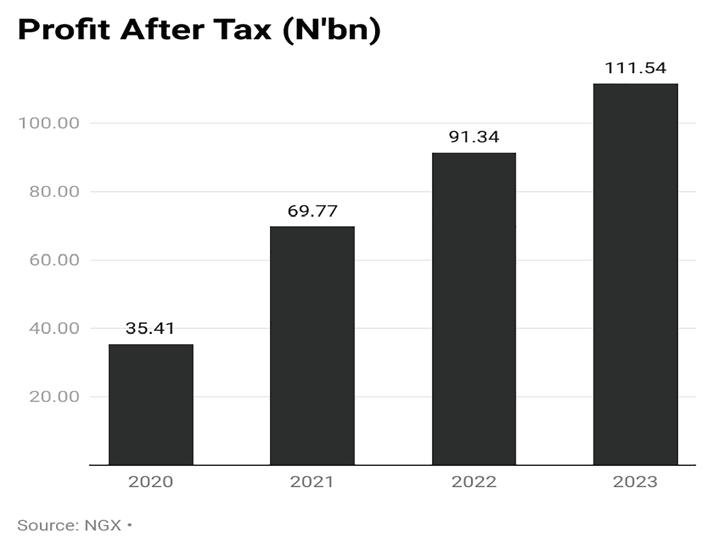
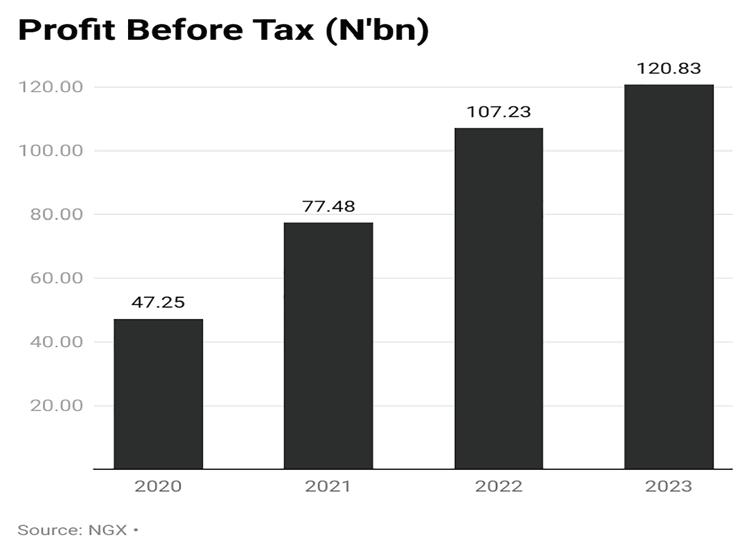
N285.55 billion in 2022, driven by an increase in raw materials cost and energy cost.
The high input cost environment and further devaluation of the Naira against the US Dollar weighed heavily on prices for raw materials. This resulted in higher cost of production.
BUA Foods saw its gross profit increased by 89per cent to N251.32 billion in 2023 as against N132.79 billion as gross profit margin appreciated by 280 basis points to 34.5 per cent in 2023 from 31.7 per cent due to the slight selling price adjustment within the year.
Total operating expenses increased by 20 per cent to N39.7 billion in 2023 compared with N32.9 billion in 2022 and it is on the back of increase in selling and distribution cost along the supply chain to customers.
The breakdown of total operating expenses revealed that selling and distribution expenses increased by 98 per cent to N28 billion in 2023 from N14.1 billion reported in 2022 and it is due to huge increase in cost of diesel within the period.
In addition to operating expenses, administrative expenses closed 2023 at N11.6 billion, a decline of 38 per cent from N21 billion reported in 2022, driven majorly by the decrease in general expenses (-58 per cent) to N2.23 billion in 2023 from N5.38 billion reported in 2022.
BUA Foods’s operating profit was at N213.2 billion in 2023, a growth of 82 per cent from N117.44 billion in 2022, from top line growth driven by price adjustment and volume increase due to capacity expansion for IRS.
It brings BUA Foods operating profit margin to 29 per cent in 2023 from 28 per cent in 2022.
The Group announced N18.89 billion finance charges in 2023, representing an increase of 116 per cent from N8.68 billion in 2022 as Finance Exchange loss was at N73.6 billion in 2023.
The group announced N120.8billion profit before tax in 2023, a growth of 12.6 per cent from N107.2billion reported in 2022 as profit before tax margin stood at 16.6per cent in 2023 from 25 per cent in 2022.
BUA Foods profit after tax grew by 22 per cent to N111.5 billion in 2023 from N91.3 billion in 2022, while the Earning per Share (EPS) grew by 22 per cent to N6.20 in 2023 from N5.07 in the corresponding period.
Total assets increased to N734 billion as of December 2023, representing an increase of 21 per cent from N607.2 billion reported in 2022, driven largely by strategic transactions in trade and other receivables.
The breakdown of BUA Foods’ total assets showed that total non-current assets increased to N358.9 billion in 2023 from N330.55 billion in 2022, while total current assets stood at N375.19 billion in 2023 from N276.67 billion in 2022.
The Group’s total liabilities increased by 25 per cent to N472.5 billion as of December 31, 2023 from N376.2 billion reported in 2022FY.
Total equity increased to N261.4 billion as of December 31, 2023 from N376.2 billion in 2022, mainly due to a significant growth of 13 per cent in retained earnings to N253.4 billion as of

December 31, 2023 (FY 2022: N222.9 billion).
Amid significant unaudited result and accounts for full year ended December 31, 2023, BUA Foods stock price has witnessed steady increase, closing February 25, 2024 at N379.9 per share.
This year alone, the stock price of BUA Cement has appreciated by 96.4per cent. The stock price opened for trading this year at N193.4 per share to reach its 52-week high February 25, 2024 at per share.
Reacting on the 2023 unaudited result and accounts, the Managing Director, BUA Foods, Dr Ayodele Abioye in a statement said: “This is a solid performance in the face of an unending challenging macro environment.
“BUA foods delivered strong growth despite the persistent devaluation of the naira during the period, which led to a substantial and negative impact of foreign exchange losses. Despite the margin squeeze on operating profit to 82per cent, our business remained resilient to deliver bottom line growth of 22per cent to N111.5billion.
“Our expansion strategies across all frontiers continue to crystallize in supporting growth. We remained committed to accelerating delivery in alternative and local raw materials sourcing across all our operating units, this is including the BIP project for sugar development as a softening opportunity to rely less on forex.
“As we look ahead, our integrated supply chain execution strategy will continue to be strengthened to sustain the delivery of growth across our financial metrics. We are confident in our plans for the year 2024 in the face of the business climate uncertainties.”
Stabilising Naira Amid Challenges
Nume ekeghe writes on the intricacies of the CBN’s policies, assessing their transparency, efficacy and impact on the Naira’s resilience in the face of complex economic realities.
The Central Bank of Nigeria (CBN) has over the past weeks issued several policies aimed at not just boosting liquidity at the foreign exchange market but also to curb excessive demand for dollars, as analysts believe that the transparency and effectiveness of these policies will be able to stabilize the naira.
These measures aimed at tackling forex liquidity challenges, curb excessive speculation, and enhance transparency, include the removal of allowable limit of exchange rate quoted by the International Money Transfer Operators (IMTO), liberating the IMTOs to quote exchange rates based on prevailing market rates at the Nigerian Foreign Exchange Market.
It had also issued another circular titled “Harmonisation of Reporting Requirements on Foreign Currency Exposures of Banks,” following concern over the growing foreign currency exposures of banks, highlighting the risks associated with holding excess long foreign currency positions.
Likewise, it issued a warning against providing inaccurate information in forex transactions and most recently barred international oil companies (IOCs) from repatriating 100 percent of their foreign exchange proceeds at once. According to the circular, only 50 per cent of forex proceeds can be repatriated at once as it noted that the practice which is known as “cash polling” has an impact on liquidity in the domestic forex market. The apex bank also stopped the issuance of personal and business travel allowance in cash.
According to Comercio Partners in its Macroeconomic Outlook 2024 titled, “Finding Rain in Drought,” whilst the naira may encounter ongoing volatility against major currencies, influenced by the pace of liberalization and the efficacy of measures addressing FX shortages, “Investor confidence and foreign capital inflows hinge on the transparency and effectiveness of these policies.
“A strategic and transparent management of FX reserves is imperative to instil confidence in the stability of the Naira and mitigate potential market uncertainties. Considering the multifaceted factors at play, a nuanced expectation for the naira in 2024 emerges.
“The impact of the new CBN governor’s
policies and the challenge of rising inflation introduce elements of uncertainty. The prevailing challenges, rooted in persistent FX shortages and an expanding exchange rate gap, demand nuanced policy adjustments. The efficacy of the CBN’s policies on FX liberalization, coupled with its strategies to manage the reserves, emerges as a critical determinant of the Naira’s trajectory.
“The Naira’s journey in 2024 is marked by a delicate balance between transformative opportunities and persistent challenges. The interplay of new CBN policies, acceleration of growth and the response to rising inflation will collectively shape the Naira’s resilience and stability in the coming year. Vigilance, adaptability, and strategic policy adjustments will be key elements in navigating the complex economic landscape.”
The report noted that the swift nomination and approval of Cardoso reflected a commitment to chart a new course for the nation’s economic landscape. “Cardoso wasted no time initiating reforms to address entrenched economic challenges. A pivotal move was the unification of FX rates, eliminating disparities between the parallel and official markets, thereby creating a unified market. This strategic step aimed to bring about much-needed consistency and transparency in the foreign exchange system, fostering an environment conducive to economic stability.
NAvigAtiNg the BACklog
Storm Experts posited that the considerable depreciation of the Nigerian naira is rooted in global economic shocks, including the aftermath of the COVID-19 pandemic and geopolitical tensions from the Russia-Ukraine war. These external forces, they observed, triggered adverse consequences such as heightened inflation, increased interest rates, and escalated import costs. Domestically, they are of the view that stringent foreign exchange policies and limited dollar inflows exacerbated the erosion of the naira’s value.
The prevailing dollar backlog, coupled with external challenges amidst global economic
uncertainties, casts a shadow of uncertainty over Nigeria’s economic horizon. As the backlog intensifies, there looms a growing risk of heightened pressure on the exchange rate. This ominous scenario is compounded by factors such as dwindling external reserves and capricious fluctuations in crude oil prices.
The experts also noted that the spectre of exchange rate strain introduces an element of volatility and uncertainty into the local bonds market. Local investors, cognizant of the potential impact of currency devaluation on their investments’ real returns, approach the market cautiously. Foreign investors, too, may choose to remain on the sidelines, navigating the turbulent waters with prudence.
As Nigeria charts its course through these economic headwinds, the path forward remains uncertain. The nation stands at a pivotal juncture, where the interplay of inflationary pressures, tightening measures, liquidity dynamics, and currency challenges will shape its economic destiny in the coming months. Investors, both domestic and foreign, watch intently, braced for the next chapter in Nigeria’s economic odyssey.
exChANge rAte
liBerAliSAtioN
A longstanding concern contributing to naira instability was the FX backlog. Cardoso took decisive action to clear this backlog, aiming to instil confidence in the market and stabilize the national currency. Beyond immediate challenges, he implemented a comprehensive set of reforms, introducing Regular Open Market Operations, adjusting treasury bills issuance, deposit structures, and the Cash Reserve Ratio. These measures collectively fortified the financial system, enhanced liquidity management, and aimed at fostering economic stability.
The persistent FX shortages, acting as a constraint on economic activity, have created a formidable challenge for exchange rate liberalization. Despite the commendable efforts by the Central Bank of Nigeria (CBN) to address these shortages, the widening gap between official and parallel exchange rates signals a complex landscape.
The recent policy shift, lifting the ban on 43 items and plans to clear unmet FX forwards, underscores a commitment to navigate these challenges. However, the resurfacing gap and the dwindling average daily FX turnover at the official window to USD95 million in September indicate the intricate nature of achieving a fully liberalized exchange rate.
The revelation of the CBN’s consolidated financial statements for 2022 has brought to light a nuanced understanding of the nation’s FX reserves dynamics. The decline from $37.1 billion at the end of 2022 to $33.2 billion in September emphasizes the intricacies at play. The opacity surrounding nearly $32 billion categorized as “FX forwards, OTC futures, and currency swaps” raises concerns about the transparency of the reserves.
While acknowledging the likely inclusion of non-deliverable contracts and longer-tenor commitments, the lack of a detailed breakdown inhibits a thorough assessment. Short-term liabilities, such as foreign-currency securities lending and FC forward payables, contribute to the layered complexities.
reformS tAke CeNter
StAge
Governor Olayemi Cardoso’s strategies, implemented over the past two months, aim at reducing excess liquidity, managing inflation, and fostering a stable economic environment. These include regular Open Market Operations (OMO), removal of the cap on the remunerable Standing Deposit Facility (SDF), sustained Cash Reserve Ratio. These measures collectively fortified the financial system, enhanced liquidity management, and aimed at fostering economic stability.
These measures have already shown positive results, with reduced excess liquidity in the banking system, an increase in the Overnight Bank Borrowing (OBB) rate, and a decline in month-on-month inflation. The commitment to continuous assessment and adaptation underscores the Central Bank’s dedication to navigating the intricate economic landscape and fostering sustainable growth.
NOTE:
28
on www.thisdaylive.com BUSINESSWORLD ECONOMY W EDNESDaY F EBRUa RY 28, 2024 • THISDAY
The story continue online
Cryptocurrencies as Threat to Financial Stability
James e mejo writes that despite their potential to deepen financial inclusion among others, cryptocurrencies pose significant threats to financial stability in the country, calling for stricter regulatory and supervisory regimes
The disruptive tendencies of cryptocurrency assets to monetary policy implementation were again highlighted recently even as the Naira struggled to stabilise against major currencies particularly the United States Dollar in recent times.
The Naira had been under unprecedented pressure following the critical reforms currently being implemented in the Nigerian Foreign Exchange (FX) market, which had been compounded by supply-side constraints.
However, crypto assets, especially Binance have also been identified as agents of financial instability in recent times given that the cryptocurrency space remained largely unregulated, a condition that makes them appeal to money-laundering and other financial crimes – as well as contribute to money-induced inflation in the economy.
Binance is one of the largest cryptocurrency exchanges in the world and offers a platform for users to buy, sell, and trade a wide variety of cryptocurrencies as well as offers services including deposit taking, withdrawals, spot trading, futures trading, margin trading, staking, lending, among others. It also offers its own native cryptocurrency called Binance Coin (BNB), which can be used to pay for trading fees on the platform and access various features within the Binance ecosystem. Over the years, Binance has grown rapidly and expanded its services to include a range of financial products and services related to cryptocurrencies.
UnhealThy CompeTiTion
However, Binance and other cryptocurrency exchanges pose immediate and potential risks to local or traditional currencies in several ways.
Cryptocurrencies traded on platforms like Binance can compete with traditional fiat currencies as a medium of exchange, especially in regions where there are concerns about inflation, government instability, or lack of trust in local currencies.
This is particularly true in the Nigerian experience where lack of confidence in the Naira had led to a near dollarisation of the economy, further fueling inflationary pressures and weakening the exchange rate.
If cryptocurrencies gain widespread acceptance and adoption, they could potentially diminish the importance of traditional currencies.
Furthermore, its global accessibility can bypass traditional financial systems and facilitate cross-border transactions, potentially reducing reliance on local currencies for international trade and remittances.
If anything, crypto assets have raised regulatory concerns and scrutiny from governments and central banks worldwide and some authorities view cryptocurrencies as a potential threat to financial stability, monetary policy control, and taxation. Regulatory actions or restrictions on cryptocurrency exchanges like Binance could affect their operations and limit their impact on traditional currencies.
VolaTiliTy and SpeCUlaTion
The volatile nature of cryptocurrencies, including those traded on platforms like binance, could further impact investor confidence in traditional currencies as high volatility may attract speculative behaviour, drawing investment away from traditional assets like fiat currencies, stocks, or bonds.
Although crypto assets pose challenges to traditional currencies, their impact varies depending on factors such as regulatory environment, adoption rates, technological developments, and public perception. Additionally, many governments including the CBN are exploring ways to incorporate blockchain technology and digital currencies, particularly the e-Naira into their existing financial systems, potentially mitigating some of the perceived threats posed by cryptocurrencies.
RegUlaToRy
inTeRVenTionS
Following concerns, the federal government recently reportedly restricted the operations of online platforms including Binance and other crypto firms to protect financial consumers from losing money and also safeguard the economy
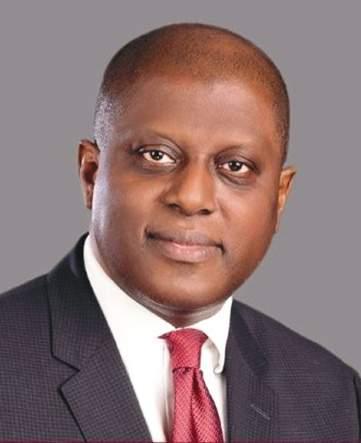
from speculative activities against the local currency amid the current challenges in the FX segment.
Despite their ability to enhance financial inclusion by removing the encumbrances in traditional financial system, they have also constituted real threats to the monetary authority. Given their disruptive tendencies, the CBN in February 2021 issued a circular restricting banks and other financial institutions from operating accounts for cryptocurrency service providers given the money laundering and terrorism financing (ML/TF) risks and vulnerabilities inherent in their operations as well as the absence of regulations and consumer protection measures.
However, last month, the central bank unveiled new guidelines to regulate the operations of bank accounts for Virtual Assets Service Providers (VASPs), otherwise known as cryptocurrency as current trends globally have stressed a need to regulate the activities of virtual assets service providers (VASPs), which include cryptocurrencies and crypto assets.
The framework provides minimum standards and requirements for banking business relationships and account opening for VASPs, and creates effective monitoring of the activities of banks and Other Financial Institutions (OFIs) in providing service for Securities and Exchange Commission (SEC) licensed VASPs/Digital Assets (DA) entities in the country.
Among other things, the document also seeks to ensure effective risk management in the banking industry with regard to the operations of licensed VASPs. The new guidelines followed the lifting of the ban that previously barred banks from operating accounts for crypto assets, although banks are still not allowed to hold or trade in crypto assets themselves.
CBN Director, Financial Policy and Regulation Department, Mr. Haruna Mustafa, in a circular addressed to banks and other
“Remittances to Nigeria via the Binance platform are rumoured to be in tens of billions of dollars annually, and research from Binance shows that 56 per cent of the adult population in Nigeria actively trade crypto monthly.
“Traditionally, diaspora remittances have contributed above $25 billion annually to the country’s FX position but with the emergence of platforms such as Binance, these remittances have dwindled.”
Shelleng said, “There have been recent accusations that speculators have taken hold of the Binance platform to manipulate NGN/ USDT prices, which have been the benchmark for Nigerian BDCs.
“However, it would be too simple and somewhat lazy to point the finger at Binance as the cause of the FX woes. That is merely one aspect that potentially contributes but in reality, the real causes of the FX have been a combination of poor fiscal and monetary policy management in the past, which continually eroded confidence in the Naira.”
Managing Director/Chief Executive, Dignity Finance and Investment Limited, Dr. Chijioke Ekechukwu, however, doubted the assertion that Binance or trading in other crypto assets was contributing to exchange rate volatility, since much of the crypto transactions are virtual. Rather, he also attributed challenges in the FX market to corruption.
He said, “Whether you are buying or selling or paying for assets or items, the payments are mostly made virtually.
The government shouldn’t shift from the root cause of this FX crisis. The root cause is over dependence on imported goods, limited exported goods, and excess imported goods.
“We have limited revenue in foreign currency, speculation, corruption among others. The kind of political activities in the country have added to the woes of this FX market, and that is where corruption has played a major role in creating scarcity and speculative demands.”
financial institutions, stated however, that banks are “still prohibited from holding, trading and/or transacting in virtual currencies on their own account”.
The apex bank said from the commencement of the regulations, financial institutions shall not open or permit the operation of any account by any person or entity to conduct the business of virtual/ digital assets unless that account is designated for that purpose and opened in line with the requirement of the guidelines.
analySTS’ peRSpeCTiVeS
Commenting on the dynamics of crypto assets on price and financial stability, analysts agreed that while such online platforms have the potential to improve and democratize access to finance especially for the vulnerable population, they on the other hands pose significant concerns for regulators.
They however, pointed out that Nigeria’s current FX challenges were more of structural factors than the risks presented by cryptocurrencies.
Wealth Management and Business Development Consultant, Mr. Ibrahim Shelleng, said the government especially the monetary authorities needed to relax some of the stringent and cumbersome policies that banks currently impose for FX transfers, as a way of boosting confidence in the Naira over Binance and the likes. He said if it becomes easier to transact via the traditional banking system and rates at par with the parallel market, then it may certainly encourage more customers to embrace the local currency, thereby helping it to appreciate against other currencies.
Shelleng told THISDAY, “In terms of its ability to provide an alternative form of FX liquidity and cross-border transactions, crypto has certainly succeeded in doing that, especially for a younger, more digitally-savvy generation.
Also speaking to THISDAY, a source who pleaded anonymity, said the key issue remained that the Naira had lost the attribute of money as a store of value, thereby enabling Nigerians with excess cash to buy either USD or crypto, rather than keep the Naira and see it deprecate in value on daily basis.
He said, “There is immediate therapy to the problem of currency crisis due to the fact that we are import dependent, limited exports, pointing out that most of crude sales receipts are impaired by either loan repayments or used to import PMS.
According to him, “Excess demand with limited supply of forex (weak CBN balance sheet) and above all endemic corruption further triggers and bolsters the BDC market. Addressing those issues is well documented.”
The source added that to fix the current situation with the local currency, the government must incentivise and boost local production for self-sustainable and exports, impose anti money laundering rules on all forex transactions, and improve hospitals to reduce medical tourism and foreign schools’ payments among others.
On his part, Managing Director/Chief Executive, SD&D Capital Management Limited, Mr. Idakolo Gbolade, said the operation of crypto assets remained a tool used by speculators to affect the constant devaluation of the Naira in conjunction with the BDCs. He called for strong and resolute regulatory interventions by the CBN.
He said the ease at which large ticket FX transactions are consummated on these platforms made it easy to be used for FX speculation.
Gbolade said, “The FX traders are using these Cryptos like Binance and the rest for the audacious assault on the Naira and without strong regulation with further worsen the position of the Naira.
“Amid the inflationary pressures occasioned by the usage of these cryptos, a strong regulatory framework needs to be put in place to ensure that they are accountable for suspicious transactions on their platforms.
“The recent clampdown on these cryptos by the CBN has started yielding results as Naira has regained strength against the US dollar.”
29
BUSINESSWORLD FINANCE W EDNESDAy, F EBRUARy 28, 2024 • THISDAY
Cardoso
Achieving Mass Insurance Patronage
Insurers at their CEOs’ retreat highlighted initiatives on winning public trust and credibility for mass patronage of insurance services amidst economic challenges, e bere Nwoji presents their views
Faced by lingering challenge of public mistrust culminating in dwindling patronage, insurance sector operators said they have embarked on a number of initiatives that would restore public confidence and trust in the insurance sector in order to engender mass patronage of insurance services.
But members of the insuring public have insisted that any of such initiatives devoid of prompt claims settlement is a ruse.
The insurers said these initiatives were holistically being implemented by all the arms of the industry with the target of genuinely addressing the critical issue of claims settlement especially prompt claims settlement and other critical issues that discourage Nigerians from buying insurance to enhance operators’ credibility.
Indeed, importance of claims settlement to the Nigerian insurance industry cannot be overemphasised.
NIgerIANs exPerIeNce
For every Nigerian that has no single insurance plan, when asked the reason for that he will tell a story of either his personal experience or the experience of a relative or friend with one insurance company or the other.
The story is often told that a policy was taken, premium paid but when claim occurred, the insurance company came up with interpretation of some clauses in the policy document which initially were not spelt out. The purpose, they stressed, was to see a way of wriggling out of the claims payment obligation.
Initially, insurers claimed that these stories were not true but mere weapon for tarnishing the industry’s image as they often argued that none of the people who told these stories has even owned up to have been directly involved but that the story will always center around their friends and relations who bought one policy or the other.
The insurers said they were waiting for one person that would own up and said he was directly involved in the case of denied or delayed claims.
cAse PoINt
But in recent times, some individuals have came up with glaring cases of their claims that were either denied or delayed by both ailing and healthy insurance companies.
For instance, few years ago, policy holders barricaded the entrance of Niger Insurance and Standard Alliance Insurance firms carrying placards, insisting that their claims must be paid by the companies. One of the policy holders confided in THISDAY that the annoying part of her own case was that the claims she was making was on an investment and savings related policy she purchased with the company with her premiums religiously paid for many years.
Shortly before that, both investors, staff and policy holders of Investment and Allied insurance (IAA) took the same action.
At a point, the investors converged for an extraordinary Annual General Meeting of the company to see a way of restrategising to forge ahead but before the meeting commenced, the then executive vice chairman of the company got a court injunction to stop the meeting and that was how everybody who gathered at Ibadan venue of the meeting dispersed with the policy holders who have one claim or the other fuming with traits of what to do if their claims were not paid.
These were cases in ailing companies against the backdrop of which the regulator cancelled their operational licenses and appointed receivers / liquidators for both companies.

clAIMs settleMeNt
Also among healthy companies, there are lingering cases of hanging claims enmeshed in controversies all of which work together to tarnish the industry’s image and frustrate efforts towards achieving the much orchestrated deepening of insurance penetration in the country.
This, coupled with recent government policies like the fuel subsidy removal, in no small measure depicted a picture of dwindling patronage of insurance products, including compulsory insurances.
For instance, statistics from the Nigeria Insurers Association (NIA) show that as a result of the 200 percent increase in the premium payable on Motor Third Party Insurance policy effect from January 1,2023, and the high cost of fuel due to subsidy removal, at the close of business in 2023, operators did not witness upsurge in number of vehicles for which the policy was purchased.
Motor thIrd PArty INsurANce
According to NIA Chairman, Mr Olusegun Omosehin, in the Nigeria Insurance Industry Data base portal where the association keeps record of number of motor vehicles that have genuine insurance cover, total number of 3.69 million vehicles were uploaded in the NIA portal in 2022 but in 2023, only 3.11 million were uploaded.
Section 68 of the 2003 Insurance Act says, “No person shall use or cause or permit any other person to use a motor vehicle on a road unless a liability which he may thereby incur in respect of damage to the property of third parties is insured with an insurer registered under this Act.”
It was against this backdrop that the insurers at their CEO meeting early in the year determined to restrategise by thinking out a number of initiatives that could boost public trust and encourage Nigerians to buy insurance.
“No person shall use or cause or permit any other person to use a motor vehicle on a road unless a liability which he may thereby incur in respect of damage to the property of third parties is insured with an insurer registered under this Act.”
The insurers regretted that despite the position of Nigeria as the biggest market in Africa in other commodities and services, in insurance the country is far from attaining the status of biggest market due to mass apathy to insurance.
NIA PosItIoN
Omosehin at a press briefing in Lagos lamented Nigerians’ lack of interest in insurance even the compulsory insurance. According to him, with the 200 per cent increase in Motor Third Party insurance, what Nigerians are paying on the compulsory policy is $10 whereas in a country like Liberia, the policy costs $100; in Niger, it costs $125 and the citizens comply. He said against this backdrop, the insurers have lined up a number of initiatives to broaden Nigerians’ views on insurance value.
According to him, the 10 year industry’s strategic plan was part of the initiatives. Describing the plan as transformation roadmap for both the regulator and industry operators, the NIA boss said this cuts across all layers of the industry involving NAICOM the regulator, the insurers themselves, brokers and loss adjusters .
He said in line with this plan, NIA has complied with NAICOM’s directive of publishing notices in the dailies inviting all policy holders who have any outstanding claims to come up with necessary documents for the purpose of collecting the same.
He said the association was monitoring to see any member who would not collaborate.
He also said the association was collaborating with Federal Government agencies in the enforcement of compulsory insurances, especially the agency in charge of insurance of public building and building under construction.
He said the insurers were also collaborating with Federal Ministry of Housing and Federal Fire Service adding that the effect the insurers were getting was impressive and would hopefully bridge the existing gap and increase insurance penetration.
He said this was why the insurers at their CEO retreat early in the year focused on winning the war on insurance penetration.
He said patronage of insurance by the people depended so much on how the people perceived insurance, was it as necessity or as what they could do without.
He noted that insurers have not explained insurance enough to the people that was why insurance was not prioritised by Nigerians. He said at this period of challenging economy, insurers placed so much value on the table for the people at payment of little premium as he urged Nigerians to have a change of attitude towards insurance in order to benefit from these values.
exPerts’ vIews
In his submission on claims payment at one of the claims advocacy conference organised by the Carefirst Consult in Lagos, the Managing Director, Grand Metropolitan Associates, Mr Reginald Egbuniwe, speaking on the topic, “What Insurers do When Claims are Reported,’ listed the complexities of handling some claims which he said were very important for consumers to understand.
He said there were differences between simple and complex claims, adding, “If you have a simple claim, the insurance company has to be notified. Once a claim is reported, the insurance company has to receive it, and make sure that whoever is reporting the claim has a policy with them. The claim has to be authenticated and when that is ascertained, a number will be allocated and a claim form is sent. This doesn’t take long. Depending on what is in the policy, it is expected that a claim should be reported in seven days, 14 days, or whatever.
Speaking, Fintech expert, Richard Ogunmodede said he was of the view that claims in insurance contract was best teacher therefore should be paid seamlessly. He highlighted the industry’s problems and the negative effect on its growth.
He said the problem was the leading indicator and that the impact was a liking indication. “If you want to manage something it is better to focus on the leading indicator because you cannot control or influence the liking indicator.
He added, “Insurance has been mispriced in Nigeria. There is a mismatch in the system. In the industry, you have bad insurers and bad consumers and so you have big systemic problems. Insurers talk all the talk but they never do the work. They just compete based on agreed premium and at a zero rate and the consumer assumes there are implicit guarantee that even when the insurer goes down, they will still get their indemnity so they don’t care about the rate too.”
He said the growth rate of the Nigerian insurance industry and its contribution to the nation’s GDP was very small and called on the operators to do something, especially on the issue of rate.
While narrating his experience with the Nigerian insurance industry, he said the process of getting claims paid was too cumbersome and called for a better way of doing it. Founder/ Principal Consultant, Carefirst Consult Limited, Mr. Gus Wiggle,on importance of claims payment in the struggle to popularise insurance in Nigeria said: “Claim will remain the anchor of insurance business and will remain on the front burner while communication will become the point of impact of expressing consumers’ impressions…”
30
BUSINESSWORLD I NSUR a N c E THISDAY • W EDNESDay, F EBRUa Ry 28, 2024

WEDNESDAY FEBRUARY 28, 2024 • THISDAY 31
CIBN, Banks CEOs, EFCC Join Forces in Anti-financial Crime Crusade
Nume Ekeghe
In a concerted effort to combat financial crimes and uphold ethical standards within the banking sector, the Chartered Institute of Bankers of Nigeria (CIBN), the Body of Banks’ CEOs, and the Economic and Financial Crimes Commission (EFCC) have pledged to collaborate closely in the fight against corruption.
The Executive Chairman of the EFCC, Mr. Ola Olukoyede, emphasised the collective responsibility of all stakeholders in tackling corruption during a meeting with representatives from CIBN and the Body of Banks’ CEOs.
He stressed that the fight against corruption is not solely the duty of the EFCC but requires
the active involvement of various institutions and organisations.
President/Chairman of Council of CIBN, Dr. Ken Opara in a statement reiterated the institute’s commitment to promoting ethics and professionalism within the banking industry.
He highlighted the mandatory Annual Ethics Certification Programme for bank staff and announced plans to establish a Banking School funded by the Body of Banks CEOs. This initiative aims to reinforce ethical practices and complement the EFCC’s anti-corruption efforts.
Representing the Chairman of the Body of Banks’ CEOs, Mr. Lamin Manjang, commended the EFCC for
its efforts in combating corruption and securing numerous convictions. He acknowledged the Commission’s dedication to justice and the rule of law, citing its record-breaking achievements in convicting perpetrators of financial crimes.
In response, Mr. Olukoyede expressed gratitude for the collaborative efforts proposed by CIBN and the Body of Banks’ CEOs. He welcomed the initiative to establish a capacity-building program for EFCC staff, aimed at enhancing their knowledge of banking and financial operations. Mr. Olukoyede emphasized the importance of adherence to ethical standards and pledged to review EFCC’s operational guidelines to ensure alignment with best practices.
Sterling Bank CEO Advocates for AI Development
Managing Director and CEO of Sterling Bank Limited, Mr. Abubakar Suleiman has said it is critical for the government and corporate bodies to pay attention to the development of Artificial Intelligence (AI) to remain competitive in the emerging global economy.
In a keynote address at the just concluded Innovate AI Conference in Lagos themed, “Adapting AI For Nigeria, Crafting Intelligent Solutions for Our Unique Landscape,” Suleiman warned that neglecting AI could jeopardize efforts aimed at enhancing business efficiency and national competitiveness. He said countries and companies failing to embrace AI risk falling behind, as AI-driven technologies offer the potential for significantly higher productivity.
He said, “If we fail to pay attention to artificial intelligence,
all our efforts at ease of doing business, national competitiveness will come to nought because those who deploy technology on this scale will be able to deliver higher productivity than we do. And for those of us in the private sector, the same way the country will become less competitive is the same way in which companies that fail to embrace AI will become less competitive and they will die.”
Highlighting the transformative power of AI, Suleiman underscored the need for nations to formulate sovereign AI strategies and foster ecosystems conducive to AI investment. He cautioned against the concentration of AI-driven wealth and power, advocating for intentional efforts to ensure equitable distribution and stability in the future.
He said, “Countries that do not have a sovereign strategy
around AI, those that do not have the ecosystem that attract investment in AI, those that do not provide the roadmap for people to develop this technology stand the risk of being carried away.
“If we do not domesticate this tool there is a high risk that while this technology has so much capability to enhance the capability of those who invested in it, those capabilities will be more powerful in reducing global inequality, improving global healthcare and giving access to higher quality education.
“It is true each time there is a major technological breakthrough, there is a shift in wealth and power. Some nations will become more powerful and richer and in most cases, when this power or wealth is concentrated in a few countries it leads to a shift in geo-politics.”
IEI Boss Assures on Commitment to Service Delivery
Ebere Nwoji
The Managing Director, International Energy Insurance, Mr. Olasupo Sogelola has assured members of the insuring public that the company was committed to improving its service delivery and expanding its footprint within the Nigerian insurance space.
He also disclosed that the company was repositioning and was set to be among the top three insurance companies in the country. Sogelola stated these at the commissioning of the company’s new head office at Ligali Ayorinde Victoria Island Lagos.
He said: “Repositioned for Growth” becomes more than
just a theme as we unveil our state-of-the-art office, designed to provide a conducive and collaborative work environment. The meticulously chosen location in Victoria Island reflects our dedication to maintaining accessibility and convenience for its clients, solidifying our position at the forefront of the insurance industry.
“The commissioning of our new office marks a pivotal moment in our journey. We are committed to repositioning the business for growth and excellence in service delivery and client satisfaction”.
He said IEI remains committed to providing top-notch services to clients across the
continent. We are positive in our ability to materialize this vision.
Tracing the history of the company, the IEI boss said IEI was Nigeria’s first energyfocused insurer. Established in 1969 as Nigeria Exchange Insurance Company Limited and evolving over the years, the company narrowed its focus to energy insurance in 2003 following its recapitalisation.
The Group Managing Director of Norrenberger, Mr. Tony Ede on his part said he was excited to have invested in IEI Insurance.
He recalled how NAICOM took over IEI, which led to Norrenberger investing and taking over the company.
Ajibode: LFZDC, Lekki Port Limitless Synergy for Economic Growth
Deputy Managing Director of Lekki Free Zone Development Company, Mrs. Bolatito Ajibodehas said that the Lekki Free Zone Development Company (LFZDC) is poised to become a significant economic engine room for Nigeria with the commencement of operations of the Lekki Deep Sea Port in 2023, which has resulted in a surge in local and foreign investment interests in LFZDC.
Situated less than 3 kilometers apart, the Lekki Free Zone is
primed to contribute to and benefit immensely from the new port’s operations.
According to Ajibode, “The opening of the deep seaport provides an immense opportunity for additional investments in the Lekki Free Zone. The proximity allow goods to move seamlessly, efficiently and fast between the port and the Zone.”
Recently, Lekki deep sea port welcomed CMA CGM -SCANDOLA, the largest
vessel to ever berth in Nigeria. During the event, Mrs. Ajibode intimated the audience that Lekki Free Zone is home to over 65 companies out of about 600 companies operating across the 52 Free Trade Zones in Nigeria. The zone has 15 other companies currently at various stages of plant construction. Consequently, Lekki Free Zone is therefore poised to generate the biggest business opportunities for Lekki Deep Sea Port.
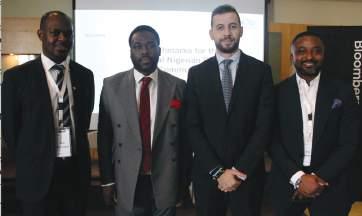
Money Market Indicators (in Percentage)
The price of OPEC basket of twelve crudes stood at $81.30 a barrel on Tuesday, compared with $79.70 the previous day, according to OPEC Secretariat calculations. The OPEC Reference Basket of Crudes (ORB) is made up of the following: Saharan Blend (Algeria), Djeno (Congo), Zafiro (Equatorial Guinea), Rabi Light (Gabon), Iran Heavy (Islamic Republic of Iran), Basrah Medium (Iraq), Kuwait Export (Kuwait), Es Sider (Libya), Bonny Light (Nigeria), Arab Light (Saudi Arabia), Murban (UAE) and Merey (Venezuela).
business/ MOn e YG ui D e • Monetary Policy Rate - 13% MARKET INDICATORS • Source - CBN MONEY AND CREDIT STATISTICS (M i LL i O n n A i RA) NOvEMbER, 24 Money Supply (M3) 72,014,274.74 -- Cbn bills Held by Money Holding sectors 1,245,804.25 Money supply (M2) 71,331,641.40 -- Quasi Money 45,146,611.59 -- narrow Money (M1) 26,185,029.81 ---- Currency Outside Banks 3,081,255.46 ---- Demand Deposits 23,103,774.40 net Foreign Assets (nFA) 32,212,549.50 net Domestic Assets(nDA) 58,300,995.27 -- net Domestic Credit (nDC) 39,801,725.20 ---- Credit to Government (net) 32,511,333.17 ---- Memo: Credit to Govt. (net) less FMA 0.00 ---- Memo: Fed. and Mirror Accounts (FMA) 0.00 ---- Credit to Private Sector (CPS) 59,737,156.08 --Other Assets net 4,720,308.20 Reserve Money (base Money 22,908,392.34 --Currency in Circulation 3,347,716.33 banks Reserves 19,560,676.02 special intervention Reserves 0.00
Month December 2024 Inter-Bank Call Rate 16.99 Minimum Rediscount Rate (MRR) Monetary Policy Rate (MPR) 18.75 Treasury Bill Rate 8.93 Savings Deposit Rate 5.28 1 Month Deposit Rate 7.24 3 Months Deposit Rate 7.56 6 Months Deposit Rate 8.42 12 Months Deposit Rate 9.75 Prime Lending rate 14.17 Maximum Lending Rate 26.62
OPEC DAILY b ASKET PRICE As At 24t H JA nu ARY , 2024 32 W e D nesDAY, F eb R uARY 28, 2024 • THISDAY
L- R: CIO, Access Pensions, Wale Okurinboye; CEO Pension Fund Operators Association of Nigeria (PFOAN, Oguche Agudah; Head of Enterprise Sales, Africa, Bloomberg, Wassim Zikara and CIO, Shell CPFA, Ehis Uzenabor at a Pension event in Lagos...recently
Kwairanga, Otudeko, Aig-Imoukhuede, Others Pay Tribute to Ogunbanjo
Kayode Tokede
The capital market communities, yesterday held an Afternoon Tributes and Closing Gong Ceremony in honour of its pioneer Group Chairman of the Nigerian Exchange Group Plc (NGX Group), Otunba Abimbola Ogunbanjo.
Otunba Ogunbanjo who served as the President of the National Council of the Nigerian Stock Exchange (NSE) from 2017 to
2021, passed away on February 9th, 2024, in the USA. Among the distinguished speakers who graced the occasion were: Chairman of Honeywell Group and former President of the Nigeria Stock Exchange, Dr. Oba Otudeko; Chairman of Coronation Group, Mr. Aigboje Aig-Imuokhuede ; Chairman of the Nigerian Exchange Group, Alhaji (Dr) Umaru Kwairanga and Group Chief Executive Officer of NGX Group, Mr. Temi Popoola
among other notable personalities. Giving his welcome address, the Group Chairman, Nigerian Exchange Group, Alhaji Umaru Kwairanga encapsulated the essence of Bamofin Ogunbanjo’s profound impact, emphasizing his pivotal role in steering the successful completion of the demutualization process within the Group. Kwairanga hailed Ogunbanjo as not merely a leader, but a beacon of light and a guiding force within the
community, underscoring his instrumental contribution to reshaping the Group’s trajectory in the West African sub-region. According to him, “His dedication to the advancement of our capital market is an unwavering commitment to excellence, and his profound impact on the lives of those around him are testament to his remarkable character and leadership.”
He noted that during the tenure of Otunba Ogunbanjo, the
group successfully completed the demutualization process embarked on by the past President.
“As we reflect on his life and legacy, we are reminded of the lives he touched and the countless minds he inspired, including my humble self.
“His memory will forever be cherished in our hearts. To the Ogunbanjo’s family, we extend our deepest condolences. We recognize the profound loss you have lost and we stand with you in this
time of grief,” he said.
Oba Otudeko shared poignant recollections of Ogunbanjo, portraying him as an adroit gentleman whose simplicity, brilliance, and doggedness were instrumental during the demutualization process.
Aig-Imuokhuede, reflected on the unparalleled commitment demonstrated by Ogunbanjo throughout the demutualization process, extolling his remarkable service to the industry.
PRICES FOR SECURITIES TRADED ASOF FEBRUARY /27/24
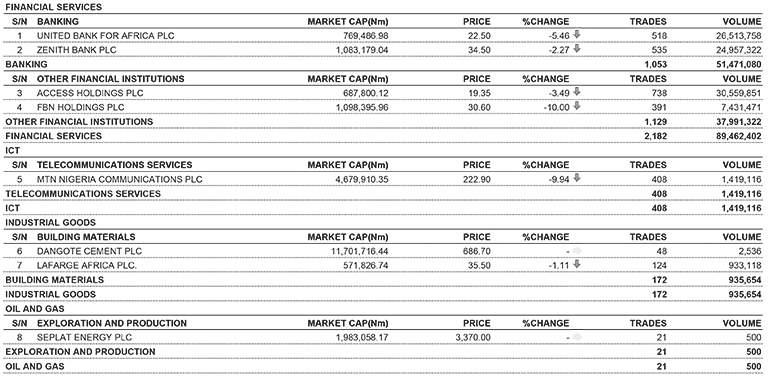
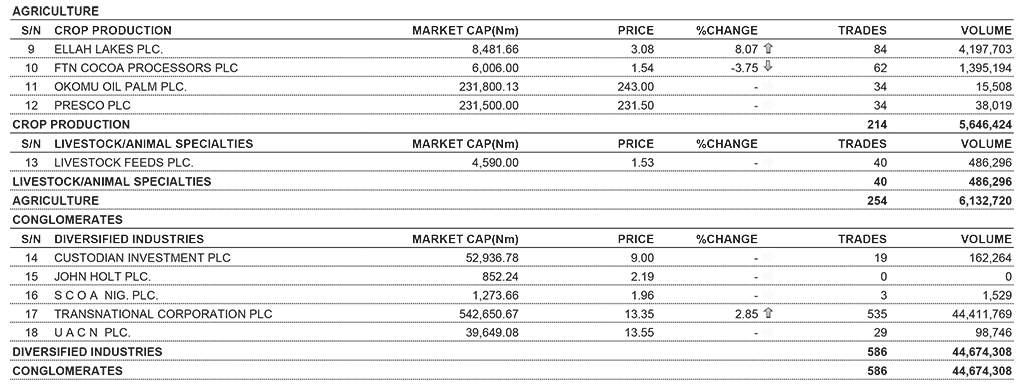
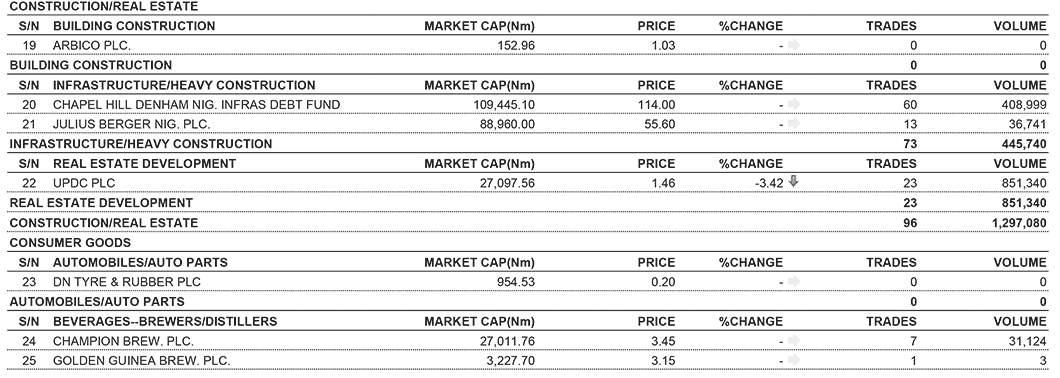
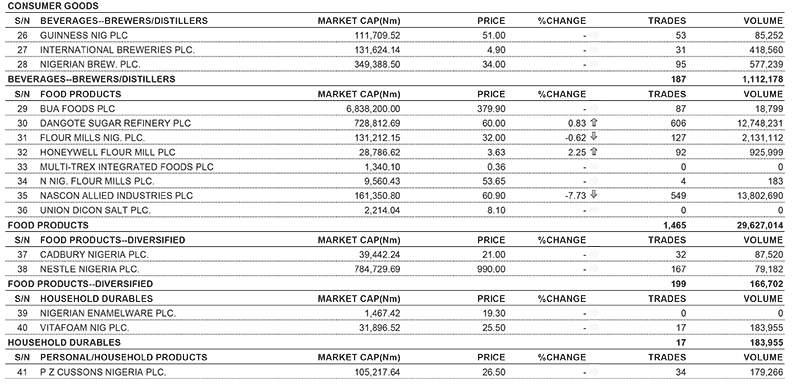

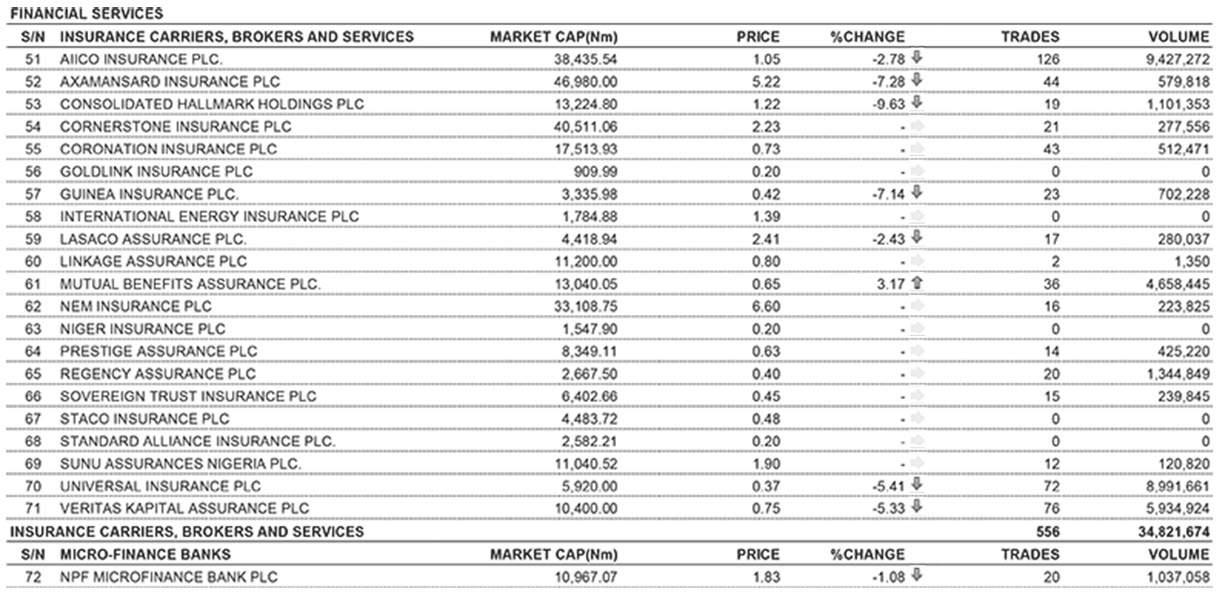

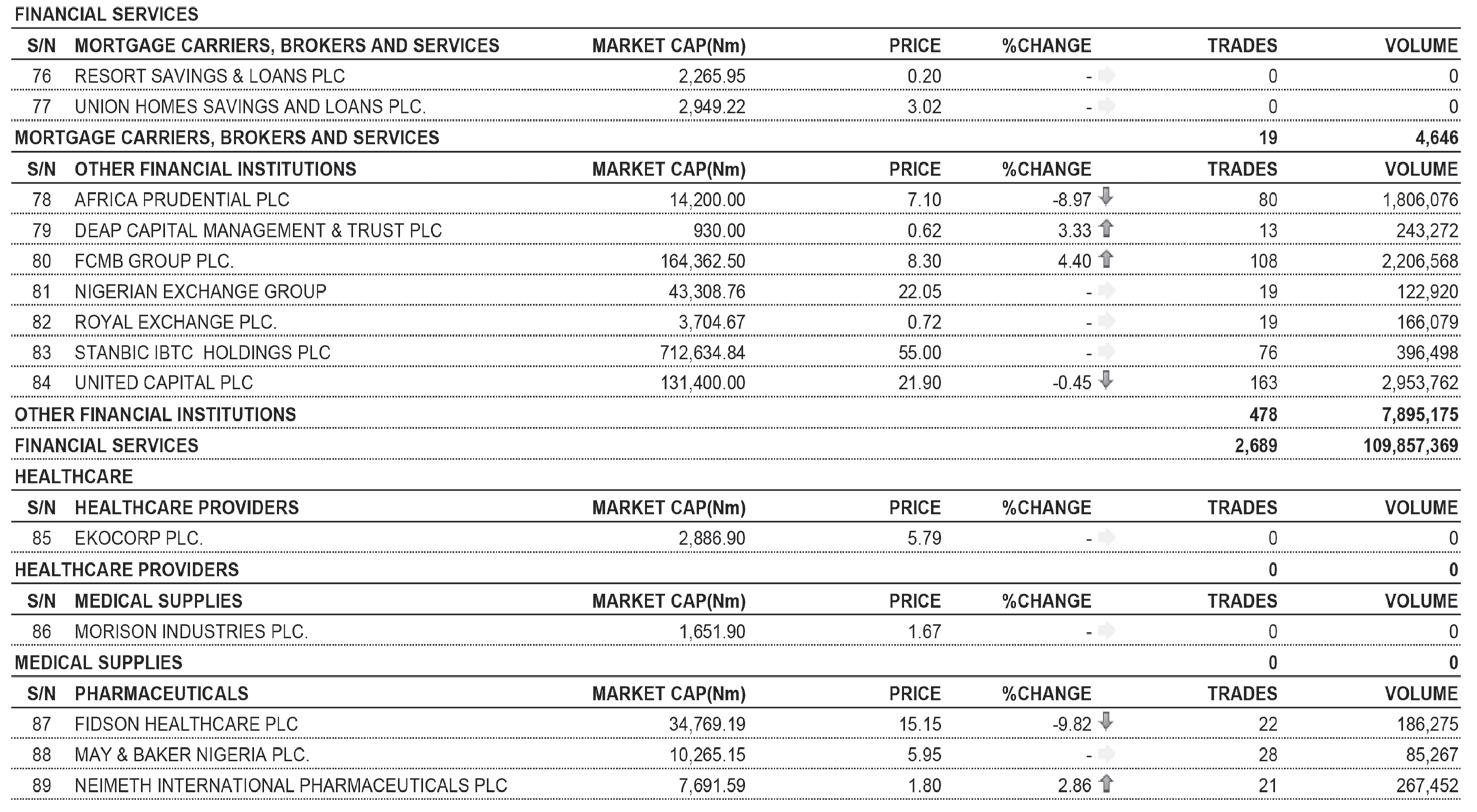
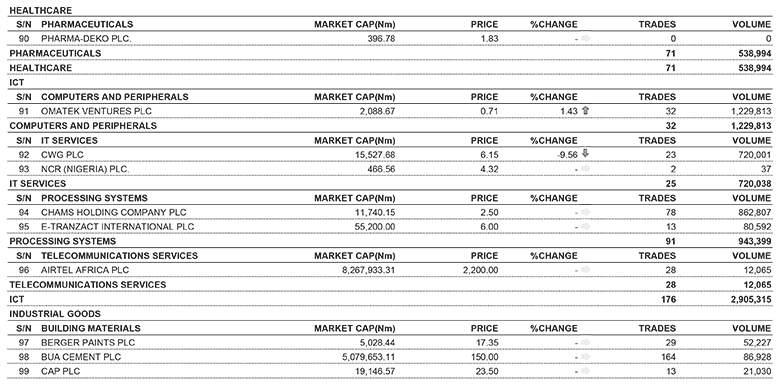

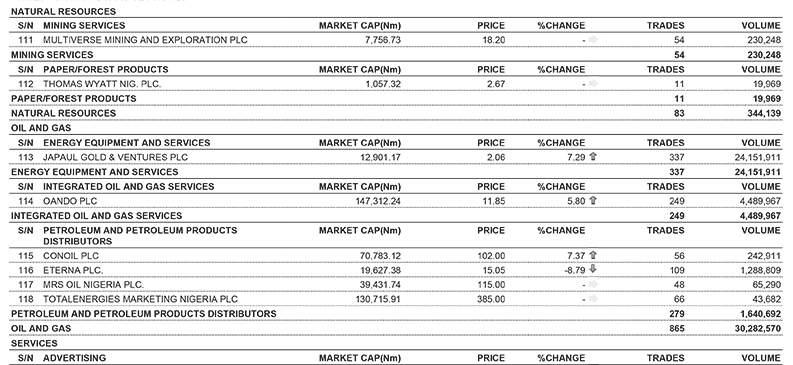
mARKET
NEWS
33 WEDNES DAy, FEBRUARY 28, 2024 • THISDAY
MAIN BOARD DEALS MARKET PRICE qUANTITY TRADED vALUE TRADED ( N ) MAIN BOARD DEALS MARKET PRICE qUANTITY TRADED vALUE TRADED ( N )
How Azura Power is Serving as Model to Champion Sector Reforms
To tackle issues of inadequate supply of electricity in Nigeria, the Minister
Power, Adebayo Adelabu has said Azura Power West Africa should serve as a model on how power generating plants should operate in the country. Precious Ugwuzor reports
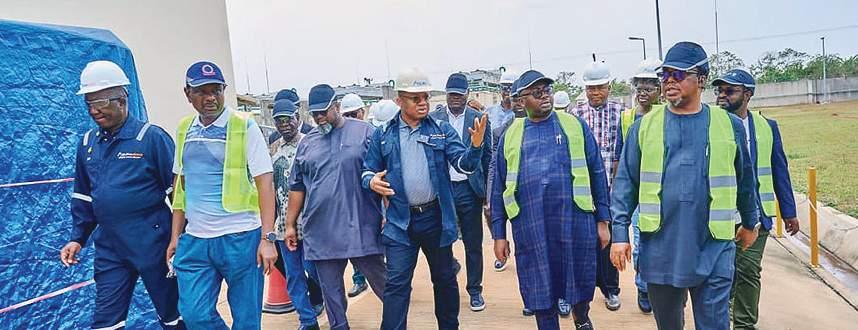
Amidst lamentations on the inadequate supply of electricity in Nigeria, the Minister of Power, Adebayo Adelabu has said Azura Power West Africa should serve as a model on how power generating plants should operate in the country.
The minister made this declaration in Benin City during a working visit to Azura Power Plant, as part of the federal government's deliberate plan to ascertain reasons behind the low power output in recent times.
He said Azura Power Plant is operating at optimal capacity and feeds the national grid daily with about 460 megawatts of electricity.
"On the contrary however, in terms of generation, when I got to Azura Edo Power Plant, I was more than impressed with the model they have deployed. It's a private sector power plant, and I can tell you that with the three turbines installed here with a command capacity of about 460 megawatts, all of them are operational generating 430 megawatts.
"They don't have issues of gas supply, they don't have technical issues, they don't have issues of breakdown of turbines and they don't also have operational logjam, that is the way things should run in Nigeria.
"I am very satisfied with their operations , the turbines are new and they have an expansion plan to install additional three gas plants of equivalent capacity and upon that there are plans also to install steam plants. At the end they are looking at an expansion of about 1,500 megawatts and if that happens here that means that the issue of shortage in power supply will be history."
Adelabu noted that the company has firm gas supply contract and the major difference between Azura power and other power plants is the fact that they are able to meet their obligations with gas suppliers as at when due.
"They don't owe suppliers so if I am a gas company, my efforts and loyalty will be to the company that pays promptly, so we are going to use that as a model to restructure and engineer all federal government owned power plants to ensure that the same template is applied into projects that are ongoing across the country."
The minister challenged players in the industry to be more patriotic in their dealings with government, saying the current short supply and significant decline in the generation of electricity is caused by the inadequate supply of gas, urging owners of power plants to adopt the model of Azura by paying and purchasing gas to ensure hitch free supply from gas companies.
According to him, beyond the push and intervention by government, industry play-
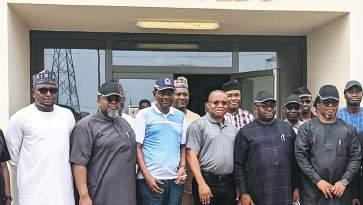
replicated across the sector to fast track the needed development in the generation, transmission and distribution of electricity in Nigeria.
Okeke said the company constructed a gas station within the power plant to ensure steady and uninterrupted supply of gas to power the turbines, describing the generation of electricity as real time business that requires competence, expertise commitment and above all patriotism to the country.
Azura Edo was built by a consortium composed of Siemens and Julius Beger in exactly 28 months, its completion occured eight months ahead of its 36 months construction schedule, and without a single lost time injury.
As a result of this best in class construction performance, Azura Edo IPP has become a performance benchmark for other large scale infrastructure projects across the African continent.
The plant was commissioned in the first quarter of 2018 and attained full commercial operations, since then the plant operational performance has been amongst the highest of any new built plant any where in the world.
Its availability rate to date has exceeded 94 per cent, and its equivalent forced outage rate has been lower than one per cent.
ers have a big role to play as clearly demonstrated by Azura, not defaulting in ensuring that daily production and supply to the national grid is sustained uninterruptedly.
"We know there are factors militating against generation which is gas supply, but let me announce to you that there is huge progress being made as President Bola Ahmed Tinubu has mandated the Ministry of Finance, the Ministry of Budget and National Planning and the Ministry of Power to work out modalities to defray outstanding debt to gas suppliers and generation companies in the power sector. He stated that in no distant time it will come out with a repayment plan and guarantee instruments and as well allow gas companies to access federal government gas wells in order to settle debts owed by the government.
"Very soon, effective and consistent gas supply will resume to enable power
plants operating below capacity to improve in the generation component of the power sector value chain," he added.
Earlier, the Managing Director Azura Power West Africa, Engineer Edu Okeke disclosed that the power plant was built and completed eight months ahead of schedule because of the technical expertise of the construction team and because of the commitment and patriotic style of the company.
He said the completion of the project schedule is first of its kind in this part of the world, adding that the operational metrics of the company guarantees quality and speed in service delivery.
"Our operational metrics are best in class and availability close to 100 per cent at all times, we help to stabilise the grid to make sure that other power plants are able to feed on what is available, we also believe that our model is the model to go in order to eliminate in entirety the challenges associated with inadequate supply of electricity."
According to him, the competence and experience of Azura over the years can be
Very soon, effective and consistent gas supply will resume to enable power plants operating below capacity to improve in the generation component of the power sector value chain
The plant is also Nigeria's most heavily despatched, with rates averaging 90 per cent, during the last four quarters, in other words, each of the plant 's three turbines are constantly in operation and generating power as close to their maximum capacity. The Transmission Company of Nigeria (TCN) also rely heavily on the plant's PFI capability to stabilise the grid at all times.
However, the majority and controlling share holder in Azura is Actis LLP, a specialist emerging market growth Capital investor in London. Actis has raised $15 billion from global investors of which more than $3 BIllion has been deployed in Africa across 19 countries. It has a specialist team investing and operating in the power sector, in its global markets which has committed $5 BIllion to energy investments across more than 25 countries.
Actis power sector investment accounts for around 20 GW of electricity generating and distribution capacity delivered to over 88 million customers worldwide.
Consequently, during the six years in commercial operation, the company has provided above nine percent of the power sent to national grid.
Azura devotes $1 million annually for its Corporate Social Responsibility (CSR), known as the Power to Change initiative aimed at transforming the lives of people through sustainable livelihood, sustainable health, sustainable education and sustainable infrastructure.
FEaturEs Group Features Editor: Chiemelie Ezeobi Email: chiemelie.ezeobi@thisdaylive.com, 07010510430 34 THISDAY • WEDNES Day FEBRUa Ry 28, 2024
of
R-L: MD NDPHC, Chiedu Ugbe; Minister of Power, Adebayo Adelabu; MD Azura Power, Edu Okeke; MD TCN, Abdulaziz Sule; Chief Technical Adviser to Minister of Power, Adedayo Olowoniyi; Head Corporate Affairs Azura Power, Murtala Bello during the Hon. Minister's visit to Azura Power Plant in Edo State
R-L: MD NDPHC, Chiedu Ugbe; Minister of Power, Adebayo Adelabu; MD Azura Power, Edu Okeke; and MD TCN, Abdulaziz Sule during a working visit of the Hon minister of power to Azura Power Plant in Edo State
WSCIJ Report Pushes for More Female Presence in Newsrooms, Leadership Positions

 Juliana Francis
Juliana Francis
The Wole Soyinka Centre for Journalism (WSCIJ) on Thursday the 15th of February 2024, launched a report, which revealed the shocking gender disparity in newsrooms in Nigeria, demanding intentional bridging of these gaps.
The report, tagged, “Who leads the newsrooms and news? A report on women’s representation newsrooms and news leadership in Nigeria,” brings to the fore, the reality of the ongoing conversations across the globe on issues relating to gender disparity in the media industry.
The report presents findings from a study that examined the extent of gender representation in newsrooms and news leadership roles across various Nigerian media organisations.
The study was carried out with funding support from the Bill and Melinda Gates Foundation, under the Report Women! News and Newsroom Engagement project as a tool of engagement with the staff and management of media houses.
An excerpt of the report states thus: “The study revealed that women's representations in media leadership are low across the four media genres. Women accounted for 25.7% of leadership positions, while men dominated with 74.3%. Print and online platforms exhibited the lowest representation of women at 4.6% and 5.5% respectively, while radio and television showed slightly better representation at 9.2% and 6.5% respectively.
“Geographically, the Southwest and NorthCentral had the most women in leadership positions, but they ranked lowest in percentage representation. The Northwest and South-South led in gender-balanced leadership with 31.2% and 28.5% representation respectively.”
Similarly, in terms of news representation, the study discovered that women were inadequately represented.
" Only 24% of anchors and authors were women, with men making up 76%. Men also dominated as expert resource persons or guests, comprising 87.9%, while women constituted just 12.1%. Furthermore, only 7.1% of news focused on women, while 92.9% covered other angles.
According to the WSCIJ, “To foster a more diverse and equitable media landscape, proactive measures are needed to enhance gender inclusivity and empower women within the industry.”
The Director of Daily Trust Foundation, Dr


Theophilus Abbah, who reviewed the 90-page research document, opined that it provided evidence of the lop-sidedness in the media industry, stressing that “it holds a mirror to the face of media owners, media executives, and newsroom leaders, showing an error that needs to be corrected and mistake of gender imbalance in the news business.
"A mistake because there are no gender norms in the media business. Nowhere are we told what roles are reserved for men or women in the media business, unlike in other areas in our cultural experiences.”
Speaking on the way forward to the concerns raised in the report, Abbah stated: “The research has made several recommendations, which are relevant. It’s a call on media organisations to be deliberate in ensuring that more women are given leadership roles in the newsroom, and more female newsmakers are sourced and featured in the news.
"Other recommendations are to implement gender parity policies, improve representation of women in news reporting, increase female expert sources, promote gender-sensitive reporting and engage stakeholders.”
Abbah also recommended that qualitative research should be conducted to explore why the numbers are lopsided, without which, it might be difficult to solve the problem of gender imbalance in the newsroom.
He added: “For instance, it is good to know the following, How did the 32% in leadership positions in the media climb the ladder up? What can other women and media organisations learn from them? Why do boards of media organisations appoint more males than females to leadership positions? Why do editors feature more male newsmakers than female newsmakers in their publications?
“What kinds of training must women be exposed to qualify for leadership positions in the newsroom How do pressures for the roles women play in their homes affect their growth prospects in the newsroom?


“Some of these questions could be answered through other research methods, separate from numerical data. Interviews and focus group discussions could bring out a lot more information that could complement the outcome of this research, to change the imbalance in female representation in the newsroom.”
He urged the WSCIJ to circulate the report as widely as possible to media organisations. “Like every other kind of advocacy, the struggle for gender equity in the newsroom should not end with one activity; there must be multiple activities on diverse fronts until the change for equity becomes irresistible,” Abbah emphasised.
The Deputy Editor of The Eagle Online, Ms Juliana Francis, a member of the team of journalists and media managers who collected data on the gender composition of the board and management of 111 media organisations that gave birth to the report, said she was proud to be part of it, despite challenges encountered while gathering the data.
She opined that the very detailed report was designed to push for an increased representation of women in news coverage and newsroom leadership.
She further said: “This report is a reality of what many of us have been debating for years now, the under-presentation of women, not just in our newsrooms, but leadership positions. This report can now be used to engage the leadership of media organisations, pushing for an increase in the representation of women in news coverage and newsroom leadership.
“The report and data therein can be used to enrich and validate stories on gender disparity in our newsrooms. More women in leadership positions will encourage other female reporters to aspire to excel, rather than many feeling that no matter how hard they work or do not work, they’ll never go beyond reporters and presenters.”
She also urged women to speak out against erroneous beliefs that hinder women's promotions to leadership positions, which is that women are difficult and tiresome as bosses. Another erroneous belief being perpetrated is that most women do not like speaking to journalists, let alone as expert sources.
She advised journalists to cultivate habits of seeing female reporters who have covered a beat for years as expert sources and speak to them as such.
She further advised media organisations to be very deliberate in their policies to catapult women


into leadership positions and put them on beats usually reserved for their male counterparts.
“Leadership positions should not be seen or perceived as exclusively reserved for the boy’s club,” said Francis.
The Executive Director of Media Career Development Network, Mr Lekan Otufodunrin, reacting to arguments that there are not enough women in the newsrooms and management positions because of the job demand, especially working late hours, said technology has taken care of mundane excuses.
He said: “We need to begin to see how we can demystify newsroom work and leverage technology. During COVID-19, many newsrooms ran their newsrooms without being in the newsroom. If we make use of what technology makes possible, we’ll realise that it’s not about being present in the newsroom, but being able to deliver.”
He argued that with technology, a female journalist can work from anywhere as a manager. “Being a media manager doesn’t mean staying late in the office or working till 2:am. Media organisations need to begin to make use of what technology has made possible by holding virtual meetings and working remotely. If we do that, we’ll eliminate the argument of women managers not readily being available to work,” said Otufodunrin.
He noted that one major problem confronting the media industry concerning the underrepresentation of women in the newsroom is that of having many females in mass communications classrooms across schools, yet such numbers are not reflected in newsrooms. He described the situation as “a crisis.”
Otufodunrin, who lectures at the Nigerian Institute of Journalism (NIJ) in Ogba, Lagos State, said that many female students studying mass communication, do not have the intention of becoming journalists.
He recalled that a manager of a radio station told him that when their organisation conducted an interview recently, it was discovered that many ladies applied to be broadcasters, thinking in terms of being On Air Personalities (OAP), not thinking of news writing or editing.
-Francis is the Deputy Editor of The Eagle Online.
features 35 THISDAY • WEDNES Day FEBRUa Ry 28, 2024 NOTE: Interested readers should continue in the online edition on www.thisdaylive.com
Theophilus Abbah
Brenda Apata
Dickens Olewe
Emeka Izeze
Amina Salihu
Raq'qayah Yusuf
Lekan Otufodurin
Juliana Francis
Education
Seplat: Securing Future of Education Through Teacher Empowerment
Seplat Energy recently concluded this year’s edition of the Teachers’ Empowerment Programme in Benin City to underscore its commitment to sustainable development and education in Nigeria. Uchechukwu Nnaike reports

In today’s ever-changing world, education has become a requisite factor for the progress of nations. However, there are a number of factors limiting the actualisation of this goal in Nigeria.
Latest data from UNESCO, in collaboration with the Global Education and Monitoring Report, reveals staggering statistics: Nigeria’s out-of-school children now number 20.2 million, a stark contrast to the long-standing figure of 10.5 million.
UNICEF further underscores the gravity of the situation, reporting that one in three Nigerian children is deprived of education, amounting to 10.2 million at the primary level and 8.1 million at the junior secondary level. Alarmingly, one out of every five out-of-school children globally resides in Nigeria.
According to a recommendation by the United Nations Educational, Scientific and Cultural Organization (UNESCO), Nigeria should allocate between 15 per cent to 20 per cent of its annual budget to the education sector, but successive governments have not met the recommendation.
An analysis of the 2024 education budget indicates that the government allocated N2.18 trillion, constituting only 7.85 per cent of the N27.5 trillion budget for the fiscal year.
This assessment highlights a deviation from the federal government’s commitment to increasing the education budget to 25 per cent by 2024. Such an increase would have been instrumental in aligning with global standards, enhancing the quality of learning, and retaining the best hands within the education system.
Also, as stated by the United Nations, delivering on Sustainability Development Goal 4, which focuses on quality education, necessitates making education financing a national investment priority.
Furthermore, measures such as making education free and compulsory, increasing the number of teachers, improving basic school infrastructure, and embracing digital transformation are essential.
Knowledge and education are key factors in youths’ full and effective participation in social, economic, and political development.
Since 2019, Seplat Energy, in partnership with its senior collaborator, NNPC, has redoubled its efforts to support and empower teachers, aligning with the UN’s Sustainable Development Goal 4C. This goal aims for a significant increase in the number of qualified educators by 2030, emphasising international cooperation for teacher training, particularly in developing nations, least developed countries, and small island developing states.
The Seplat’s summit theme, ‘Transforming the Education Workforce, a Critical Success Factor to Nation-building’, highlighted the objective of the five-month-long training. Seplat has held this initiative since 2019.
In essence, the summit serves as the culmination of a transformative educational experience for teachers in Edo and Delta.
The Director of External Affairs and Social Performance, Chioma Afe, stated that at the foundation of the education value chain “lies primary and secondary education, which is crucial for laying the groundwork for future
learning.”
However,” she noted, “access to quality early education, especially in rural areas, remains a challenge. This affects children’s ability to proceed to higher education or enter the workforce.”
She explained that addressing challenges within the education value chain is crucial for Nigeria’s workforce development and socio-economic growth.
“Our collective efforts are vital in building a skilled and productive workforce that can drive the nation’s growth and development in the years to come,” she stressed.
She commended the governments of Edo and Delta for their support and called for more collaborations between the governments and various entities to contribute to the future of the nation.
Seplat’s Chief Operating Officer, Sam Ezugworie, shed light on the current state of education, saying, “The country’s education system today is not where it should be, and we understand its pivotal role in development. If the youths of this country are not developed, then, there’s a problem.
“Looking at it from an economic standpoint, especially for those who can afford it, sending children abroad for education highlights our failure as a generation. This results in millions of dollars leaving the country annually for paying children’s school fees abroad.”
He added, “Before leaving the university in the late ‘80s, we used to have foreign lecturers and students coming to Nigeria, but today, the situation has reversed.”
The MD of NEPL, Nicolas Foucart, said the organisation’s partnership with Seplat Energy on this initiative is a commitment to its motto, which is to touch lives in many positive ways.
Foucart said, “NEPL is very happy to be part of this movement that contributes to the society where we are getting this oil from and invests in the future of this country because, without education, this country has no future.
“But when we have people like the teachers and students, I see here with so much commitment, passion and the willingness to come, sit, and learn, I have hope that things are going to turn around. You really are the hope we have for this country.”
Speaking on the theme, the keynote
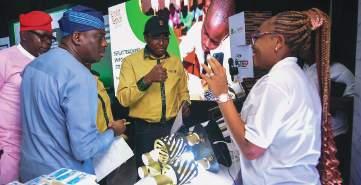
speaker, Akin-Olusoji Akinyele, the Group Managing Director of NewGlobe, said an improved education system would accelerate yearly GDP growth by 0.5 per cent at the minimum.
Akinyele said transforming the education workforce requires a holistic and collaborative approach, describing it as a complex and multifaceted process involving various stakeholders, strategic planning, and sustained efforts.
He said: “The Seplat and the EdoBEST examples are replicable and scalable models of private sector and public sector interventions. To achieve them at national scale requires comprehensive needs assessment to identify the strengths, weaknesses, and gaps in the current education workforce. This involves analysing teacher skills, professional development opportunities, and the alignment of the workforce with the evolving needs of learners and society.”
The Commissioner for Education in Edo, Dr. Joan Ovaiwe, lauded Seplat Energy and its partners for their unwavering dedication to education in Edo and Delta, noting that Seplat’s impact benefits the teachers in monetising their intellect.
She also highlighted the need for an education system that prepares graduates to tackle various crises. “Being a teacher, especially in today’s public schools, is not easy.
Ovaiwe said, “I was pleased to hear that majority of the teachers in this programme are from Edo state, and that the programme also helps train them on how to monetise their intellect. As we all know, Nigeria’s education system is still struggling in the 21st century, stuck in colonial foundations.
“To move forward, we need an education system that produces graduates equipped to tackle various crises.”
Delta’s Commissioner for Education, Rose Ezewu, through her representative, lauded the joint venture between Seplat and NNPC, saying that the training has been impactful on the students whose interest and participation are on the rise resulting from the empowerment of their teachers in STEAM-based curricula.
“The impact of the teaching is evident in the increasing rate of students’ participation in science and technology competitions at local and international levels, as well as their outstanding performance in STEAM-based subjects in different examinations,” stated Ezewu.
The summit’s highlight was the presentation of products handcrafted by participating teachers from three different schools.
Abioku Grammar School presented a collection of chairs and centre tables ingeniously crafted from recycled tyres, priced at just over N50,000 per item.
Since its launch in 2019, Seplat has successfully trained and certified over 1,300 teachers in STEAM subjects across Edo and Delta. The energy company remains committed to fostering the growth of its STEP CSR initiative
Meanwhile, teachers from Fortune High School introduced a unique cleaning soap named MM2, which is available at N300.
Another teacher unveiled a chandelier light that embodies the concept of energy, aligning with Seplat Energy’s ethos. She explained the features of each light, detailing their functionality. Remarkably, one light operates with a lithium battery, automatically activating when the Power Holding Company of Nigeria (PHCN) light goes off. Another utilises both PHCN light and solar power, doubling as a power bank for mobile devices. She described the meticulous process of sourcing materials from the surrounding environment, including PVC pipes, and outlined the two-month creation journey, requiring an investment of N50,000.
The event organisers announced two outstanding women and ten outstanding teachers, respectively.
Francis Edeki, recognised as the most outstanding teacher, stated that he didn’t find teaching exciting before joining the programme, but since coming for the event, he became encouraged to follow his teaching call.
Similarly, Flora Ehimen, a teacher from Edo state, said the knowledge she gained from Seplat will be transferred to her students.
Another beneficiary, Beauty Atsenuwa, said the STEAM-based training is expensive, and teachers could not have afforded it with their salaries without Seplat’s sponsorship. She thanked the organisation for the rare opportunity.
“Looking at our environment, how many organisations will think it necessary to give back to society? Seplat, you are too much. You’ve given us a rare opportunity, and we cannot thank you enough,” Atsenuwa explained. “And I believe, just as it is in my mind, the only way we can pay you back is to go back to our various schools and do the needful: impact lives and build destinies that will, in turn, make our nation a great place to be, in.”
Since its launch in 2019, Seplat has successfully trained and certified over 1,300 teachers in STEAM subjects across Edo and Delta. The energy company remains committed to fostering the growth of its STEP CSR initiative.
Emphasising the importance of collaboration, Seplat urges increased cooperation between the private sector, educational institutions, and government bodies. Such partnerships are crucial for aligning educational offerings with job market demands and enhancing teaching and learning standards.
“Our collective efforts are vital in building a skilled and productive workforce that can drive the nation’s growth and development in the years to come,” the company said.
As the programme came to a close, the UN country representative stated that “the theme of this year’s summit speaks to the heart of the matter. Educators are the architects of our future, and it is imperative to provide for them the support and resources they need to thrive in their roles. By doing this, we can unlock the full potential of our educational workforce and power them to drive positive change within their communities.”
36 THISDAY • WEDNES Day FEBRUa Ry 28, 2024
Some of the participants at the Seplat education summit
After completing the STEP training, a teacher reveals a handcrafted chandelier with multiple functionalities
ALX Welcomes 30,000 New AiCE Learners Across Africa
ALX Africa, an innovative tech career accelerator, has announced the enrollment of 30,000 new learners across Africa into its Artificial Intelligence Career Essentials (AiCE) programme. This is in line with ALX’s commitment to fostering a new generation of leaders equipped with innovative skills in AI technology across Africa.
In his welcome address, the host, Gavin Peter, VP of Community and Culture at ALX, emphasised the essence of the event, termed ‘Karibu’ which means ‘Welcome’ in Swahili, saying, “It is our usual ritual to start our ALX courses. We want our learners to feel welcome and part of the family. ALX is a community where we all belong and meet each other. We want to upskill young Africans and prepare them to launch so that they can grow their careers and make an impact.”
The AiCE programme offered by ALX introduces participants to artificial intelligence tools essential to their professional practice. For six weeks, learners will be equipped with knowledge of the rapid advancement of AI and its increasing relevance across various industries.
Through this course, ALX takes on the responsibility of equipping African talents with the necessary expertise to harness the potential available with Artificial Intelligence.
“Out of the 30,000 learners onboarded across Africa from Nigeria, Ethiopia, Ghana, Egypt, Morocco, South Africa, Rwanda and Kenya, over 5,000 came from Nigeria. This significant feat is
a testament to the dedication and resilience shown by ALX Nigeria,” Peter said. “Also, a strong and vibrant community, impactful engagements, and evidential testimonials of personal and professional growth are only a few of the many identifiers of this success.”
Commenting on this significant achievement, the ALX Country General Manager, Ruby Igwe, said, “We are immensely proud to welcome 30,000 new learners to our AI programme. This milestone reflects our dedication to providing accessible, worldclass education that empowers individuals to shape the future of Africa. Through our AI Career Essentials programme, we aim to cultivate a diverse community of innovators who will drive technological advancement and economic growth across the continent.”
She added, “ALX is not just a learning platform. It’s a community where learners come together to grow, inspire, and support one another. As we extend our heartfelt “Karibu” to our new learners, we are excited to witness the impact they will make as they harness the power of Artificial Intelligence to drive innovation and change across Africa.”
ALX remains dedicated to expanding access to transformative education and empowering African talents to lead in the Fourth Industrial Revolution. As the continent continues to embrace technological innovation, ALX stands as a beacon of hope, guiding learners towards a future filled with endless possibilities.
Arts Academy Graduates 19,000 Students
Funmi Ogundare
A total of 19,000 graduands who have completed programmes in Theatre Arts and Entrepreneurship, have graduated from the Terra Academy for the Arts (TAFTA), an institution dedicated to nurturing artistic talent, career support and entrepreneurial opportunities.
Speaking at the graduation ceremony held at Terra Kulture, Lagos, the founder of the academy, Mrs. Bolanle Austen-Peters, stated that it had to collaborate with the academia in the university system and other practitioners to develop a curriculum in 2020.
She explained that though as a practicing lawyer herself, everything she learnt and did, were through hard work, tenacity, focus and understanding what it was to entertain people.
She emphasised on the partnership with MasterCard Foundation, saying the foundation supported financially, adding that such move was remarkable considering the cost of education in Nigeria.
“The quality of education the graduands got can be compared with anywhere in the world. We took the best brain and worked with them to develop the curriculum that we have today. So we have our practical centres in Ogun, Kano and Lagos States. A lot of you have benefitted from experts,”
NANS Bemoans Alleged Mismanagement of CTIN Funds, Seeks Tinubu’s Intervention
Uchechukwu Nnaike
The National Association of Nigerian Students (NANS) has drawn President Bola Tinubu’s attention to what it described as mismanagement and lack of accountability within the Cement Technology Institute of Nigeria (CTIN), an organisation under Aliko Dangote’s leadership as pioneer and self-imposed life chairman.
The association said this in an open letter to the president, titled, ‘Mismanagement and Lack of Transparency and Accountability in CTIN Funds Administration: A Call for Immediate Action’ and dated February 22, 2024.
The letter, signed by NANS Senate President Akinteye Babatunde, stated that the alleged misuse, diversion and
misappropriation of such strategic fund intended to provide training and development opportunities for Nigerian youths in the cement industry in line with the establishment goals of CTIN is a weighty one, “in fact, it’s a future-threatening act and an act of economy sabotage.”
It said the fund had been squandered, leaving a trail of broken promises and shattered dreams, as Nothing can be pointed at as an achievement.
“The situation of countless Nigerian youths, who remain unemployed and lacking technical skills in a rapidly advancing global economy like ours, is a harsh testament to the repercussions of such mismanagement and embezzlement. Another hidden factor responsible for the unprecedented hike in cement price in the country. We
demand answers, we demand accountability, we demand explanation and we demand justice,” NANS said.
The association, therefore, called on the president to issue a directive to the Federal Ministry of Industry, Trade and Investment to make public, as a matter of urgency and national importance, her role so far, the status, management, and usage of the over N20 billion contributed as levies on imported cement to CTIN for technical training purposes since over 10 years ago when Nigeria was still importing cement.
It explained that Dangote “has been sole chairman since this institution was created by the Federal Ministry of Trade, in conjunction with cement importers - hence why we are also demanding an explanation
directly from Dangote as to where is the said fund.”
To avert the degeneration of the matter, where all Dangote industries will be occupied by Nigerian students nationwide, the association appealed to the president to advise Dangote to immediately engage an external independent forensic auditor to audit the CTIN funds, “and we also demand that anyone found guilty be held accountable for their actions.”
The student body also demanded swift action towards restructuring the leadership and governance of CTIN, saying, “Nothing like life chairman, it should be democratic to prevent such overstay that is bringing severe mismanagement of what should be the people’s commonwealth from happening in the future.

Embrace Skills Acquisition to Be Job Creators, Ado Poly Rector Tells Nigerians
Austen-Peters stated.
She thanked the team who made the dream a reality, saying that having ideas and bringing it to reality are completely different things as people have ideas that are dying in their heads.
She expressed hope that the centre will surpass 19,000 over the next four years, adding that running Terra Kulture is not easy.
She admonished the graduands to be strong in the face of challenges in life by looking inwards and working on the talents in them.
“There are so many information online that you can use to improve yourselyes.Throw your skills up for people to see. Don’t waste your time on the internet on just social engagement. Use it to better yourselves as you have done with TAFTA. Go for the best, work hard and hope for the best for each and everyone.”
In her remarks, the ViceChancellor, University of Lagos, Prof. Folasade Ogunsola commended the founder for her passion and for believing in the creative ability and what it could do to impact Africa. She also congratulated the graduating students and those who have supported them, saying that the future of the world is not necessarily about what they have learnt, but what it did to their minds and how it will make them outstanding in their chosen fields.
The seventh substantive Rector of the Federal Polytechnic, Ado-Ekiti, Temitope Alake, has urged Nigerians to embrace vocational skills acquisition to be job creators to reduce the growing unemployment rate in the country.
Alake said this while briefing journalists in Ado Ekiti to highlight his achievements as part of activities marking his first anniversary in office.
He pointed out that the polytechnic is committed to training students to have manipulative skills to be job creators.
“The digital economy is reducing the need for manpower. That’s why we want to appeal to the parents to bring their wards to a technical school,” said Alake. “This will enable them to acquire manipulative and vocational skills so that they will be job creators.”
Specifically, Alake disclosed that the polytechnic under his watch works towards achieving triple core mandates, namely, training professionals, ensuring the acquisition of skills by students, and training minds.
The rector also stated that the institution is intensifying efforts to create a mass production scheme to end food scarcity
and exacerbate hunger.
He said the institution plans to collaborate with the School of Agriculture to reduce food scarcity as the country battles the economic downturn.
Alake added that the polytechnic’s venture has been revamped towards generating revenue, adding that the bread and poultry production are coming back to life to help boost the institution’s internally generated revenue (IGR).
“This institution will embark on mass food production through the efforts of School of Agriculture. This will help in making food available for our people as the country currently
go through economic downturn. By the time this one is achieved, food scarcity will be gone,” the rector said.
While reeling out the Infrastructural projects executed during his one-year in office, Alake listed the ongoing construction of the new School of Environmental Building, the ongoing construction of the Mass Communication complex, which will serve as the studio for the department, construction and furnishing of 36 rooms students’ hostel building, ongoing construction of a block of four classrooms, sponsored by the IGR project of the institution, among others.
HR Expert Urges Companies to Promote Culture of Love
A human resources expert, Cynthia Odunaiya, has urged companies to promote a culture of love in the workplace as it fosters good relationships and employee productivity.
Odunaiya, the head of human resources at Greensprings School, said this while speaking about the ‘14 Days Acts of Kindness’ initiative introduced by the school to celebrate the Valentine’s season.
The initiative aimed to reinforce the love and kindness shared in the school community. Staff members were encour-
aged to engage in deliberate acts of kindness towards their colleagues and loved ones from February 1 to 14.
On the idea behind the 14 Days Acts of Kindness, the HR professional stated that initiatives, like the one organised by the school for Valentine’s season, are needed in the workplace to ensure that employees experience love and happiness, as this will motivate them to put in their best and ultimately increase productivity.
“Three things matter in every organisation, and they are the
people (staff), the product and the profit. In all these, people are at the centre; hence, the work environment must be warm and comfortable for them to thrive,” stated Odunaiya. “Thus, there is a need to come up with exciting initiatives that will make them happy and promote bonding among colleagues.
“At Greensprings, we have several initiatives and staff engagement to ensure that our employees feel heard, loved and respected. Some of them include regular wellness talks
and health checkups through our HMO partners, long service recognition awards, most valuable employees of the month, birthday shoutouts, and surprise milestone celebrations.”
She added that the school’s human-centric HR initiatives align with the school’s motto, saying, “We do all we do because we want everyone in our organisation to feel heard and valued. This helps us to sustain our service culture, thus aligning perfectly with our motto, which is ‘In Love Serve One Another’.”
37 THISDAY • WEDNES Day FEBRUa Ry 28, 2024 EDU catio N
L-R: Egemba Chinonso Fidelis (Aproko Doctor); Category Manager, Beverages, Nestlé Nigeria PLC, Ifeanyi Orabuche; Category Development Executive, Beverages, Nestlé Nigeria, Charles Ikpe; Anita Asuoha (Real Warri Pikin); Category Development Manager, Beverages, Nestlé Nigeria, Myron Otoo; and Category Development Manager, Beverages, Nestlé Nigeria, Funmilola Oyewole, at the commencement of the partnership to empower Nigerian children
Gbenga Sodeinde in Ado Ekiti

38 WEDNESDAY FEBRUARY 28, 2024 • THISDAY
CBN Approves FX Sale to BDCs to Curtail Price Distortions at Retail Market
Allocates $20,000 at N1,301/$
James Emejo in Abuja and Nume Ekeghe in Lagos
The Central Bank of Nigeria (CBN), yesterday announced that it has approved the sale of Foreign Exchange (FX) to eligible Bureau De Change (BDC) operators to meet their demand for invisible transactions.
The central bank disclosed that the sum of $20,000 would be sold to each BDC at the rate of N1,301/S which represents the lower band
asymmetric corridor around the MPR to +100/-700 basis points from +100/-300 basis points.
The central bank equally raised its Cash Reserve Requirement (CRR) to 45 per cent, from 32.5 per cent, and retained the Liquidity Ratio at 30 per cent.
The CBN governor, Olayemi Cardoso, disclosed the changes while addressing journalists at the end of the two-day meeting of the Monetary Policy Committee (MPC) – the first under the reconstituted committee led by Cardoso.
The magnitude of rates hike beat the expectations of many analysts, who, though predicated further tightening of monetary policy, believed it would be in the region of between 200 and 250 basis points to tame headline inflation, which stood at 29.90 per cent in January.
The MPR is the rate at which commercial banks borrow from the apex bank and often determines the cost of funds in the economy.
The significant policy rate hike seeks to drive down inflationary pressure substantially, according to the CBN governor.
Cardoso also revealed yesterday that the central bank had further
The theme of this year's summit, overseen by Brevity Anderson, was, "Navigating the New Energy World Order: Security, Transition, and Finance."
The president stated that Nigeria was currently at a crossroads of a rapidly transforming global energy landscape. He explained that energy security was of paramount importance, as it is not just a national concern, but a global imperative.
In the face of emerging challenges, both geopolitical and technological, Tinubu who, was represented by Minister of Information and National Orientation, Mohammed Idris, stated that Nigeria must ensure the resilience of its energy infrastructure was assured.
As a fallout of the decision to remove fuel subsidy and collapse the FX market, Nigerians have recently been experiencing economic hardship made worse by skyrocketing prices.
But the president stressed that the funds that were previously allocated to subsidising petroleum products were now redirected towards developing and upgrading energy and other social infrastructure.
Tinubu stated, “The decision to remove the petroleum subsidy is a challenging one, but it is a step we must take to secure our energy future and foster economic growth. Energy security is a paramount concern for any nation striving for economic stability and development.
“It encompasses not only the availability and accessibility of energy resources but also the resilience of our energy infrastructure.
The petroleum subsidy has, over the years, strained our economic resources, leading to inefficiencies and, most importantly, hindering our ability to invest in critical areas of energy security.
“By removing the subsidy, we are creating a more transparent and accountable energy sector. The funds that were previously allocated to subsidising petroleum products are now redirected towards developing and upgrading our energy and other social infrastructure.
“Furthermore, the removal of
rate of executed spot transactions at the Nigeria Autonomous Foreign Exchange Market (NAFEM) for the previous trading day, as of February 27, 2024.
The apex bank conveyed the development in a circular dated February 27, 2024, and issued by CBN Director, Trade and Exchange Department, Dr. Hassan Mahmud, which was addressed to all BDC operators and the public.
The CBN explained that the
disbursed $400 million to settle part of the outstanding foreign exchange (FX) commitments, which had been verified to be genuine requests.
He justified CBN’s recent clampdown on cryptocurrency platforms, particularly Binance, which allowed its platform for speculative activities against the naira.
Cardoso said unidentified beneficiaries accessed $26 billion on the Binance platform in 2023, with all the attendant implications for monetary policy, especially the tendency to stoke inflation and further weaken the naira.
He said there were indications of illicit inflows and suspicious transactions, adding that the CBN has the responsibility to protect Nigerians from the disruptive activities of such crypto platforms.
Cardoso, who read the committee’s communique, stated that decisions were centred on the current inflationary and exchange rate pressures, projected inflation, as well as rising inflation expectations.
He said members acknowledged the trade-off between the pursuit of output growth and taming inflation, but were convinced that an enduring output expansion was
the subsidy has encouraged further private sector participation in the energy industry with potential of attracting more local and international investors, fostering innovation and competition that will drive down costs and improve the overall efficiency of our energy sector,”
Acknowledging that he was aware of the immediate effect the decision might have on Nigerians, especially those with lower incomes, Tinubu said his administration was committed to implementing social intervention programmes to mitigate the short-term effects on vulnerable populations.
These programmes, he said, will ensure that the burden of the subsidy removal was shared equitably and that the most vulnerable among Nigerians were protected.
The president said, “The decision to remove the petroleum subsidy is not an easy one, but it is a necessary one for the long-term energy security and economic prosperity of our beloved nation.
“I call upon all stakeholders, including industry experts, policymakers, and the general public, to engage in constructive dialogue and collaboration as we navigate these challenging but transformative times. Together, we can build a resilient and sustainable energy future for Nigeria.”
According to him, adequate funding is crucial to support the development and deployment of cutting-edge technologies, infrastructure, and projects that will shape Nigeria’s energy future.
Tinubu said Nigeria must explore innovative financing models, engage with the private sector, and attract investments that will propel it towards a more resilient and diversified energy sector.
Speaking against the backdrop of the perception that the Nigerian National Petroleum Company Limited (NNPCL) was blocking International Oil Companies (IOCs) intending to divest from Nigeria’s onshore, Group Chief Executive Officer of the company, Mele Kyari, insisted that the role of NNPCL was that
intervention became necessary following the continued price distortions at the retail end of the market, which is feeding into the parallel market and further widening the exchange rate premium.
The move also complements ongoing reforms in the foreign exchange market, aimed at achieving an appropriate market-determined exchange rate for the Naira.
The CBN however, emphasised that the BDCs are allowed to sell to
possible only in an environment of low and stable inflation.
The CBN governor said the MPC acknowledged the decision to transition to an inflation-targeting framework as essential to addressing the persistence of inflationary pressures in the economy and commended the fiscal authorities for their support.
He explained that the options available were to either hold or hike the policy rate to offset the persisting inflationary pressure. He said considering the option of a hold policy, the evidence revealed that previous policy rate hikes had slowed the rise in inflationary pressure but not to a desirable extent.
Cardoso said members considered various scenarios of hold and hike and concluded that inflation could become more persistent in the medium-term and, thus, pose more regulatory challenges if not effectively anchored.
He said the MPC also deliberated extensively on various distortions in the foreign exchange market, including the activities of speculators, putting upward pressure on FX with high pass-through to inflation.
According to him, “Members
of a facilitator, and not an obstacle.
Kyari explained that by virtue of its statutory mandate as the enabler of national energy security, its role was to ensure that at the end of the day, there was optimal and sustainable production from the divested assets to guarantee energy security for the benefit of Nigerians.
Kyari also disclosed the company’s willingness to invest in the proposed African Energy Bank as a way of ensuring sustainable funding for energy projects in Africa to guarantee energy security.
On investment in energy infrastructure to drive energy security, the GCEO disclosed that the completion of the Obiafu-Obrikom-Oben Pipeline was in sight, as the tunnelling across the River Niger was currently ongoing.
He assured stakeholders of the company’s commitment to work with them to close the energy gap and create prosperity for Nigerians, adding that from all indications, all issues of energy scarcity in the country would be over in the next 10 years.
In his remarks, Minister of State, Petroleum Resources (Oil), Senator Heineken Lokpobiri, said the federal government was committed to safeguarding the country’s energy infrastructure, promoting regional stability, and ensuring a resilient oil and gas sector.
Lokpobiri stated that Nigeria should not count it as loss that IOCs’ were divesting from onshore because the country’s indigenous oil firms were capable of taking over the assets.
He stated, “We must address the issue of energy security in Nigeria with utmost urgency. We possess rich and untapped reserves that can be easily harnessed to bring about economic prosperity for our nation and its citizens.
“However, the challenge lies in ensuring that only competent players with the requisite technical and financial capability to make the necessary investments are engaged. We must provide opportunities and create an enabling environment to
end-users at a margin not more than one per cent above the purchase rate from the central bank.
The bank further directed all eligible BDCs to make the Naira payment to the designated CBN Foreign Currency Deposit Naira Accounts and submit confirmation of payment, with other necessary documentation, for disbursement at the appropriate CBN branches in Abuja, Awka, Lagos, and Kano.
Similarly, the apex bank also
were, however, convinced that the ongoing reforms in the foreign exchange market would yield the desired outcome in the short to medium term.
“The reforms include the unification of the FX market; promotion of a willing buyer-willing seller market; removal of all limits on margins for IMTO remittances; introduction of a two-way quote system and the broad reforms in the BDC segment of the market to restore stability, enhance transparency, boost supply, and promote price discovery in the Nigeria Autonomous Foreign Exchange Market (NAFEM).”
He disclosed that the country’s gross external reserves stood at $34.51 billion on February 20, 2024, compared with $32.23 billion at end-January 2024.
Cardoso attributed the improvement to reforms in the foreign exchange market and an increase in oil production, among others.
He said, “Firstly, I hope you can see from the decision that has been announced concerning our policy stance and monetary policy rate that clearly, we are out to tighten the money supply and to ensure that we have a robust structure in
attract these players.”
In comparison with the global decline of investments in the oil and gas industry between 2017 and 2022, investments in Nigeria, Lokpobiri said, declined by 69 per cent when compared with the 28 per cent global average decline.
According to him, Nigeria has an abysmal capital investment-to-reserve ratio of five per cent compared with Angola (46 per cent), Brazil (115 per cent), Mozambique (92 per cent) and Guyana (617 per cent).
The minister said, “The window for attracting new investments and exploring our vast reserves is fast narrowing. If the global energy transition accelerates, approximately 60 per cent of Nigeria’s reserves could be uncompetitive to produce.
“Against this backdrop, we have identified that there are so many licenses with proven reserves that are not being optimised in the hands of IOCs and others. In line with Mr. President’s Renewed Hope agenda, we are working on changing this narrative.
“One of the easiest ways to solve the current foreign exchange challenges faced in the country is to aggressively increase production, which will in turn bring in additional revenue for the government. The additional crude produced will serve as a feedstock to our state-owned, private, and modular refineries.”
Acknowledging that additional financing was crucial for growth in the oil and gas industry, Lokpobiri said it was imperative that Nigeria pursued the dream of realising the Africa Energy Bank, which will have an initial capital base of $5 billion within five years, and a gross asset base exceeding $120 billion by 2028.
With seven countries actively seeking to have the proposed African Energy Bank within their nations, Lokpobiri argued that Nigeria had made concessions in the past and it was time for African countries to allow the bank to be cited in Nigeria.
Minister of State for Petroleum Resources (Gas), Ekperikpe Ekpo, also said Nigeria’s gas industry, with
published an updated list of 1,368 BDCs currently licensed to operate in the country.
The list obtained by THISDAY showed that 785 are domiciled in Lagos, 371 in Kano, 186 in Abuja, and 26 in Akwa.
Total CBN weekly intervention to this figure would amount to $27.36 million and about $328 million annually.
The development further confirmed THISDAY’s earlier report that
place as far as monetary tools are concerned to rein in inflation.
“We expect that this would moderate in the short to medium term, but interestingly, we also appreciate the fact that there is a structure side to inflation, which we intend to work very closely with other arms of governments, in particular, the fiscal side.”
Cardoso added, “We hope is to collaborate very strongly with the fiscal side so that the other elements of inflation that are not directly within our control to be managed a lot better and a more positive outcome will come to the benefit of all Nigerians.”
On Binance, Cardoso said, “We are concerned that certain practices go on that indicate illicit flows going through a number of these entities and suspicious flows.
“In the case of Binance, last year alone, $26 billion passed through Binance Nigeria from sources and users who we cannot adequately identify.
“There is a lot that is going on now as a result of collaboration between the different agencies, which include the EFCC and the police, and, of course, the Office of
abundant proven gas reserves of more than 208TCF and further exploration potential, was crucial for enhancing energy security. In the light of the above, Ekpo maintained that Nigeria had no business with energy poverty.
He said, “In our transition to a sustainable energy future, Nigeria has chosen gas as our transition fuel, facilitating the shift from more conventional to new and renewable energy sources.
“With its lower carbon footprint and versatility, natural gas aligns with global climate objectives while providing a reliable solution for our energy needs. Nigeria, with significant gas reserves, should leverage this advantage to become a key player in the global energy transition and a regional powerhouse for gas processing and industrialisation.”
Ekpo said Nigeria currently faced challenges, but the challenges also presented the country a unique opportunity to seize the moment and define its future.
Secretary General, Organisation of Petroleum Exporting Countries (OPEC), Haitham Al Ghais, in his comments, said Nigeria’s role in OPEC’s past and present remained a tremendous source of pride.
Al Ghais said, “We anticipate a bright future for Africa's oil industry with substantial opportunities for growth. The continent is home to five of the top 30 oil-producing countries and its proven oil reserves amounted to around 119 billion barrels at the end of 2022.”
Chairman of the Independent Petroleum Producers Group (IPPG), AbdulRazaq Isa, in his remarks, lamented the slow pace of the process of handing over divested assets from IOCs to Nigerians interested in buying them.
Secretary General of African Petroleum Producers’ Organisation (APPO), Farouk Ibrahim, said Africa must chart its own energy pathway.
Ibrahim stated that those who had the biggest legacy carbon emissions must find a way to clean up their mess, rather than compel Africa to jettison fossil fuels.

the central bank planned to resume its FX intervention through the BDC operators, in a bid to achieve its mandate of safeguarding the value of the local currency, ensuring financial system stability, and shoring up external reserves.
the National Security Adviser and in due course, as we progress and have more information to share, we will certainly share but suffice to say that we are determined to do everything it takes to ensure that we take charge of our market and not allow others to manipulate our markets in a way that ends up distortionary.
“We will not accept it. And we will do everything possible to prevent any of these kinds of infractions from taking place.”
On the question of the naira being currently undervalued, Cardoso explained, “The naira is undervalued and some will say it is rather a bold statement from a central bank governor. From my perspective, there is a technical side and the CBN on a continuous basis does its internal calculations and then there is the softer side.
“As far as I can see, the softer side resolves in some of the things I had mentioned earlier and that is a distortion to the extent that a market is not functioning effectively and is distortionary in outcome; my view is that it certainly cannot be what it is.
“For me, it was a challenge to ensure that we remove those distortions.
“Some of the distortions we are seeing and some of the manipulations that are taking place, we are investigating right now.
“When distortions come, we will take them out and throw them away and where there are distortions that come about by bad behaviour, we will ensure that those who do it will face the music as a deterrent to ensure that others in future do not go that route.”
Cardoso also spoke on the suggestions that the economy was suffering on account of the various reforms introduced by the apex bank, and was quick to absolve the current CBN management team from blame.
He said, “As central bank governor, I and my team are not responsible for the woes we have today. We are part of the solution. We are determined to ensure that we work hard to get out of the mess Nigeria is in.
“We assumed responsibility in a time of crisis of confidence and you may all want to go to bed and wish that the crisis of confidence was not there, but it was.
“All we can do is do the difficult things to make a bad situation better and I do believe that the efforts that we are making are beginning to bring back confidence.
“Without confidence, we are not going to get very far. No matter how much you have in your store of dollars, naira, if the confidence is not there, all that money will disappear in no time. We are working hard, putting out policies, trying to avoid as much as possible to not go against the grain and the spirit of what we said we would do.”
He added, “We are trying to be as open as possible. We are bearing the interest of all Nigerians in view of any decisions we are taking. We are ensuring that we put the country above individuals.
“Nigeria does not have room to make failed interventions. We do not have the wiggle room to get it wrong. We are not magical, if we have made mistakes, we would be humble enough to say we have made mistakes and change course.
thirty-nine THISDAY • WEDNESDAY, FEBRUARY 28, 2024 39 T I nubu: Dec ISI on T o Remove Pe TR ol Sub SIDY cHA lleng I ng, b u T n ece SSARY In u n PR ece D en T e D o ffen SI ve T o TA me Infl ATI on, cbn R AIS e S m PR T o 22.75% f R om 18.75%
Continued on page 43
CBN Governor, Yemi Cardoso

Leadership CoLLoquium & award...
L-R: Associate Pastor, Fountain of Life Church, Pastor Tolu Odukoya; former House of Representative Member, Hon. Adejoro Adeogun; Founder, Jaykay Pharmacy, Pharm. Jimi Agbaje; Founder, The Akinjide Adeosun Foundation (AAF), Pharm. Akinjide Adeosun; former Governor of Lagos State, Mr. Akinwumi Ambode; and the Chief Executive Officer, Microsoft, Mrs. Olatomiwa Williams, at the 2024 Akinjide Adeosun Foundation (AAF)’s Leadership Colloquium & Award, Chapter 8, in Lagos...recently
PDP Tasks Ighodalo on Reconciliation as Guber Candidate Presents Certificate of Return to Obaseki
Party says it’s not aware of parallel primary election
Abuja
The national Chairman of the Peoples Democratic Party (PDP), Iliya Damagum, yesterday tasked the party's governorship candidate in the September 2024 governorship
election in Edo, Asue Ighodalo, to immediately commence the process of reconciliation with aggrieved members of the party.
Damagum, who spoke during the presentation of the certificate of return to Ighodalo as the party’s
duly elected governorship primary election in Edo last Thursday, said the party was not aware of any parallel primary election in the state.
Speaking before presenting the certificate of return to Ighodalo, Damagum explained that at any
given event, there must be winners and losers and mandated Ighodalo to ensure that he reconciles with all aggrieved parties.
"There is only one brand of PDP in Edo state. Edo State is PDP and it will remain so. You have a daunting task
Abbas Seeks Lawmakers’ Inclusion in NIPSS Training
Assures NASS staff of better welfare
Juliet akoje in Abuja
The Speaker of the House of Representatives Hon. Abbas Tajudeen has called for the inclusion of members of the National Assembly in the training programmes at the National Institute for Policy and Strategic Studies (NIPSS).
According to his statement issued by the Special Adviser on Media and Publicity, Mr Musa Abdullahi Krishi Abbas, when the management of NIPSS, researchers and partners paid him a courtesy call in office on Tuesday stated that programmes offered by NIPSS should not be limited to only officials in the Executive arm of the government.
In another development, Tajudeen assured staff of the National Assembly under the umbrella of Parliamentary Staff Association of Nigeria (PASAN) of better welfare under the current leadership of the national parliament.
A related statement issued by Abdullahi Krishi, the Speaker, who received the leadership of PASAN led by the National President Comrade Muhammad Usman and the NASS chapter chairman, Comrade Sunday Sabiyi, on a thank you visit at his office on Tuesday, said the welfare of staff of the National Assembly remains paramount to the leadership.
NIPPS, located in Kuru, Jos, Plateau State, founded in 1979, is Nigeria’s think-tank and policy research institution, which has bureaucrats, private sector leaders, military officers, and medium-rank and senior civil servants in its alumni.
The Speaker said: “I want to request the DG to look at the National Assembly in your subsequent admissions because, with the kind of things that I saw for myself when I went to the (Presidential) Villa, I am sure that the National Assembly can also benefit a lot from NIPSS. I would want to see a situation where every year, an allocation of one or two slots would be made available to the National Assembly, to send its people to learn and share experiences"
“Experiences are not limited to the Executive; even the Legislature
has a lot to share. By the time you blend the two – what the people from the Executive know and what the Legislators also know – I am sure that your subsequent programmes will be enriched. Please, take note of that."
Abbas, while noting that the NIPSS was visiting his office for the first time since he came on board in June 2023, commended the institute for doing a good job.
Further according to him, “I want to also commend you and the Institute for all the good jobs you have been doing. We are indeed very proud of you. In your last visit to Mr. President, I had the privilege of being there and I listened to your presentation.
“It is one of the best that I have ever heard from any academic institution. It was well-packed; it was well articulated and the message resonated well. I want to appeal to you to please continue to keep the flag flying. It is truly an institution that is giving a lot of inspiration and guidance to the government of this country.”
He also commended NIPSS for the official launch of its ‘Regional Citizenship Dialogue Programme for the Prevention and Response to the Unconstitutional Change of Governments in West Africa’ at a time when West Africa was particularly “in a state of turmoil.” He said: “What is happening to our dear sub-continent is really, very tragic."
The Speaker asked the DG of NIPSS to communicate the issues affecting the Institute to the House through the committee that oversights it. He assured the management of the willingness of the House to effect the proposed amendments to the NIPSS Act.
The Director-General of the institute, Prof. Ayo Omotayo, who led the delegation, in his remark, said the institute would like to acquire adjourning lands to its premises located at Kuru, Jos, to further secure the place.
Omotayo urged the House to intervene on that and other issues, especially with budgetary allocation
to acquire land around the Institute for better security. This, he noted, was based on security advice obtained by the Institute.
The NIPSS DG also decried poor remuneration of workers, especially the academic staff, researchers and other experts.
He called on the House to revisit a bill seeking to amend the NIPSS Act, which he said was last amended in 2004. This he said, was in “pursuance of our mandate to ensure that we get Nigeria to a level where we can be proud of it."
On the NASS staff visit, Abbas stated that while Nigerians have legitimate reasons to express sadness, the current administration requires some level of patience and time to implement initiatives and programmes aimed at improving the standard of living of the citizens.
He also urged the PASAN leadership to be a bridge of conciliation between the National Assembly leadership and organised labour by conveying his message of hope and assurances on behalf of the president to the workers, adding that a positive change is closer to them than ever.
His words: "My appeal to you as the National President of PASAN is to please help to tell your other colleagues in the labour leadership to please give this government a little more time. There are so many things that are under consideration, things that the government is trying to come up with for the benefit of Nigerians. So, please help us to tell them to exercise patience that something very good will come out very soon."
"I know of a lot of palliatives, reviews of salaries and welfare packages that are most likely coming on board in the near future. Please, communicate to them that we know their pains and their problems and we will not let them down. They should give us more time."
The Speaker commended the PASAN leadership for coming to show gratitude for his recent interventions, which they reported have yielded positive outcomes in terms of improved welfare
packages for National Assembly staff and payment of pending allowances by the new management.
Noted Tajudeen: "I'm really delighted to receive you again for the second time. I remember a few months ago, we had cause to meet where you presented a lot of issues bordering on the association. To God be the glory, you have acknowledged that the issues have been handled as requested.
"The only thing that's outstanding is your arrears, which was tied down to the refusal of the Salaries and Wages Commission to do what they ought to have done. We invited them here in the National Assembly to discuss that issue. The chairman promised that he would get back to us with a solution to that issue. I'm surprised that up till now he hasn't. I want to assure you that we will send and ask him to come back and tell us what's really happening.
"One way or the other, we will not allow that entitlement of yours to go in vain. We will get that money paid to you within this year."
Continues online
before you to ensure unity among your co-aspirants," he stated. He urged Ighodalo to go to all nooks and crannies of the state and ensure reconciliation as the national leadership of the party will also support him in the task.
"It has been very difficult but we have learnt a lot of lessons. I think Edo is a peculiar state. It is not only PDP. We saw the drama in Labour Party (LP), All Progressives Congress (APC) and other parties.
"But I believe as a party, we did our best to give everybody a level playing field in terms of transparency and all the actions that we took. You can disagree with us. But history will prove us right that we did the right thing.
"On the party’s side, we have concluded our processes for our candidate to emerge. Now, we are handing him over to the electorate in Edo and the Independent National Electoral Commission (INEC). We pray that our electorate and INEC will do their best to give everybody a level playing field in the next election," he stated. Thereafter, Damagum presented the certificate of return to Ighodalo.
In his response, the governorship candidate of the party in the state, pleaded with those that contested the Thursday primary election to come back and join him for progress and victory of the PDP in the governorship election.
He said: "My other co-aspirants, let's come together as one. I will continue begging, let's work together as one team. We are begging. We will all work together and I will be the governor of Edo. Let's come together as one, Edo State will be
together as a winner in the state."
"I'm truly grateful to elders, youths in Edo State. I am thanking you most immensely for your supports throughout the campaign. I'm extremely proud to be a member of the PDP and I am grateful for the opportunity given to me.
“ I am also grateful for the fairness and transparent nature of the primary election. Indeed, there was a level playing ground during the primary election. This election stands out as fair and transparent," Ighodalo said.
Meanwhile, Ighodalo has presented his certificate of return to the Edo State Governor, Mr. Godwin Obaseki, at the Edo House, in Abuja, the Federal Capital Territory.
Upon presenting the certificate to Obaseki, Ighodalo reiterated his commitment to repositioning Edo state as a leading sub-sovereign in Africa, if elected as governor.
He noted that he was confident of victory in the polls having canvassed for support among critical stakeholders in the party, including youths, women, the elderly and leaders of the party, who have expressed their support for him with the outcome of the election.
Noting that he was willing to work with other aspirants who are prepared to work for the victory of the party at the polls, he said he was reaching out to all to ensure that the party presents a united front in the run up to the election in September.
The governor congratulated him on his emergence and assured that the party was going to rally support among the people to ensure that it retains its seat in the Government House in Edo State.
Oil Communities Demand Right of First Refusal Before Shell’s Assets’ Sale
sylvester idowu in Warri
Registered trustees of the Community Development Committees of Oil and Gas Producing Areas of Niger Delta (CDCOGPAND) have demanded a right of first refusal by indigenous people from Shell Petroleum Development Company (SPDC) before selling off its crude oil drilling business and facilities in the Niger Delta region.
The group, in a letter signed by its lawyer, George Emiko and addressed to the Managing Director of SPDC, also demanded for financial reparations for the indigenes, occupants and local business owners within the region where the company explored crude oil from.
In the letter made available to THISDAY yesterday, CDCOGPAND insisted that the people who were direct victims of Shell's operation must be given foremost consideration before its exit.
The letter read this "We are Solicitors to Mr. Joseph Ambakaderemo, Mr. Augustine Iyamu and Rev. Diamond Emuobor, registered trustees of the Community Development Committees of Oil and Gas Producing Areas of Niger Delta (CDCOGPAND) hereinafter referred to as our clients.
The group therefore demanded:
"Immediate clean-up of all communities affected by oil spill from your drilling facilities and pipelines across the Niger-Delta or evidence of the inclusion of the said clean-up as a
liability acquired by your proposed successors in your terms of the sale.
"Financial reparation for the indigenes, occupants and local business owners within the Niger-Delta areas where you explore crude oil. Right of first refusal by the Niger Delta states, indigenes and indigenous companies of the areas of your operations of the acquisition of your drilling business, facilities, properties and related assets".
Emiko and Associates maintained that unless Shell revert to its clients regarding the demands within 14 days, it has the instruction of the clients to commence legal proceedings in court against the company and/ or its prospective buyers to seek to restrain it from perfecting its the sale.
NEWS
40 WEDNESDAY, FEBRUARY 28, 2024 • THISDAY
Chuks okocha in
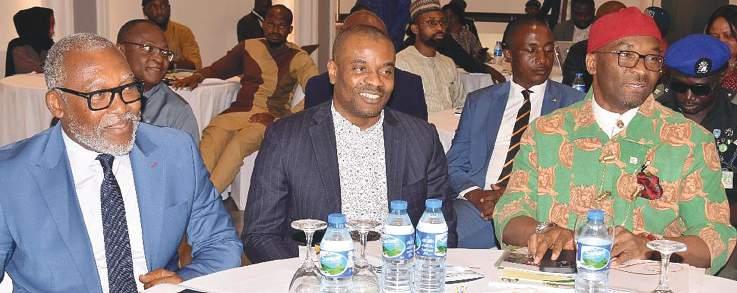
WORKSHOP ON FISCAL RESPONSIBILITY AND PUBLIC FINANCE MANAGEMENT...
Senate Proposes Temporary Food Stamp Approach to Reduce Rising Hunger
Ndume rejects importation, sharing of money
Sunday Aborisade in Abuja
The Senate yesterday passed a motion urging the federal government to introduce food stamps strategy as the best interim measure to tackle hunger and starvation in Nigeria.
The Senate’s decision was sequel to a motion sponsored by the Senate Chief Whip, Ali Ndume and co-sponsored by Senator Saliu Mustapha.
The Red Chamber urged the federal government to introduce the Nigeria version of the food stamps programme as an interventionist measure to cushion the effects of food insecurity/shortage in the country.
The Senate also mandated the federal ministry of agriculture to liaise with development partners and other relevant stakeholders, especially the Lagos Food Bank Initiative, which introduced Temporary Food Assistance Programme (TEFAP), a few years ago.
“This is with a view to working out practicable templates and implementable modalities for the actualisation of the programme,” the Senate explained.
Ndume, in his motion, explained that at the unveiling of the October 2023 Cadre Harmonisé Analysis on food insecurity, it was projected that in 2024, Nigeria is expected to see about 26.5 million people grappling with high level of food insecurity.
He said food stamps will be a supplemental nutrition assistance
programme which will provide food-purchasing assistance for low- and no-income people to help them maintain adequate nutrition and health.
He said: "The reason for the above projection is not far-fetched. There are several indicators, which include but not limited to the ongoing conflicts across the country, climate change impacts, escalating inflation as witnessed in recent time, and rising costs of both food and essential non-food commodities, due to fall in value of Naira in exchange market.
“Many hungry and angry Nigerians have been expressing their frustration and anger over the recent increase in food prices by demonstrating on the streets in several cities across the country.
"In other countries, like the United States of America, food stamp is a government-issued coupon that is given to low-income and non-income persons.
"It is redeemable for food and it has been used since 1933 to date as a measure to cushion the resultant hardships and sufferings on the poor/ less privileged as well as low-income earners.”
Ndume noted that the clamour for wage increase and work support cannot alone guarantee a more effective way of addressing food insecurity without the introduction of timetested public assistance programme, as contemplated by his motion with particular emphasis on the need for immediate food support across the
country. He also told journalists after plenary that he was opposed to the idea being canvassed in certain quarters that the federal government should resort to food importation, claiming that it would be counterproductive.
Speaking, the Senate Minority leader, Abba Moro , said there was no better time for the motion
than now, adding that identifying vulnerable people in his constituency has always been a problem but that the food stamps will help.
On his part, Senator Sadiq Umar, said the executive should ensure that only those who need the food get it, insisting the programme needs to start immediately.
“Structures are grown to help in the distribution of the food stamps,”
he said.
On his part, Senator Solomon Adeola, while supporting Ndume’s motion, said despite sharing money to the vulnerable, the food stamps will be even more important.
Also, Senator Sani Musa said it was an important motion as it will help in food security.
He said he was planning for such a programme in his constituency,
adding that having such nationally will help.
Deputy Senate President, Jibrin Barau, who presided over plenary, commended Ndume for the motion, adding that it will help assuage the sufferings of Nigeria.
“The Senate is open in acting on issues that will help all Nigerians. So the entire Senate commends Ndume for this motion,” Barau said.
APC Chieftain Urges Tinubu to Leverage Atiku’s Economic Blueprint, Says Nigeria in Coma
Blessing Ibunge in Port Harcourt
A chieftain of the All Progressives Congress (APC) in Rivers State, Eze Chukwuemeka Eze, has advised President Bola Tinubu to leverage former Vice President Atiku Abubakar's economic blueprint for a guide to salvage the nation of the hardship its experiencing presently.
The APC chieftain who rejected the excuses and blame game dished out by the presidency as cause of the deepening economic woes, said the federal government "seems entrapped in a quagmire as hope is nowhere on sight to get the country out of the pickle".
In a statement made available to journalists in Port Harcourt, yesterday, Eze expressed sadness that while the Nigerian economy
has progressively continued in a free fall, the value of the Naira to other convertible currencies is steadily on a downward trend and is nearing a state of worthlessness in the international money market.
His words: "The effect of the uninterrupted journey of the Naira to its place of final rest is the hike in the price of food and other basic commodities. And the attendant reality is the hunger and starvation that is feasible on the faces of angry Nigerians who are unsure of a square meal for each passing day and most of whom go to bed each night hungry."
Despite the challenges of the time which has described Nigeria as one of the poverty capital of the world, Eze wondered why some analysts still hold the view that Tinubu is
FG Launches Nationwide Exercise to Tackle Lassa Fever
Michael Olugbode in Abuja
The Minister of State for Environment Dr. Iziaq Salako, has launched the National ‘Deratization’ framework exercise to prevent and control the spread of Lassa fever in the country.
The Minister who was represented by the Permanent Secretary, Federal Ministry of Environment, Mahmud Kambari while briefing the press in Abuja, lamented the recent spread of the disease
He said the meeting with the State Emergency Response Team (SERT), had provided the etiological pattern of the disease.
Salako said suspected cases were recorded with six mortality, two additional cases originated from
another facility in Barau Dikko Hospital , while 92 persons are under surveillance as contact person. He added that the team had visited the affected facility, 44 Army Referral Hospital, on February 25, 2024 to gather relevant information.
“The general hygiene and cleanliness of the hospital was assessed as well as measures put in place to prevent the spread of the disease through disinfection and decontamination were both deemed effective and found adequate.
“The team further confirmed the efficacy of the treatment by using an ITP machine and use of sodium hydrochloride in correct proportion and formulation to ensure safety of the facility.
“The team recommended that the facility be deratized to reduce the population of the disease carrying vector, specifically rats,” he stated.
He noted that at the environment sector, they will continue to to provide solutions, making the environment safe and unconducive for the vector to grow because it is responsible for the disease.
The Registrar, Environmental Health Council of Nigeria (EHCON), Dr. Yakubu Muhammad, in his remarks, reiterated that the minister's directives.
He stated that all the facilities, whether public or private should undergo the exercise, including hotels, markets, restaurants and recreation centres after which they will be issued exemption certificates
by EHCON.
Yakubu disclosed that the ministry had directed the council to embark on massive capacity building to update the knowledge of the practitioners on the innovations, new approaches to control and address the disease. He added that component of health education, promotion and creation of awareness in the communities also play an important role.
"At the community level, the issue of waste management cannot be over emphasised. At this time and period, remnant of food should not be exposed while our food stuff and stores should be rats proof. In the character of rats once there is no food, rats vacates the house". He added
right in his policies.
Countering the assertions of Tinubu's supporters, Eze said "assuming the policies were good, with very little or no thought towards the complex chains of reciprocal interactions and variables required in the translation of policies into actions, there is definitely bound to be a widening gap between intentions and results as is the case in the present."
He expressed shock over a recent comment allegedly credited to Vice President Kashim Shittima, where he said the VP stressed his attempt to escape responsibility of the challenges suffered by citizens.
"Vice President Kashim Shettima had inferred that politicians who lost in the 2023 general election were orchestrating a plot to destabilize Nigeria. Shettima claimed that intercepted trucks smuggling food out of the country were part of a scheme to trigger food price hikes and plunge the nation into anarchy. He asserted that the interception of 45 trucks carrying maize led to a drop in maize prices by N10,000.
Though VP Shettima wasn't specific about the politicians who were that desperate to undermine the nation due to their failure in the last election, top contenders in the general election, Atiku Abubakar and Peter Obi can easily be postulated as the main targets by this stand; and probably former Transportation Minister, Rotimi Amaechi, who ran for the APC presidential ticket against Tinubu and emerged first runner-up behind the President".
According to the APC chieftain, "Tinubu was never prepared to make any meaningful impact on Nigeria; his only concern was to be President and nothing more.
The pernicious effects of perpetual poverty have become real under his administration and these are his chief "Therelegacies. seems to be no efforts at by the present administration in tackling the economic concerns of the country and if there are", he said, "it means such efforts were not good enough and shifting blame to patriots who are in their private capacities thinking out ways to help the country is to say the least myopic".
He said "as much as we appreciate the commendation from the International Monetary Fund (IMF) praising Tinubu’s structural reforms even when there were no effects, the fact remains that our inability to curb insecurity is one of the reasons for food scarcity and not the opposition political parties as being speculated by the Vice President.
“I laugh at the reasons expounded by some of our leaders and Scholars as the factors behind our present food Crisis. This is the reality. Our problem is human-induced yet we are expecting God to send us manna from Heaven as he did to the people of Israel who had no means of farming at the period God sent manna to them".
Eze highlighted that apart from insecurity another major cause of the present woes "was the inability of our President who by 2012 highlighted the consequences of removal of subsidy but carried away by his election victory as the President of Nigeria announced without a proper study and provision to ameliorate the suffering of Nigerians, the removal of oil subsidy.
NEWS THISDAY • WEDNESDAY, FEBRUARY 28, 2024 41 Continues online
L-R: Deputy Chairman, House of Representatives Committee on Appropriation, Iduma Igariwe; Executive Director, Orderpaper Nigeria, Oke Epia; and Deputy Speaker of the House of Representatives, Benjamin Kalu, during a capacity Strengthening Workshop on Fiscal Responsibility and Public Finance Management organised by Orderpaper in Abuja ... yesterday Photo: ENOCK REUBEN
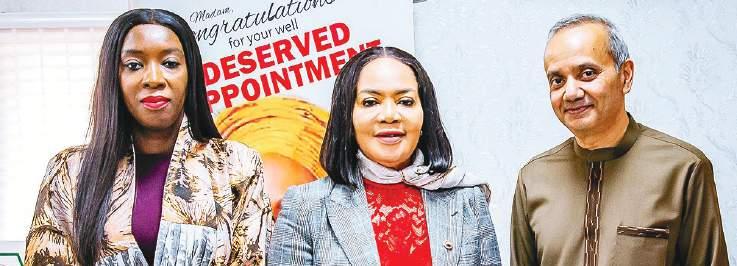
Strategic meeting on human capital development and mitigation...
Okonjo-Iweala: People Everywhere are Feeling Anxious About the Future
Warns against taking global trade's resilience for granted
ndubuisi Francis in Abuja
The Director General of the World Trade Organisation (WTO), Dr. Ngozi Okonjo-Iweala has expressed concern that "people everywhere are feeling anxious about the future," a development, she said, will be felt at the ballot box this year as 60 countries, home to nearly half of the world's population, go to the polls.
Her concern stemmed from increasing global tensions, higher food prices, energy, fertiliser, and other essentials, as well as shipping disruptions in vital waterways like the Red Sea and the Panama Canal.
The two-time Nigeria's Minister of Finance raised the concerns during
her opening remarks at the ongoing Ministerial Conference (MC13) of the WTO, in the United Arab Emirates (UAE).
She said: "If we thought the world looked tough in mid-2022, when we were slowly emerging from the pandemic, and the war in Ukraine had shaken food and energy security, we are in an even tougher place today.
"Looking around, uncertainty and instability are everywhere. Geopolitical tensions have worsened. Conflict has spread, as we see here in the Middle East, and — away from the headlines — across parts of Africa and the Arab world.
"We must not forget the conflict
in Sudan, which has displaced close to eight million people internally and across borders, or the conflict in the east of the Democratic Republic of Congo.
"Higher prices for food, energy, fertilizer, and other essentials continue to weigh on people's purchasing power, fuelling political frustration.
"Shipping disruptions in vital waterways like the Red Sea and the Panama Canal are a new source of delays and inflationary pressure, offering a real-time reminder of the risks posed to global trade and output by security problems and the climate crisis.
"People everywhere are feeling anxious about the future — and this
will be felt at the ballot box this year as 60-odd countries, home to nearly half of the world's population, go to the polls."
She stressed that economic growth has lost pace although it held up better than expected, particularly in some major economies like the United States and India, resulting in a softer landing for the global economy than earlier anticipated.
However, she observed that there are places that are falling behind adding that the World Bank warned that the global economy is on track for its weakest five-year performance in 30 years.
According to her, in many developing countries, debt distress
Five Years After Leaving Office, Amosun’s Ex-aides Appeal to Abiodun to Pay Severance Gratuity
emmanuel addeh in Abuja
Ex-aides of the former Governor of Ogun State, Senator Ibikunle Amosun, have sent a passionate appeal to the incumbent Governor, Dapo Abiodun, to pay their severance gratuity denied them since they left office in 2019.
Representatives of the former Special Assistants, who served between 2015 and 2019, Gbenga Adekanmbi, Musiliu Oladeinde and Olusola Balogun, stated in a statement that all efforts to make Abiodun pay the gratuity have failed.
They lamented that this has caused them financial, mental and physical trauma and that the value of their allowance has depreciated heavily.
The former political appointees appealed to the governor to consider them in the N5 billion palliatives recently released by him to cushion the consequences of the current hardship on the residents, staff and retirees.
Their plight, they said, is made worse, as most of them could not return to their places of work, which they had to leave to serve the state, noting that this has grave consequences on the upkeep of their families and their personal well-being.
They wondered why the state government continues to ignore them, despite the formal appeals made in three letters to the governor as well as those sent to the Speaker of the state House of Assembly, the Secretary to the State Government, the Chief of Staff and the Senior Special Adviser to the Governor.
“We recall the acknowledgment of receipt of our letters and the promise made by the governor to look into our request when he met with our representatives at the Presidential Lodge, Ibara, Abeokuta, on September 1, 2022, ahead of the 2023 elections.
“We know His Excellency as a magnanimous and empathetic leader, who, on assumption of office, not only retained the thousands of workers employed and the Permanent Secretaries promoted in the twilight
of the government of his predecessor but also fulfilling his promise to pensioners," they said.
In one of the letters sent to the governor, dated August 5, 2012, and signed by Soyombo Opeyemi, Olusola Balogun, Lanre Adeagbo and Gbenga Adekanmbi, the former appointees said, “We, the undersigned, representatives of Special Assistants to the governor who served Ogun State Government between the years 2015 and 2019, earnestly appeal to Your Excellency to pay our severance
House Halts
allowance. Many of us resigned our jobs in order to serve our state.
“As the current helmsman, you would have taken cognisance of our plight during the four years of our faithful and selfless service.
“ As we noted in our earlier letter on the subject matter, dated June 6, 2019, we humbly appeal to Your Excellency to kindly offset the severance in order to encourage sacrificial service to the good people of Ogun State by public office holders,” they concluded.
and high financing costs remain a drag on economic prospects.
The former minister and World Banking managing director noted that the pandemic ended a roughly 25-year-long trend during which, for the first time in centuries, poor countries began to narrow the income gap separating them from rich ones.
Several countries in Africa are already well into a lost decade, and are in danger of falling even further back, she noted.
She explained that trade itself has been resilient in recent years despite the humongous challenges, but cautioned that it would be dangerously naïve to take trade's continued resilience for granted
"We can be proud of the fact that trade itself has been resilient in recent years. Despite everything we have been through, global goods and services trade remain at or near record highs.
"International markets anchored in the rules-based global trading system have stayed broadly open, helping businesses, households, and economies adapt and adjust to one shock after the other.
"The global economic slowdown and wider uncertainty are already having an impact. Global merchandise trade volume growth in 2023 appears to have fallen short of the 0.8% we were projecting in October.
"And given all the downside risks, we may likely undershoot the 3.3% merchandise trade growth rate I just referred to for this year.
In addition, multilateralism is under attack. Despite the MC12 fightback, the Multilateral Trading System, which I term — a global public good since it was created 75 years ago — continues to be misconstrued in some quarters and undermined.
"Trade has become a four rather than a five-letter word in some quarters.
Yet trade remains critical to delivering on so many national and global priorities: boosting growth, expanding economic opportunities, meeting the Sustainable Development Goals, and solving collective action problems like protecting our environment or preparing for the next pandemic," Okonjo-Iweala stated.
Without cooperation on trade, she argued, "we would move towards an increasingly fragmented world economy, and all of these priorities would become harder, costlier, and in some cases impossible to achieve. People would become more disappointed, more vulnerable, more frustrated."
In light of these realities, she expressed the need for the WTO to stand strong as it approaches its 30th anniversary.
She also underscored the need to keep reforming and reinvigorating the WTO so that it can deliver for trade in the years ahead: seizing the full potential of services and digital trade, accelerating trade for the green transition, and fostering socio-economic inclusion.
Implementation of Revised Guidelines for Verification of Nurses, Midwives
Wants army, police, others to adopt domestic tech products to fight insecurity
The House of Representatives has urged the Nursing and Midwifery Council of Nigeria not to implement the Revised Guidelines for Verification dated February 7, 2023, pending the investigation by the lawmakers.
It has also mandated its House Committees on Health Institutions and Legislative Compliance to investigate the controversy surrounding the guidelines and report to the House within six weeks.
These resolutions followed the adoption of a motion of urgent public importance on the urgent
need to stop the implementation of the guidelines moved by Hon. Dr.
Patrick Umoh at plenary yesterday.
He Further noted that the revised guidelines, among others, stipulates that applicants for verification must have a minimum of two years post qualification experience from the date of issuance of permanent practice licence; obtain a letter of good standing from the Chief Executive Officer of applicant’s place of work and the last training institution attended, and that processing of application shall take a minimum of six months.
"The National Assembly is the body empowered by the constitu-
tion to make laws for the country, and the requirement of two years post-qualification experience by the Nursing and Midwifery Council is to legislate through the back door, and therefore a usurpation of the powers of the National Assembly.
“The requirement that applicants for verification must obtain a letter of good standing from the Chief Executive Officer of applicant’s place of work is capable of creating forced labour and modem slavery as applicant will be forced to be subject to the whims and caprices of applicant’s employer," he argued.
The House thereafter mandated
its committees on health institutions and legislative compliance to ensure compliance with the resolution.
Meanwhile , the House has urged the Nigerian Army, Police, Department of State Service (DSS) and the National Intelligence Agency (NIA) to speedily collaborate and adopt tech products of domestic agencies as Nigerian Communications Satellite (NIGCOMSAT), National Space Research Development Agency (NASRDA) and National Information Technology Development Agency (NITDA) to fight insecurity in Nigeria.
This resolution followed the
adoption of a motion on the Need to Adopt Home Grown Technological Solution and Incorporate Domestic Technology Service Providers Agencies in fighting Insecurity in Nigeria moved by Hon. Mohammed Bio at plenary on Tuesday.
Bio noted that Nigeria was battling all forms of insecurity ranging from banditry, terrorism and kidnapping, adding that recently in Kogi, Ekiti, Lagos, Zamfara, Kaduna, Taraba, Nasarawa States, citizens were kidnapped, ransom demanded and some killed, including the three Kings in Ekiti, Kwara and the young ones in Federal Capital Territory (FCT).
42 WEDNESDAY, FEBRUARY 28, 2024 • THISDAY NEWS
L-R: Senior Special Assistant to the President on Technical, Vocational and Entrepreneurship Education, Madam Abiola Arogundade; Honourable Minister of Labour and Employment, Hon. Nkeiruka Onyejeocha and World Bank Country Director for Nigeria, Shubham Chaudhuri during a strategic meeting on human capital development and mitigation of unemployment in consonance with the renewed hope vision in Abuja ... yesterday
Juliet akoje in Abuja
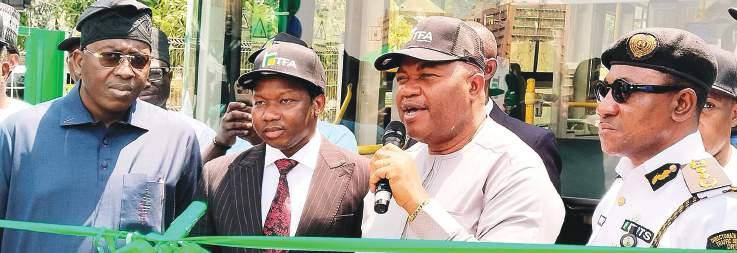
Flag-OFF OF TraNspOrT FOr all iN abuja...
L-R:
CDS to Nigerians: There’s Power in Spoken Words, Stop Cursing Your Country, Leaders
Rationalises non-kinetic approach in terrorism war
Kingsley Nwezeh in Abuja
The Chief of Defence Staff (CDS), Gen. Christopher Musa, yesterday, called on the citizenry to desist from the habit of raining curses on the nation and its leaders.
Musa warned that Nigerians must realise the efficacy and power of the spoken word and its capacity to do damage.
He also explained why the Nigerian military was deploying more non-kinetic approach, which he said was due to its effectiveness in combating terrorism and other security challenges in the country.
“But we will do everything possible to conduct business recognising that we are in a position of trust and we will not betray that trust.
I am not on the fiscal side, and we were fortunate that in the process of having the MPC, we have very senior representation of the fiscal and hopefully should help on the handshake.”
The CBN governor also stated,
“From the perspective of the CBN, hard decisions have been taken and since the CBN can’t do it alone, we have to work together. We see a lot of the reforms on the fiscal side helping to create a better environment for Nigeria.
“Nigerians must understand and see where the future is going. Tax to GDP of 7.1 per cent is one of the lowest. The recommendation for proper development is in the region of 30 upwards.”
However, reacting to the outcome of the MPC meeting, the Centre for the Promotion of Private Enterprise (CPPE), yesterday, declared that raising the MPR from 18.75 per cent to 22.75 per cent would hurt the real sector of the economy, which was already contending with numerous macroeconomic challenges.
An economist and Chief Executive Officer of CPPE, Dr. Muda Yusuf, also said the increases in MPR as well as the CRR from 32.5 per cent to 45 per cent would constrain the capacity of banks to support economic growth and investment, especially in the real sector of the economy, because the increases were quite significant.
Yusuf said, “The new dramatic increase in MPR to 22.5 per cent hike means that the cost of credit to the few private sector firms that have exposure to bank credits will increase, which will impact their operating costs, prices of their products, and profit margins, amidst very challenging operating conditions. The equities market may also be
He spoke at a one-day seminar themed: "Civil Military Relations: Non-kinetic Efforts of the Nigerian Military in Security Management, Challenges and Prospects," organised by the Defence Correspondents Association of Nigeria (DECAN) at the Army Resource Center in Abuja.
He said Nigerians must be positive about the nation for it to move forward.
"There must be a nation before you can even discuss it and that is very critical. Sometimes, I find it very hard to understand when I hear Nigerians speaking evil about their country.
adversely impacted by the hike.”
Yusuf added that the decisions of the MPC, which were consistent with the typical policy response of the central banks globally, failed to reckon with domestic peculiarities of the Nigerian economy.
According to him, the key drivers of Nigeria’s inflation are largely supply-side variables, and the CBN ways and means financing.
The CPPE chief executive stated, “Over the last two years, there had been persistent monetary policy tightening, yet there has not been any significant impact on the inflationary pressures. If anything, the general price level had been continuously on the increase.
“We recognise that the primary mandate of the CBN is price stability, but numerous headwinds had posed significant risks to this critical objective. Some of these include the surge in commodity prices and impact on energy cost, disruptive effects of insecurity on agricultural output, global supply chain disruptions and the surge in ways and means finance. The hike in MPR or CRR would not change these variables.
“Already, bank lending has been constrained by the high CRR, which was until the latest review, 32.5 per cent, although many operators in the sector claim that effective CRR is as high as 50 per cent for many banks via the discretionary debits by the apex bank.
“The credit situation in the economy is already very tight, with lending rate ranging between 25 and 30 per cent. The Nigerian banks are yet to live up to their financial intermediation role because of these constraining factors.”
Yusuf added, “The Nigerian economy is not a credit driven economy, unlike what obtains in many advanced economies, which have much higher levels of financial inclusion, robust consumer credit
"We all know as Africans that there's power in the word. What you say means a lot. We must learn how to be positive about our country. That's the only way we can be productive.
"We have seen countries, most countries, it's not like they don't have issues, but they don't put their own problems in the forefront like we do and that is what is affecting us as individuals.
"So, it's important that we must take ownership of our country. We must wish our country well and our leaders well. When they err, let us call them to question and proffer
framework, and strong correlation between interest rate and aggregate demand.
“Bank credit to private sector as a percentage of GDP was 14 per cent in 2022 in Nigeria. It was 59 per cent in South Africa, 30.9 per cent in Egypt, 30 per cent in Botswana, 51.6 per cent in the United States and 130 per cent in the United Kingdom. These underscore the variabilities across economies; thus, policy responses have to be different.
“The transmission effects of monetary policy on the Nigerian economy are still very weak. In the Nigerian context, price levels are not interest sensitive. Supply side issues are much more profound drivers of inflation.”
MAN Urges CBN to Adopt Managed Float Exchange Rate System
Earlier yesterday, before the MPC increased the MPR, Manufacturers Association of Nigeria (MAN) called on the federal government and the central bank to provide single digit credit facilities to operators in the manufacturing sector.
The call was made by President of MAN, Mr. Francis Meshioye, during MAN’s Presidential Media Luncheon.
Meshioye also called on the CBN to develop a sustainable framework to channel credit interventions to the manufacturing sector.
“Additionally, it (CBN) should mobilise commercial banks to intentionally provide long term single digit interest loans to the manufacturing sector to fast-track the actualisation of a $1 trillion economy,” he said.
The MAN president insisted that a single digit loan to manufacturers was feasible if the government wanted to do it.
He stated, “One thing that government needs to be conscious of is
solution," he said.
The defence chief further lamented that, "It's not just negative criticism. Every day you are insulting, you are abusing. You are calling God to punish.
"No, you cannot kill your country because you feel it is just that you feel like that. You don't grow a country with such attitude. There must be a nation before you can even discuss it, and that is very critical. Sometimes I find it very hard to understand when I hear Nigerians speaking evil about their country,” he added. Explaining further why the Nigerian military was deploying
that there should be no competition between industrial banks and commercial banks.
“The Bank of Industry (BOI) loans to manufacturers should be seen as facilities to improve the economy. It should not be benchmarked to loans given to traders to import finished goods. They are not the same.
“So it is feasible. It is just for the government to see it as what it should do, which will also benefit it by reducing the cost of production, lowering price of locally manufactured goods and improving exports of manufactured goods to bring in more foreign exchange.
“Our prayer to the government is that it should be deliberate that loans for inputs for manufacturing should be single digit. If we will not have manufacturers’ bank, we will have a window that takes care of manufacturers. We insist on this. It should be single digit for manufacturing inputs.”
Meshioye added, “Our country’s economy is in a dire state and our policymakers, more than ever before, need to be intentional about growing the manufacturing sector. There is no country considered as developed that does not give priority attention to the manufacturing sector.
“There is no gainsaying the fact that manufacturing is pivotal to galvanising and sustaining the economic growth and development of Nigeria.
“The government needs to come to the realisation that a win for the manufacturing sector is a win for the economy and by extension a better life of the citizenry.”
He urged the government to, “Prioritise forex and credit allocation to the manufacturers and reduce the number of BDCs into large and wellestablished operators to curb their excesses and untoward operations through effective management and supervision.”
more non-kinetic approach in the war against terrorism, he said it was more effective in combating terrorism and other security challenges in the country.
He said the traditional notion of war relying heavily on kinetic means was gradually being relegated and the Nigerian military was keen to possess and apply non-kinetic approaches to project power, secure interests and solve problems.
He said the seminar was timely considering the the significance of non-kinetic approach in winning the battle against terrorism and other security challenges.
“Nigeria, as a diverse and complex nation, faces a mirage of security threats that demand our varying attention and concerted efforts to address.
“From separatism, insurgencies and terrorism to intercommunal conflicts, transnational organised crimes and the mirror of other security challenges, the task of securing our nation is formidable and tasking.
“In tackling these threats, we are not unmindful of the shift from seeking victory through kinetic means.
“Though the overall power potential of the country is still being determined by conventional military artists, there is no doubt that the non-kinetic means are becoming more relevant in the power potentials of Nigeria.
“The armed forces of Nigeria, being the key driver encountering the myriad of security threats nationwide, has sustained non-military and soft strategies as a means to an end of this multifaceted threats," he said.
The defence chief said the military all over the world had learnt that when dealing with non-state actors, the military and the adversaries struggle for the hearts and minds of the citizens, hence the Nigerian military worked to be ahead of adversaries.
Continues online
832 Persons Orphaned by Boko Haram Graduate from Vocational School, Get N1.2bn Kits in Borno
Michael Olugbode in Maiduguri
A total of 832 artisans, mostly orphaned as a result of the over a decade-long Boko Haram insurgency, have graduated from the Borno State Enterprise Institute.
The event was presided over by the Borno State Governor, Babagana Zulum yesterday at the Muna Vocational Enterprise Institute, along the Dikwa-Gamboru highway in Jere Local Government Area.
The trainees were selected from across the 27 local government areas of Borno State and have undergone training in 14 different trades; among them, 54 graduates specialised in aluminium fabrication, 29 in bricklaying, 48 in carpentry and 73 in information technology.
Others include: 41 specialising in barbing, 46 in electrical work, 85 in leatherworks, 40 in plumbing, 72 in mechanics, 67 in solar technology, 148 in tailoring, 18 in tie and dye, 59 in welding and 53 in hairdressing.
In his address, Zulum said similar vocational institutes were established in Biu, Shani, Mafa and Magumeri. At the same time, he revealed that plans were being made to revive
“It is not worth the enforcement of Nigerians' non-kinetic efforts towards winning the hearts and minds of citizens and encouraging other sectors of the society to take ownership of the situation in order to contribute meaningfully to defeating the multifaceted threats,” he said. vocational centres in Dikwa, Kaga, Ngala, Gajiram and Monguno.
The governor noted that the vocational institutes were established to address the challenges of youth unemployment and provide a means of livelihood to the people.
He said: “Upon assuming office, one of the primary objectives of my administration has been youth empowerment. We were acutely aware of the devastating impact of insurgency on our communities, leaving many without means of livelihood and leading to widespread unemployment, idleness, and despair. As the saying goes, "an idle mind is the devil's workshop.
“To address these challenges head-on, we established Vocational Enterprise Institutes, focusing on admitting vulnerable individuals, particularly those affected by the insurgency, to equip them with skills for sustainable livelihoods.”
Earlier in his address, the Commissioner for Education, Science, Technology and Innovation, Lawan Wakilbe said with funding allocated by Zulum to the Technical and Vocational Enterprises, the output across all centres is targeted at over 4,000 artisans annually.
NEWS THISDAY • WEDNESDAY, FEBRUARY 28, 2024 43
In UnpreceDenTeD OffenSIve TO TAme InflATIOn, cBn rAISeS mpr TO 22.75% frOm 18.75%
Member House of Representatives, Dauda Nyampa; Managing Director, Transport For Abuja, Yakubu Teri; Mandate Secretary, Transport Secretariat FCTA, Uboku Nyah and Director, Directorate of Road Traffic Services, Dr. Abdulateef Bello, during the flag off of Transport For All in Abuja ... yesterday PHoTo: KINGSLEY ADEBoYE
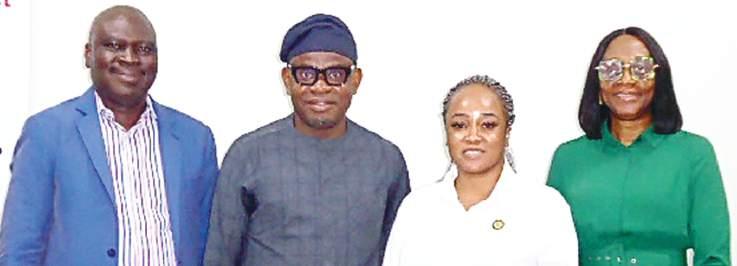
COMPLIANCE ON THEIR MINDS...
House Committee Summons CBN Governor Over REMITA Leakages
Juliet Akoje in Abuja
The House of Representatives’ Public Accounts Committee yesterday summoned the Governor of Central Bank of Nigeria, CBN, to unfailingly appear before it on Tuesday March 5 over issues with
leakages through the REMITA platform.
The Chairman of the Committee, Hon Bamidele Salam, made the summons in a letter to the CBN Governor titled RE: Investigation Of Revenue Leakages Through Remita Platform And Non-Compliance
Substantively With Standard Operating Procudure And Other Allied Service Level Agreement 2023 (Hr.373/11/2023).
Salam said that the CBN Governor's failure to appear before the Committee and respond to the issues has greatly stalled this
Committee’s investigative process on revenue leakages through the REMITA platform.
"You are strongly advised to take good advantage of this invitation and appear before the Committee unfailingly on Tuesday 5th March, 2024 at 10:00am in Meeting Room
10-Member Senate Adhoc Panel to Probe $496m Paid to Moribund Ajaokuta Steel Firm
Sunday Aborisade in Abuja
The Senate yesterday constituted a 10-member adhoc committee to investigate reasons the moribund Ajaokuta Steel Company and the National Ore Mining Company (NIOMCO) remained moribund despite the alleged payment of $496 million to contractors handling projects from 2008 till date.
The Deputy Senate President, Barau Jibrin who presided over the plenary announced the composition of the committee.
Barau named senators Adeniyi Adegbonmire and Suleiman Kawu, as Chairman and deputy chairman of the committee, respectfully.
He directed the committee to report their findings back to the senate for debate and adoption within two weeks.
The resolution was sequel to a motion sponsored by the senator representing Kogi Central, Natasha Akpoti-Uduaghan.
Members of the committee are,
Natasha Akpoti (PDP, Kogi Central), Onawo Mohamed (PDP, Nasarawa South), Joel Ewomazino (PDP, Delta South) and Onyesoh Heacho (PDP, Rivers East).
Others are Abdullahi Yahaya (PDP, Kebbi North), Patrick Ndubueze (APC, Imo North), Tokunbo Abiru (APC, Lagos East) and Osita Ngwu (PDP, Enugu West).
Akpoti-Uduaghan, while presenting the motion identified 'political will' and 'bureaucratic corruption' as major factors that contributed to the moribund state of the Ajaokuta Steel.
She explained that the investigation would uncover the circumstances that led to the re-concession of NIOMCO.
The Senator urged the upper chamber to prove the payment of $496m allegedly made to the Chairman, Global Infrastructure Holdings Ltd (GINL) by the Federal Government in September 2022 as settlement over ASL contractual disputes.
She said the Ajaokuta Steel and
NIOMCO were set up by the Federal Government in the late 70s to establish Nigeria as a leading steel exporter but have been inoperative for decades due to a lack of political will and bureaucratic corruption.
She explained that since 1994, when the Tyazhpromexport (TPE) exited the Ajaokuta Steel on alleged ground that Nigeria did not discharge fully its financial obligation to the TPE, the Ajaokuta Steel was reportedly at 98% completion yet remains inoperative to date.
She said, "After reviewing the Inuwa Magaji Administrative Panel of Inquiry Report on the late President Umaru Yar'adua, the Federal Executive Council unanimously terminated the Concession Agreement on April 2, 2008.
" The termination was due to the operations of ASCL, NIOMCO, and Delta steel mills, as well as breach of agreement and unwholesome practices. Additionally, the Concession Agreement was found to be unpatriotically skewed in favour
of GINL.
"The House of Representatives had conducted an investigation into the Iron and Steel Sector in 2018 with far-reaching resolutions aimed at resuscitating the ASCL and ANIOMCO steel mills.
"However, the Federal Government either ignored these resolutions or has not implemented them yet.
"Many steel-producing countries are disturbed by the $253 million organized economic crimes in India.
"Additionally, GSHL's Pramod Mittal is notorious for engaging in questionable business activities such as embezzlement and asset-stripping in countries like Bulgaria, the Philippines, Libya, Bosnia, Zimbabwe, Montenegro, Serbia, and many more.
"In Bosnia, Pramod Mittal, who is associated with GSHL, was arrested and charged with organized crime. Additionally, GSHL's management staff were jailed for economic crimes.
Continues online
446, House of Representatives’ New Building to respond to the issues that will arise during the hearing session. You are also advised to come along with all relevant Officers who are familiar with the issues at stake and may assist you provide answers to any question that could arise during the Session.
"Please refer to your representation before the Public Accounts Committee on Tuesday 27th February, 2024 by an Assistant Director without a written letter to that effect. Be advised, the Committee does not allow representation, all Chief Accounting Officers are to appear in person to defend their Office.
"Recall that the Committee has sent several correspondences to your Office on the same subject with Ref. Nos: HR/PAC/SCO5/10NASS/ HR.373/11/2023/1/2, dated 8th December, 2023; HR/PAC/SCO5/10NASS/ HR.373/11/2023/1/31, dated 19th January, 2024; HR/PAC/SCO5/10NASS/ HR.373/11/2023/1/60, dated 25th January, 2024 and HR/PAC/SCO5/10NASS/ HR.373/11/2023/2/84, dated 19th February, 2024, and observed your absolute disregard for its Constitutional mandate. Please find copy of letters attached."
He further added, "Your failure to cause appearance before the Committee and respond to the issues has greatly stalled this Committee’s investigative process on Revenue leakages through the REMITA platform.
"The Committee also wishes to
draw your attention to previous letters on various subject matters, of which you are yet to respond to, please find references below: HR/PAC/SCO5/10NASS/ QUE.2/29 dated 23rd January, 2024; HR/PAC/SCO5/10NASS/ FA/1 dated 23rd January, 2024; HR/PAC/SCO5/10NASS/SE.3/34 dated 30th January, 2024 and HR/ PAC/SCO5/10NASS/SE.3/35 dated 22nd February, 2024. Please also find copy of letters attached.
"The Committee frowns at this and wishes to remind you of the relevant constitutional provisions Sections 62 and 89(1) (a, b, c & d) & (2) of the 1999 Constitution of the Federal Republic of Nigeria (as amended), the Public Accounts Committee has the power to summon any person in Nigeria to give evidence, produce any document in his possession and under his control."
Furthermore, "It may also interest you to note that the Committee under Sections 89 (1) (d) the Committee has power to issue a warrant to compel the attendance of any person who, after having been summoned to attend, fails, refuses or neglects to do so.
"Failure to comply with this civil invitation may leave the Committee no choice but to issue a warrant of arrest against you in line with Legislative Houses (Powers & Privileges Act 2017) (Sections 2 & 3) and the 1999 CFRN (as amended) in line with House Procedures. Consequently, the Committee resolved to grant you one last opportunity to appear."
INEC Begins Defence of Election Which Produced Diri as Bayelsa Governor
Alex Enumah in Abuja
The Independent National Electoral Commission (INEC), will on Monday March 4, begin its defence of the November 11, 2023, governorship election that produced Douye Diri as re-elected governor of Bayelsa State. This is following the closure of the case of the petitioners on Tuesday.
Besides INEC, the governor, his deputy, Senator Lawrence Ewhrujakpo and the Peoples Democratic Party (PDP) are also expected to open their defence next week.
Former governor and immediate past Minister of State for Petroleum, Chief Timipre Sylva and his party, the All Progressives Congress (APC), are challenging the Independent
National Electoral Commission (INEC) declaration of Diri as the winner of the November 11 governorship poll in Bayelsa State.
According to them, the electoral umpire denied them of votes in their "strong areas", when it cancelled results in three Local Government Areas of Nembe, Ogbia and Southern Ijaw, on alleged disruption of the electoral process and diversion of electoral materials.
However, after calling a total of 52 witnesses, out of the 224 lined up to prove their allegations against the election, the petitioners announced that they were satisfied with the prosecution of their case and would like to close it.
Amongst those who testified at Tuesday's proceedings are; former
Commissioner of Police in Bayelsa State, Mr Tolani Alausa and the APC's State Collation Officer, Mr Dennis Otiotio.
Alausa, who was led in evidence by petitioners' lead counsel, Mr Onyechi Ikpeazu (SAN,) adopted his witness statement on oath dated December 1, and tendered several exhibits to support claims of the petitioners that election actually took place in the disputed local government areas and results announced at the polling units.
During cross-examination by INEC's lawyer, Chief Charles Edosanwan (SAN), the witness admitted that his role during the election was seen as controversial and that several protests were held for and against his further stay as
police chief in the state.
Alausa, also denied testifying in favour of the petitioners stating that he was at the tribunal following a letter from the Inspector General (IG) of Police. He stated that the documents he tendered before the tribunal were brought to him by police officials who participated in the November 11 governorship election in Bayelsa State and were kept with the Deputy Commissioner in charge of Operations.
Under cross examination by the Peoples Democratic Party (PDP) lawyer, Mr Tayo Oyetibo (SAN), the witness admitted that he took away a Prado Jeep given to him by the governor for his operation but had to return it after the governor
wrote the IG requesting that the vehicle be returned to the state command for use. He said he was indifferent over the request for the return of the vehicle, when asked whether he was unhappy over the demand that he returns the vehicle.
In his own evidence, a star witness of the petitioners, Denis Otiotio, who is a legal practitioner and Collation Officer of the APC, in the disputed election also tendered several documents including results sheets, protest letters to INEC and security agents as well as a Certified True Copy (CTC) of the tribunal's order for inspection of electoral materials.
Under cross examination, Otiotio claimed that election took place in
his polling unit as well as 14 other pollingWhenunits.confronted with INEC's voter register in respect of his polling unit, showing that neither was his name nor that of others ticked to prove that they voted at the election they are claiming they won, the witness informed the court that the register before him was not same used during the November 11 governorship election. He further stated that when they went to INEC for inspection of electoral materials on the orders of the court, one INEC's staff, (a lady he pointed to at the court) had informed him that they didn't have the register.
Continues online
44 WEDNESDAY, FEBRUARY 28, 2024 • THISDAY NEWS
L-R: Director, Public Procurement Unit, Lagos State Real Estate Regulatory Authority (LASRERA), Mr Toafeek Oseni; Special Adviser Taxation and Revenue for Lagos State, Mr Opeyemi Ogungbo; Special Adviser to Lagos State Governor on Housing, Barr. Barakat Odunuga-Bakare; and Director, Monitoring and Compliance Department, Lagos State Real Estate Regulatory Authority (LASRERA), Mrs Tope Akinbola during a meeting with SA Taxation at Ikeja... recently
Sylva, APC close case after 52 witnesses
FIVE MONSTERS NIGERIA MUST TAME
homogenous sub-nationals with reasonable degree of autonomy, within a broader federal structure, is not just imperative; it is an act which time has come!
One thing that is so obvious from all of these is that these times call for new vision. They call for creative thinking out of the neo-liberal paradigm box, and out of the box of international organizations structured to continue to hold us down. The good news is that we don’t have to reinvent the wheel.
The Asian Tigers that have broken out of this box and enacted impressive development in recent times hold out lessons for us. A look at Japan and China also tells the same tale.
We have to look inwards and leverage on our strength. We must be disciplined and creative. Through leveraging on initial demographic advantage, cheap labour and aggressive export with creative Import Substitution, subsidy administration, general protection of local industries, sequenced financial liberalization, reverse engineering (even at times, breaching intellectual property regulations), Japan, China, the Asian Tigers and the emerging Asian Cubs have been able to post phenomenal developmental strides.
It bears repetition again, that creative, locally driven economic development paradigms with massive investment in relevant education and skill sets, is the way to go. Think of it for a moment. After so many years of producing world class engineers, we can’t deploy indigenous know-how to build the second Niger bridge, or any of our major motorways for that matter. After so many petroleum engineers, we can neither build refineries nor maintain existing ones built for us by foreigners. In spite of all year-round sunshine, so many engineers and abundant natural resources, we import solar panels from countries with just three months of sunshine.
After so many doctors, and midwives, we have the trophy of the second highest number of pregnant women dying in pregnancy. Our top professionals are voting against our dysfunctionality by ‘JAPAing,’ and we seem to be helpless.
US President J.F Kennedy, in 1960, gave vent to a vision of landing human beings on the moon. In 1969, a year short of his target, the mission was accomplished. But beyond landing humans on the moon, the Apollo programme sparked innovation in aeronautics, nutrition, material science, electronics, software and other areas. We can make do with our own moon-shot vision now!
Still on leadership; one thing that has become obvious over the years is the convoluted leadership recruitment pattern that our country seems wedded to. The outcome has been the crises of governance, which has defined the Nigerian state in the past few decades. We, therefore, need to encourage a conversation on this, with a view to engendering a leadership recruitment process imbued with the support base requisite for legitimacy, without which government cannot be effective. It is trite to aver that this cannot be achieved unless we clean up our electoral process in such a holistic manner as to inspire confidence at home and respect abroad.
I like to take a look at our fetish of ‘market forces,’ ‘government has no business in business,’ ‘subsidy distorts market,’ ‘ease of doing business,’ sacrosanctity of foreign direct investment (FDI), and
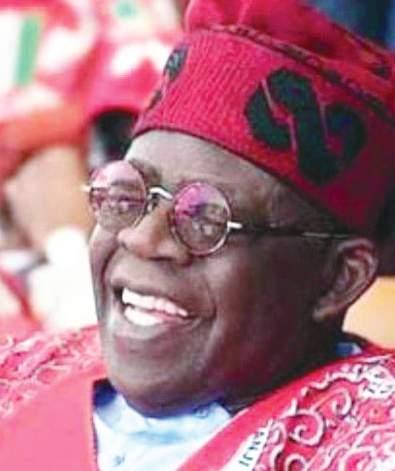
other neo-liberal jargons, packaged and delivered as drivers of development. These must be properly interrogated and creatively applied to our current situation. We must think like the children of Issachar, ‘that have understanding of the time.’ The high priests of neo-liberalism and globalization are gradually moving in the direction of Industrial Policy and protectionism. As noted earlier, the USICA, Chips for America Act, Buy America policy, etc., are some of the initiatives speaking to this new thinking among former patron saints of neoliberalism. And so, the question, what are we waiting for?
In conclusion, I argue that for us to get out of our present miserable level of underdevelopment, we must tame the monsters of the crisis in a holistic and composite manner.
My B OSS , D ISTINGUIS h ED S ENATOR U DOMA , I S 70
who could deliver on strategic tasks. He related with others through the Permanent Secretary.
As Minister, Senator Udoma would only take allowances attached to his office which he considered essential. No extras, just the exact amount. Any extra expenses incurred by him even on official assignments were paid from his pocket. He did that several times during foreign trips when hotel rates and entertainment bills were higher than his officially approved estacode. No refunds from the office. He always absorbed them.
To the consternation of officials of the Ministry, he even rejected Sitting Allowance. He insisted that as Minister, his job largely entails having meetings. He is already being paid as Minister, so why should he collect any allowance for sitting in a meeting which is part of the job? The first day a list was taken to him for approval, he not only rejected but cancelled the entire memo. This did not go down well with the civil servants who were used to the largesse over time. Subsequently, such lists were sent without his name to the Permanent Secretary for approval, since it was usually within the approval limit of the Permanent Secretary.
Coming from the private sector environment into a core public service situation, even as an embedded Adviser, presented a completely brand new experience for me. I came to know first-hand why a lot of things do not, and are not likely to work in Nigeria except a thorough re-orientation or drastic purge is carried out. Public servants are not just ready to make things work for the common good. They have a potent capacity to cripple and frustrate the most enthusiastic leader. But Senator Udoma found a way around it and achieved results in spectacular ways, especially when he conceived and executed the Economic Recovery and Growth Plan (ERGP 2017- 2019). It was his flagship project and a landmark economic plan that was applauded across the world at global economic gatherings.
However, the bureaucratic nature and laidback orientation of the civil service presented a major risk factor for projects as the pace of execution was often constrained by processes, procedures and petty attitudes that have continued to bedevil the system. It has
nexus between local production and consumption.
Tame our Procreative Proclivity. The growth of our population continues to outstrip our economic growth. We have grown from 45 million in 1960 to about 230 million in 2023 (more than 500% growth). For context, UK, which was 53 million in 1960 (bigger population than Nigeria), has only grown to 67 million today, a meagre 126% increase. Depending on our development paradigm choices, this large and youthful (more than 60%) population of ours can benefit from what demographers refer to as demographic dividend or demographic bomb! With the present level of youth dependency and restiveness, manifesting in the widespread agitations of #EndSars, and recent sporadic protests against rising cost of living, time seems to be ticking. The choices we make today will prevent the coming explosion. In a development milieu of creative Industrial Policy, financial targeting and aggressive investment in education and skills-set, and vastly increased governance integrity quotient, we may yet escape the bomb detonating.
Tame our Penchant for Corruption. Need I say anything further on the monster of corruption, how it fundamentally constrains development possibilities on all fronts, and the need to deal with it in a decisive and sustained manner? Conceived as ‘abuse of entrusted power for private gains,’ by Transparency International (2023), ‘corruption erodes trust, weakens democracy, hampers economic development and further exacerbates inequality, poverty, social division and the environmental crisis’ (Ibid). There is the commonality of opinion among the citizens of Nigerian, civil society, and development partners – practically everyone that the country has zero chance of development as long as the State continues to be the platform for primitive accumulation and rent seeking in the hands of its privileged elites. The need to deploy more of technology than admonitions in attacking corruption from the roots cannot be overemphasized. This, indeed, should rank high among the priorities of all governments, going forward.
Tame our Psyche. I have spoken earlier of a risorgimento of mental dignity and confidence, a deconstruction of mental slavery, a can-do spirit. Need I emphasize that this must percolate from top down, in a manner that is encapsulated by the popular maxim, that a nation rises and falls on leadership?
Tame our Palate for imported goods and elite greed. So, the popular saying goes, we should consume what we produce, and produce what we consume. This will not come about through admonitions. In today’s interconnected liberal economy, with the rules skewed against us, through international institutions like the World Trade Organisation (WTO), we need deliberate financial, industrial and trade policies to accomplish the goal of creating the necessary

Tame our Political Structure. We have mentioned our defective structural birth, our defective 1999 Constitution (as amended), which are some of the drivers of economic mismanagement, underdevelopment, and insecurity. Now, a national consensus has more or less been developed on the need for multi-layered policing architecture to tackle insecurity. All that government has to do is emplace actionable RESTRUCTURING PLAN, short to long time; say, from Executive Orders and legislation on security, up to a new constitution. To my mind, this is the main challenge before the President Bola Ahmed Tinubu administration; and I shouldn’t have any doubt that going by his political antecedent and trajectory, Mr. President should have the clarity of vision, courage of conviction and determination to move our most tortured country to this desirable and rational end-state. My admonition is, let’s get started while there is still time!
*The full text is available online.
*Dr. Olusegun Mimiko, CON, Governor, Ondo State, 2009 – 2017 delivered this lecture at the 70th anniversary of Gboluji Anglican Grammar School, Ile-Oluji, Ondo State.
for the ministerial job, he had made up his mind to go into voluntary retirement at 65. That also included direct involvement in the management of his private businesses.
He was chairman of both the United Africa Company of Nigeria (UAC) and Union Bank Plc., at the time he was appointed Minister. He had to relinquish those positions to serve the country. He also stayed off his law firm, Udo Udoma & Belo-Osagie, during the period. He was 65 in February 2019. By May 27, 2019, he had cleared his table at the ministry and was out. All entreaties from the President, colleagues and friends to rescind the decision and return, even if it was to see his pet project the ERGP to an end, would not dissuade him. He left on May 27, 2019, when the first term of the Buhari Presidency ended, and I left at the end of June 2019 when my contract with DFID expired.
Senator Udoma was born on February 26, 1954. He attended King’s College, Lagos from 1966 to 1972. He studied at Oxford University, England, where he obtained a B.A. (Law) degree (1976) and a postgraduate B.C.L. degree in jurisprudence (1977). He was called to the Nigerian Bar in 1978. His legal expertise includes Company Law, Banking and Finance, Securities Law and Capital Market transactions. He also has some expertise in both Constitutional and Natural Resources Law. He is a founding, partner in the commercial law firm of Udo Udoma & Belo-Osagie.
At different times he was a Director of the Nigeria Economic Summit Group (NESG), Deputy Chairman of the Presidential Committee on the Review of the Nigerian Constitution, Chairman of the Task Force on the Petroleum Industry Bill, and pioneer Chairman of the Corporate Affairs Commission (CAC). He served for four years as part-time Chairman of the Nigerian Securities and Exchange Commission (SEC) and Chairman of the Presidential Committee on Waivers, Incentives and Concessions. He was elected twice into the Nigerian Senate (1999 and 2003 (Akwa Ibom South) and served as Chief Whip in his second term. He remains one of the finest gentlemen that this country has ever produced. He looks good at 70. Happy birthday Sir!
45 BACK PAGE CONTINUATION
Senator Udoma
President Bola Tinubu
become very clear generally that project implementation failures are not necessarily due to faulty policies and strategies but the civil service orientation that seems to place processes and procedures over results. Senator Udoma came with his known zeal and commitment to drive the system, particularly the nation’s economic growth, but the endemic nature of the system was a major drag on his pace.
Towards the end of the first tenure of Buhari as President, he called me into his office and informed that he would not return after the elections, even if the President got re-elected. He thought he should give his aides enough notice so they could also make their own exit plans. Apart from the fact that the system did not allow him to run at his desired pace, he pointed out that long before he was approached

INNOVATIVE SOLUTION AWARD…
Co-founder/Executive Director, Maple Leaf Early Years Foundation, Ifedinma Nwigwe(left), and Founder/Chairman of ESSL Foundation, Martin Essl, when Nwigwe received the Innovative Solution 2024 award by Zero Project Award at the United Nations office in Vienna, Austria…recently
Police Kill Suspected Kidnapper, Rescue Victims in Kwara
Hammed Shittu in Ilorin
Men of the Kwara State Police Command have killed a suspected kidnapper and rescued three kidnap victims in Alo village, Ifelodun Local Government Area of the state.
THISDAY investigations revealed that the victims were abducted at
about 3 a.m. last Saturday by a gang of suspected kidnappers, when the hoodlums carried out the attack on the camp of Alhaji Taofio Fulani in Alo Village.
It was also gathered that the pursuit of the kidnappers in a coordinated search operation by the police operatives and members of the local vigilante
JAMB Begins Sale of Direct Entry Today
KuniTyessi inabuja
The Joint Admissions and Matriculation Board (JAMB) has announced the commencement of sale of direct entry registration nationwide and in selected foreign centres.
Public Communications Advisor at JAMB, Dr. Fabian Benjamin, in a statement yesterday said that the registration process would start today February 28, 2024, and close on Thursday, March 28, 2024.
Benjamin noted that the sale of direct entry is open to foreign candidates desirous of tertiary education in Nigeria through the direct entry mode.
The JAMB spokesperson assured the public that the board would continue to ensure a level playing
field for all candidates irrespective of status.
He, however, warned that the board would not process candidates’ application from all awarding institutions that have refused to honour several requests for the verification of their A’Level certificates presented by some candidates for the 2023 admission.
“Candidates, who are not awaiting results, must have uploaded their A’Level qualifications, O’Level results and direct entry registration template at the point of registration because no direct entry candidate would be processed for admission until such claimed results are uploaded and verified by the awarding institutions on the board’s Central Admissions Processing System (CAPS) mail platform.
NiCFoST Seeks to Achieve Best Food Standards in Nigeria
Folalumi Alaran in abuja
The Nigerian Council of Food Science and Technology (NiCFoST) is seeking to achieve best food standards in Nigeria that would put the country on an international scale.
The Registrar/Chief Executive Officer, NiCFoST, Ms. Veronica Ezeh, stated this at a sensitiSation forum for federal and state ministries of agriculture and their Agricultural Development Programmes (ADPS) in Abuja
yesterday.
NiCFoST, a newly established regulatory council under the supervision of the Federal Ministry of Innovation, Science, and Technology, is focused on regulating the practice and profession of food science and technology in Nigeria.
This multidisciplinary course provides holistic skills and knowledge for the production and delivery of wholesome and safe food that meets the satiety and nutritional needs of the population.
Foundation Advocates Youth Participation in Electoral Reforms
Onuminya Innocent in Sokoto
A foundation, J-DEV in collaboration with National Democratic Institute (NDI) and National Endowment For Democracy (NED), has advocated youth participation in Nigeria electoral reforms.
Addressing journalists at the youth forum for the North-west, the Programme Manager of J-Dev Foundation , Sophie Akut, said they were in Sokoto to interact with youths from Sokoto, Kebbi
and Zamfara State.
Akut noted that the objective of the forum was to identify challenges encountered during 2023 elections and proffer solutions through engagements with relevant stakeholders.
She maintained that the responses and suggestions gathered during the forum will be taken to relevant authorities for scrutiny and consideration, stating that similar engagement is taking place in other geopolitical zones of the country.
in the surrounding bush led to an ensued gun duel, where one of the kidnappers was neutralised. A statement issued in Ilorin yesterday signed by the Police
Public Relations Officer (PPRO), Toun Ejire-Adeyemi, the police command said it also arrested seven suspected kidnappers and recovered arms and ammunition
from them.
The statement read: “On the night of February 24, 2024, at about 0030hrs, a gang of suspected kidnappers carried out a brazen
attack on the camp of Alhaji Taofio Fulani in Alo Village, Ifelodun LGA. During the attack, three persons were abducted and taken to an unknown destination.
50th Anniversary: PUNCH Photo Exhibition Opens Today, Soyinka to
Sunday Okobi
A three-day photo exhibition, as part of events marking the 50th anniversary of the PUNCH newspapers will open in Lagos today with a former Commissioner for Tourism, Arts and Culture in Lagos State, Steve Ayorinde, as curator.
The photo exhibition will
showcase iconic photographs from PUNCH’s rich archive after the ceremonies marking the newspaper golden jubilee kicked off on February 24, 2024, with a novelty football match at the Onikan Stadium in Lagos. Founded in March 1973, the PUNCH newspaper clocked 50 March 18, 2023, but its board of
directors moved the 50th-anniversary celebration to 2024 because the anniversary month fell within an election month and year.
PUNCH’s anniversary is being marked with the 40th anniversary of the passing of its founding Chairman, late Chief James Olubunmi Aboderin, who died on February 28, 1984, at the age of 50.
Speaks Thursday
At the three days photo-story exhibition holding at the Alliance Francaise de Lagos/Mike Adenuga Centre in Ikoyi, Lagos, the Nigeria’s newspaper will showcase 100 of its iconic photographs that tell the rich history of Nigeria and the people, as well as how the media house has been a major part of the country’s history.
Oil Communities Demand Rights of First Refusal before Shell Sells Off Assets in N’Delta
Sylvester Idowu in warr
Registered trustees of the Community Development Committees of Oil and Gas Producing Areas of Niger Delta (CDCOGPAND) have demanded for a right of first refusal by indigenous people from
Shell Petroleum Development Company (SPDC) before it could sell off its crude oil drilling business and facilities in the Niger Delta region.
The group, in a letter signed by its lawyer, Eroro George Emiko, and addressed to the Managing Director of SPDC, also demanded
for financial reparations for the indigenes, occupants and local business owners within the region where the company explored crude oil from.
In the letter titled “Sale of Your Drilling Facilities Onshore and in Shallow Waters: A Call to Cushion the Adverse Effect of Your
FG Initiates N25,000 Monthly Stipends
In a groundbreaking move, the federal government has announced its initiative to disburse monthly stipends of N25,000 to unemployed youths across the country.
This decision, disclosed by the Minister of Finance, Wale Edun, is a strategic step towards alleviating the economic hardships faced
for
by the unemployed populace. The announcement was made following the Federal Executive Council meeting on February 26, where the Finance Minister emphasised that the government’s commitment to support the youth, particularly unemployed graduates. The President has reportedly
Exploration in the Communities and Indigenes of the Niger Delta Where You Operate” that was made available to THISDAY yesterday, the CDCOGPAND insisted that the people who were direct victims of Shell’s operation must be given foremost consideration before its exit.
Unemployed Nigerian Youths
directed the establishment of a Social Security Unemployment Programme to enhance the purchasing power of the most vulnerable during these challenging times of soaring food costs.
According to Edun, “So, we have coming, in the nearest future, an unemployment benefit
for the young unemployed, in particular.” This move aims to address the economic challenges faced by the youths and contribute to their financial well-being. Additionally, the government plans to implement a consumer credit programme as part of its economic adjustment strategy.
Ex-Agitators Insist PAP is Product of Ijaw Struggle, Not Political Office
Olawale Ajimotokan inabuja
The Niger Delta Ex-Agitators Forum has warned some selfacclaimed members of unknown clans and ethnic groups within the Niger Delta agitating for the appointment of persons from
Urhobo extraction as coordinator of the Presidential Amnesty Programme (PAP).
The forum’s National Chairman under the Presidential Amnesty Programme (Phase 3), Elaye Slaboh, issued the warning in Port Harcourt, Rivers State.
He warned those carrying out such purported publications to desist from such acts, stressing that such actions had the tendency of creating unrest in the Niger Delta region which had been peaceful over the years. Slaboh expressed concerns and
displeasure over the incessant politically motivated agitations, and urged the persons behind such agitations to refrain forthwith as it poses a threat to the peaceful nature of the region back to where there will be unrest and ceaseless troubles will be the order of the day.
NGO Calls for Global Action on Inclusive Education for IDPs
The Executive Director and Co-Founder of Maple Leaf Early Years Foundation, Mrs. Ifedinma Nwigwe, has called for concerted global action on the deployment of the scheme in emergency management, especially for internally displaced persons and refugees as the United Nations Children’s Fund
Kano Varsity
Ahmad Sorondinki in Kano
(UNICEF) continues to emphasise the imperatives of inclusive education.
UNICEF has said inclusive education involves transforming the whole education system - legislation and policy, systems for financing, administration, design, delivery and monitoring of education, and the way schools are organised.
Speaking at the international conference and awards organised by 2024 The Zero Project Conference in Vienna, Austria, recently, Nwigwe said inclusive education can transform learning environments by ensuring that the pupils have a sense of freedom, safety and equality. She emphasised the importance
of making the learning environment conducive for all categories of pupils, irrespective of their social, physical, emotional and intellectual conditions, adding that such an environment makes them think less of their apparent peculiar conditions while ensuring they leverage other aspects of their strengths and energies.
Acquires ICT Gadgets to Check Exam Malpractices
The Saadatu Rimi University of Education, Kumbotso Kano, has procured multi-million naira information technology gadgets as part of the institution’s Information Technology
Development Initiative.
Speaking while presenting the new brand of 90 assorted cameras to the university’s Academic Union, the Vice Chancellor, Professor Yahya Isa Bunkure, said the supply of the gadgets was financed from the
university’s Revitalisation Funds. He said the university has connected all its examination centres with Close Circuit Television Cameras(CCTV) to check examination malpractice and enhance students’ performance.
He said: “We are judiciously spending the money upon what the fund was meant for, and the mission is to ensure that Saadatu Rimi University is fully connected with ICT to compete favourably with other institutions of higher learning.
wedn e Sday february 28, 2024 • THISDAY 46 new S
Abiodun, Waldrum Play Down Juju Effect in Falcons’ Win over Cameroon
Femi Solaja
With focus now shifted to the final Olympic Game qualification showdown between Nigeria and African Champions South Africa, the last-minute ugly incident during Monday’s clash between the Super Falcons and Cameroon’s Indomitable Lionesses has reopened talks on the efficacy of voodoo (Juju) in modern-day sports, especially football.
In the crucial second leg clash between Nigeria and Cameroon at the MKO Abiola Stadium in Abuja, Cameroonian Annie Enganemben who came on as substitute late in the game, alongside another striker, were seen trying to run towards the Nigerian goal post in an attempt to touch the net or ‘put something’ there, but Asisat Oshoala didn’t allow that to happen. Eventually, she broke free but hit Nigerian goalkeeper Chiamaka Nnadozie in the process, the Lioness was given a marching order.
The only goal of the twolegged tie came in the early minutes of the first half, with Esther Okoronkwo tapping home from close range after Jennifer Echegini’s clever footwork on the edge of the box.
However, in the post-match interview, Super Falcons’ defensive midfielder, Deborah Abiodun, and Coach Randy Waldrum glossed over the effect of juju after Nigeria progressed into the last match for the Olympic ticket.
In her reaction on the incident, Abiodun said: “I’m a local girl, so I understand what happened. We kind of saw it as a point of distraction but we remained focused regardless of whatever they believe in, we believe in God, and in Him, we stand. So we don’t care about the voodoo,” the Pitt Panthers player added in reference to what the Cameroonian player was attempting to do inside Super Falcons goal post.
In the same vein, Coach Waldrum explained that didn’t believe in whatever the Cameroon team tried to do and was just happy he got the win.
“I don’t believe in voodoo, so I don’t know what all of that was about,” the 67-year-old American gaffer said As predicted yesterday, South Africa’s Banyana Banyana on Tuesday evening defeated rejuvenated Tanzania team 1-0 at Mbombela Stadium, Nelspruit to get a 4-0 aggregate scoreline to book a final showdown with Nigeria for one of the two African tickets for the women’s football event of the Paris 2024 Olympic Games.
It was not a stroll in the pack for South Africa as expected following an earlier 3-0 away win last Friday. Thembi Kgatlana, skipper of the side, got them the only goal of the second leg in the 58th minute.
Nigeria had on Monday beaten Cameroon 1-0 in Abuja after a 0-0 scoreline in Douala on Friday
NPFL Moves to Ensure Incidentfree Northwest Derby in Katsina
The Nigeria Premier Football League (NPFL) has designated as high risk, the Matchday 22 midweek fixture in Katsina today between Katsina United and Kano Pillars.
The designation is informed by the history of rivalry between the Northwest clubs and the attendant fans incidents that follow their fixtures.
The NPFL Chief Operating Officer, Davidson Owumi, clarified that the move was a pre-emptive measure to guard against any untoward incidents before, during and after the match.
A memo to this effect addressed to the two clubs end entitled, “Re: Provision of Adequate Security and Fans Control Measures, directed them to work with the NPFL Head of Security to ensure a hitch-free match.
"We write to draw your attention to the perennial fan problems
usually encountered in fixtures involving your two teams.
"We have therefore taken steps to avoid any ugly incidents as you play the Matchday 22 fixture at the Muhammed Dikko Stadium in Katsina on Wednesday, February 28.
"Our Head of Security, Mr Henry Chijioke will be physically present for the match to work with the State FA and the two clubs towards ensuring adequate security and Fans control measures are in place", Owumi said in the memo.
The NPFL COO expressed confidence that the measures put in place and the proactive engagement with the two clubs would ensure a conducive atmosphere for the match.
He said the Match Commissioner has equally been put on notice to ensure strict adherence to Security requirements and crowd control measures.
NCDMB Qualifies for NOGIG 2024 Football Event Q’final
Olu Osagie
As the preliminary group matches of the football event of the 19th Nigeria Oil and Gas Industry Games (NOGIG) wind up today, Team NCDMB have emerged as the first qualifiers for the quarter finals stage of the competition.
After their 5-1 demolition of ExxonMobil on Marchday 1, NCDMB followed that up with a comprehensive 4-0 thrashing of ARADEL at the Shell Residential Area Football field in Port Harcourt, yesterday.
With the victory, NCDMB maintained the top spot in Group 4 with maximum points. They
became the first team to win a quarterfinals ticket.
In other matches played at the same venue yesterday, NLNG pipped TotalEnergies 1-0, leaving the losers in a precarious position, even as they still lead the group on superior goal difference. The leadership of the group will be determined today after NLNG match against SEPLAT, who lost their opening game against TotalEnergies.
In other matches slated for today, ExxonMobil will square up against ARADEL while NUPRC will take on CHEVRON in a Group 2 match.
The defending champions NNPC and SHELL will rekindle their old rivalry in the last match of the day.
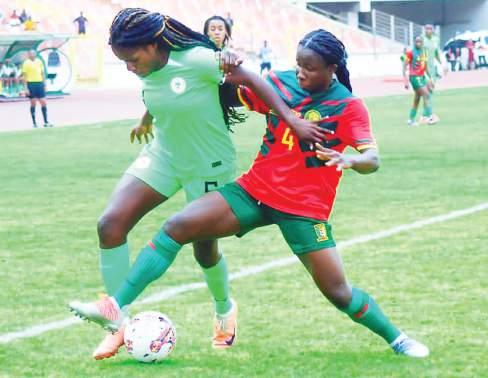
FA Cup: Awoniyi’s Forest to Battle Man Utd, Liverpool Host Aribo’s Southampton Live on GOtv
Nigerian forward, Taiwo Awoniyi, will be looking to fire his Nottingham Forest side to the quarter-finals when they take on Manchester United in the fifth round of the FA Cup today. The match will be broadcast live on GOtv.
Nuno Espirito Santo’s team will be looking to replicate their 2-1 victory over the Red Devils in the league last November when the Red Devils visited the City Ground.
Awoniyi passed a late fitness to feature in the team’s defeat against Aston Villa over the weekend and will be hoping to make the starting lineup today. The game will be live on SuperSport Premier League (ch 66) at 8:45pm.
Speaking ahead of the clash, Nuno expressed his team’s desire to delight their fans with victory over United. “They’re a very good team with a very good squad. We are going to face a tough opponent on Wednesday. The win over United in December is useful for us to look at, knowing that it’s not going to be a repeat. It’s going to be a new one, new things will happen, but we want to go for the game, continue in the FA Cup and give big joy and happiness to our fantastic fans,” he said at the pre-match briefing.
Manchester United are keen to make it to the quarter-finals of the FA Cup for a record 48th time, but they will have to do without a number of key players namely; Rasmus Hojlund, Luke Shaw, Lisandro Martinez, Mason Mount among others.
Also in action, newly crowned Carabao Cup winners, Liverpool will seek to continue their quest for a historic quadruple when they host Southampton at the Anfield Stadium this evening. The Reds have won all five of their last FA Cup clashes against The Saints at
the Anfield Stadium and they will be keen to extend the streak. Nigerian forward, Joe Aribo could be in the lineup for Rusell Martin’s side at 9pm, while the Saints will be without Ryan Fraser for this clash after he picked up an injury last weekend against Millwall.
Akpata's Sportsville Award Receives Global Accolade
The nomination of the President of Nigeria Cricket Federation, Dr Uyi Akpata, as one of the recipients of this year's Sportsville Special Recognition Awards, has continued to draw acclaim from national and international dignitaries.
From the home front, the Minister of Sports Development, Senator John Owan Enoh, said the recognition of Uyi Akpata by Sportsville was a clear pointer of the great work the financial guru is doing with cricket in Nigeria.
"As a Ministry, we sincerely appreciate all you have been doing towards the growth of Cricket in Nigeria.
"We shall continue to support your good works to ensure the continuous
development of the game in the country," the Minister said in his goodwill message. The International Cricket Development Manager in Africa, Patricia Kambarami, also sent his congratulatory message.
"Heartfelt congratulations on receiving the Sportsville Special Recognition Award for your remarkable contributions for the development of Cricket in Nigeria.
"Your dedication and efforts have not only elevated the sport, but have also made strides in fostering its growth across West Africa," Kambarami added.
In the words of cricket guru, Ejiro Omonode, Uyi Akpata has taken the
game of cricket to a new dimension in Nigeria.
"Uyi has transformed the game into a new dimension in the country. His dynamism and foresight have made cricket one of the most emerging and followed sports in Nigeria.
"I am happy that Sportsville is recognising all his efforts at repositioning the game," added the Managing Director of Masters Sports International. Dr Uyi Akpata, a board member of Edo State Sports Commission and Chairman of the State Cricket Association, is top of the dignitaries to be honoured on Friday during the award ceremony holding at the EKO Club, Surulere Lagos.
Nigeria Names Team for Sambo at 13th African Games
The Sambo Association of Nigeria (SAN) has named a four-man team for the 13th African Games taking place in Accra, Ghana from March 8 to 23.
According to the Vice President of SAN, Sheriff Hammed, the contingent is made up of two men and two women and they are Jonah Kajido (79kg), James Chegwam (58kg), Fatima Ogbonyomi (65kg) and Charity Jatau (59kg).
“We carefully selected these athletes to represent us at the African Games based on their knowledge of the sport and Sambo being one of the demonstration sports in Ghana, we want to ensure that we are well represented in the event. “This is the first time that Sambo will be part of the African Games as the sport is gaining ground across the globe and Nigeria should not be an exception. For now, the athletes are
going camping in readiness for the games as we are just going there to add to the number but to make our presence felt in the event,” he said.
Hammed, who is also the Joint Secretary of Africa, International Association of Combative Sports (IACS), said participating in the games would give more people the opportunity to appreciate the uniqueness of the sport, being one of the fast-growing sports in the
world. “We are hoping that taking part in the Games would give us the chance to popularise the sport among Africans and Nigerians. More African countries are not embracing the sport and hopefully, it will be part of the Olympics sports very soon with the way it is growing across the globe,” he added.
Among the countries that will compete in the Sambo event aside
WEDNESDaySportS Group Sports Editor: Duro Ikhazuagbe Email: duro.ikhazuagbe@thisdaylive.com 0811 181 3083 SMS ONLY THISDAY • WEDNESDAY FEBRUARY 28, 2024 47
Goalscorer Esther Okoronkwo (left) in a duel with Cameroon’s Mariane Maague in Abuja ....on Monday

MISSILE
TUC to Federal Government
“Allowing the official exchange rate to devalue alongside the black market rate that does not follow market fundamentals is not the right approach to accomplish this. Local and international financial institutions have determined the true value to be between N580 to N650 to a dollar in June/July 2023. The Federal Government needs to work towards achieving this realistic rate” --TradeUnionCongress(TUC)President,FestusOsifo,urgesthe governmenttojettisonIMF,WorldBank-inducedeconomicmeasures.
OLUSEGUNMIMIKO
g UEST COLUMNIST


Five Monsters Nigeria Must Tame
It bears emphasis that the people of this land are going through very stressful times, accentuated by recent economic reforms packaged as subsidy removal and foreign exchange rates unification. But the truth is that a lot had been wrong for far too long. Reference policy frameworks like the Structural Adjustment Programme (SAP), currency devaluation, premature de-industrialization, deepening poverty, unemployment. These are all by-products of neo-liberalism, and a compliant national leadership that has straddled our public space for so long. It is also trite that our problems date back further than this modern era of neoliberal triumphalism. A proper dimensioning of all of this would therefore touch on issues of our mental state as a people, the structure of the state structure bequeathed us by the colonialists, as well as the agency of leadership.
Four hundred years of slavery, more than a century of colonialism and enduring neo-colonialism have definitely taken their toll, not only on our physical development, but also our mentality and our mind set. As Nathan Nunn, Harvard University Professor of Economics, put it, the evidence accumulated ‘suggests that this historic event (i.e., colonialism) played an important part in the shaping of the continent, in terms of not only economic outcomes, but cultural and social outcomes as well’. Thus, to move forward, we must liberate our minds from ‘mental slavery.’ We must go through what I referred to in my Chairman’s remarks at the Elizade University Convocation lecture in 2022 as a ‘risorgimento of mental dignity and confidence.’
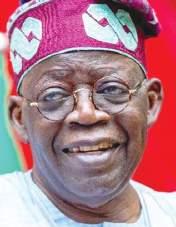
We must reject tokenism in development. We must reject metrics of development delusion. We must seek the cure for irresponsible illegal acquisition by our leaders, and their unbridled elite greed. If we agree that we are not sub-human, we must strive to equal other humans, other races in endeavours
and accomplishments. We must sing a new song for a new generation.
African nations were carved out for the economic exploitation convenience of our colonial overlords. This was a major accomplishment of the Berlin Conference of 1884/1885. The Organisation of African Unity (OAU) at its debut in 1963, in its wisdom, endorsed the sanctity of the colonial boundaries. Anything short of that would have been a harbinger of sustained conflicts among the newly independent entities.
Even so, it is true that the arbitrariness of these physical boundaries is doubtlessly one of the drivers of multiplicity of conflicts in Africa since independence, in the form of perennial unrest, military coups, genocidal conflicts, civil wars, spilling across national boundaries. As Robert Nesta Marley (Bob Marley), the iconic Jamaican reggae singer, guitarist, and songwriter sang, we have come to epitomise a state of:
War in the east!
War in the west!!
War up north!!! War down south!!!!
War, war …!!!!!
Yes, war in the Horn of Africa; war in the Great Lakes region; war in the Sahel. It’s war, war, everywhere!
The ‘Silencing the Guns in Africa’ by 2030 is a flagship initiative of the African Union (AU), as encapsulated in Agenda 2063. It aspires to ending all wars and conflicts, preventing genocide, and stopping gender-based violence. Unfortunately, the
AkpANdEmJAMeS
g UEST COLUMNIST
guns have since been increasingly louder, giving scant hope of respite! For a moment, think of the resources Africa has expended in conflicts; add to it illicit financial flows facilitated by neo-colonial economic arrangements, vampirism, and arrant lack of imagination by our leaders, then you behold the exit passage of our development.
Let’s look at Nigeria’s structure, for specifics. The Yoruba are comfortably spread across national boundaries in the West African sub-region. Ditto for the Fulani, and Hausa, etc. So, in the case of Nigeria, as in most other African nations, we have cobbled together a nation of various ethnic nationalities with different histories, different life values and perspectives. After a brief period, post-independence, Nigeria has been running essentially as a unitary government, with profound implications for diversity (mis)management and economic development. We are by nomenclature a Federal Republic, but to all intents and purposes, a unitary republic. Well, we are, for instance, the only federal republic of this status, with a centralized Police Force; with implications that are now too obvious in the dysfunctionality of our policing charge.
It has been argued by pundits that the Asian Tigers, which have developed in the past five decades or so, each is essentially ethnically homogeneous. South Korea is 90% ethnic Koreans, Taiwan and Hong Kong are 90% ethnic Chinese, and Singapore is 70% Chinese. So, if we cannot create new nation-states out of our country, RESTRUCTURING, with ethnically
Continued on page 45

My Boss, Distinguished Senator Udoma, Is 70
It would be a thing of great surprise for those who have met him physically to imagine that he is already seventy years old. But he is. Distinguished Senator Udoma Udo Udoma was seventy on Monday, February 26, 2024. I had known him for as long as I had known any prominent Nigerian who was not already in the history books read in schools. The only Udoma I knew through the history books was his father, Justice Egbert Udo Udoma who was a Knight of the British Empire (KBE), Justice of the Supreme Court of Nigeria (for 13 years), Chief Justice of Uganda (1963 – 1969), the first Governor General of Uganda and Chairman of Nigeria’s Constituent Assembly (1977-78). In 1944 at Oxford University, his father was one of the first black Africans to earn a PhD in Law.
I met Senator Udoma physically for the first time in Port Harcourt in 1999, when newly elected members of the National Assembly were in Port Harcourt for a retreat. I was excited to see a distinguished Akwa Ibom son on the team and decided to interview him. I was then the Bureau Chief of Punch Newspapers, in Port Harcourt. I again met and interviewed him in Uyo at the Presidential Lodge while waiting to interview the then Minister of Petroleum and Mineral Resources, Chief Don Etiebet.
I eventually became Senator Udoma’s Special Adviser on Media and Communications when he was
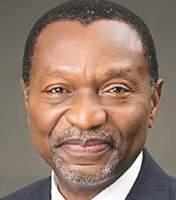
Nigeria’s Minister of Budget and National Planning (2015 – 2019). For the very first time, I worked with someone who carried leadership with the highest level of integrity; a leader who did not only know what
to do at all times but was always in the forefront to lead in the execution of tasks.
As monumentally successful as he is, Senator Udoma carries no air, just integrity. He is soft at heart but unbending on principles. Meticulous almost to a fault, he would rather miss a departing train than jump into it with an unbuttoned shirt. If you are to send anything for his attention and endorsement, you have to first pass it through a crucible to be sure of its ready status. The first Permanent Secretary we met in office, Hajia Fatima Nana Mede, once asked “What manner of man is this? How can you even leave the office when your Minister is still working?” There was no overnight tray in his office – what was meant to be done must be done that day. He can call on his aides at any time of the day if it becomes necessary. He knows the meaning of hard work and works late into the night when necessary.
He was always ready to share his experiences and guide the delivery of any assignment. He was never tired of leading a task. He is a mentor because he brought a different dimension to work ethics in public service; a dimension not very common with political appointees of that calibre.
He is always of the very strong belief that a seemingly impossible task can always be achieved through dedicated, selfless and focused teamwork. That teamwork approach helped in defining the many
successes of the Ministry during his tenure as minister. Reorientation of corporate management issues in an environment with ingrained corporate culture takes some leadership influence to adapt to new strategies. He understood that philosophy very well. That was why he always led the charge, directing by example. It is worthy of note that he started well and ended well. It became very obvious that he was one of the very few Ministers in the first tenure of the Muhammadu Buhari presidency who completed his tenure without any scandal linked to his person or office. He wore many other caps in that administration outside of being the Minister of Budget and National Planning and Vice Chairman of the National Economic Council.
Working with him was a whole new experience, an experience that would last a lifetime. He is a thoroughbred leader and coach. He looks reserved from afar, but very amiable at close range. The issue clearly is, he does not mix business with pleasure. Unfortunately, those who have a different impression of him are those who meet him at work and not at leisure. While in the Ministry, he would not dabble in or take unilateral decisions on money matters concerning any project. Any such transaction should always pass through the Permanent Secretary. He worked directly with only very competent directors
Continued on page 45
TRUTH & REASON Wednesday, February 28, 2024 Price: N400 Printed and Published in Lagos by THISDAY Newspapers Limited. Lagos: 35 Creek Road, Apapa, Lagos. Abuja: Plot 1, Sector Centre B, Jabi Business District, Solomon Lar Way, Jabi North East, Abuja . All Correspondence to POBox 54749, Ikoyi, Lagos. EmAiL: editor@thisdaylive.com, info@thisdaylive.com. TELEPhoNE Lagos: 0802 2924721-2, 08022924485. Abuja: Tel: 08155555292, 08155555929 24/7 ADVERTiSiNG hoT LiNES: 0811 181 3085 0811 181 3086, 0811 181 3087, 0811 181 3088, 0811 181 3089, 0811 181 3090. ENQUiRiES & BooKiNG: adsbooking@thisdaylive.com
Senator Udoma
President Bola Tinubu





















































 Juliana Francis
Juliana Francis

























